2 Volumes
Constitutional Era
American history between the Revolution and the approach of the Civil War, was dominated by the Constitutional Convention in Philadelphia in 1787. Background rumbling was from the French Revolution. The War of 1812 was merely an embarrassment.
Rt. Angle by Years
The history of Philadelphia"s finest men's club.
Right Angle Club 2012
This ends the ninetieth year for the club operating under the name of the Right Angle Club of Philadelphia. Before that, and for an unknown period, it was known as the Philadelphia Chapter of the Exchange Club.
Dear Members of the Right Angle Club,
2012 was a remarkable year at the Right Angle Club. First of all, it was our ninetieth year, the completion of another decade of eating, occasional drinking and some mild misbehavior as we soaked up the knowledge and information imparted to us on an almost weekly basis by the finest lineup of speakers in recent club memory. Recent memory may be about all we can muster at the Right Angle Club, but that does not curtail our pursuit of conviviality and good fellowship.
When I assumed the intimidating duties of President of our club, I announced to our assembled group of officers and board members that my goal for 2012 could be summed up in one three-letter word: fun. Now I realize that this may at first appear to be an appeal to our baser instincts, but I felt that fun was an element somewhat in short supply in recent years, not through anyone?s fault but the direct result of some necessary updating of our way of doing things. Now that we have all agreed to take the necessary leap from the 19th to the 21st century, I believe that the restoration of fun has been achieved.
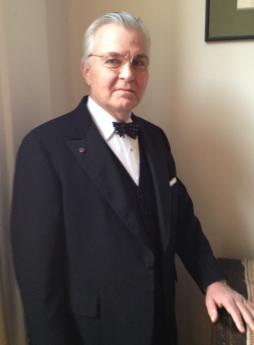
|
| President John Fulton |
There were two major accomplishments in 2012. First, the employment of the QuickBooks accounting system, which included the efforts of our Treasurer, Rod Rothermel along with the Finance Committee chaired by John White. Second, was the uploading of an up-to-date and printable membership directory that can be maintained and updated by the club?s able administrative assistant, Le Anne Lindsay. This effort was spearheaded by Tom Williams.
Several of our affiliate members became full members in 2012. These include Dick Pascal, Ed Ermilio, Steve Bennett, David Barclay, Howard Trauger and John Coates. New members that joined as full members in 2012 include Horace MacVaugh, Harvey Young, Dane Wells, Chad Bardone, Warren West and Olav Urheim. Several long time members have resigned, among them Dick Palmer and Jerry Leon. We wish them well and hope to see them again.
My predecessor John White came up with a way for members who may wish to remember the Right Angle in their will, The Centennial Fund, in recognition of our fast approaching one-hundreth year in 2022. The goal is far more modest than that of an endowment; it is more of a ?rainy day? fund so that we may continue operations smoothly and seamlessly in the event of a future shortfall. John has also employed his Constant Contact software to announce the Club?s special events by email, prepare a list of expected attendees and provide a system for credit card payment. Dan Sossaman was our membership chairman and his efforts in 2012 included our member-guest meet and greet event in April and the membership recruitment aspect of our annual Fall Fling, about which more in a moment. Dan will become our president at the President?s Dinner of 2013 to be held once again at the Philadelphia Club.
Jack Foltz was our events chairman and he organized three exciting affairs in 2012 that were well attended by members and their guests. The first was our annual Spring Fling, which was held on a sunny Sunday afternoon at Bartram?s Gardens. It was my first visit to this beautiful and historic site discreetly tucked away in not-so-scenic southwest Philadelphia. Next came our Fall Fling at the Simeone Foundation Automotive Museum, with its priceless and dazzling collection of race cars from the past 100 years. Finally, our Christmas party was held at the stately Valley Forge Military Academy, a wonderful setting for the event. I can say with confidence that at every one of these events a great time was had by all. The Right Angle Club owes its continuation over the years in large measure to the consistent quality of our speakers program. In 2012 speaker chairman David Richards attained new heights with an outstanding line up of speakers including several members, among them David himself, John Wagner, George Fisher and Peter Alois. When one could bring a guest who is a prospective member to a luncheon where any one of this year?s speakers held forth, it makes membership in The Right Angle Club a very attractive prospect.
Carter Broach will step into the breach as next year?s speaker chairman, as David moves on to become next year?s events chairman. Carter oversaw our raffle at each luncheon in 2012, and once again, our designated charity to receive raffle proceeds is the Children?s Scholarship Fund Philadelphia. A minor disruption in the weekly venue for Right Angle Club luncheons occurred mid-year when the Vesper Club vacated its building on Sydenham Street and moved into the Grille downstairs at the Racquet Club, where we have held our luncheons since 1991. Our club continues to meet at the Racquet Club, and now does so in the Main Dining Room on the first floor. We plan to stay at the Racquet Club, and some of our luncheons may be on the second floor Bell Room.
Well, I don?t know about you, dear member, but looking back on 2012, I can say without reservation that I have had a lot of fun at the Right Angle Club. I sincerely hope that you have enjoyed it as well. I encourage those among you who wish to pursue a leadership role at the club to signal your intent to do so to one of our officers. I can assure you that the effort is very rewarding.
Boalsburg

|
| Boalsburg |
FIVE miles East of State College is Boalsburg, which is by far the most interesting place in Central Pennsylvania. First of all, the town itself is laid out around the most perfect surviving example of a Scotch-Irish diamond. The Scots in Northern Ireland were much resented by their Roman Catholic neighbors to the south of them, and gladly accepted James Logan's offer to come to William Penn's haven of religious freedom, in return for their settling near the Indians. This was Logan's solution to the problem of keeping the peace between the pacifist Quakers in Philadelphia, and the sensitivities of the Indians about settlers on their ancient lands. The Quakers wanted to avoid conflict with the Indians, wouldn't sell them either liquor or gunpowder, while Logan was under orders from Penn's descendants to sell the land. So, being Scotch-Irish himself, he felt confident his relatives would find ways of coping with the problem. Much of the turmoil of Pontiac's War and the French and Indian Wars, the marauding Paxtang Boys and King George's War, grew out of the resulting conflicts between the two notoriously combative groups. In any event, this decision explains why Scotch-Irish settled the frontier early, and surprisingly far west of the centers of Pennsylvania Dutch settlement. The Scotch Irish had a tradition of favoring the crossroads of two main highways. Their habit was to cut off the four corners of an intersection, leaving a diamond-shaped park in the middle. Traditionally, the enlarged intersection would have a flagpole in the middle.

|
| Boalsburg Diamond |
Naturally, the diamond was a good place to put a post office, a general store, or a tavern. A man named Boal put up an early tavern, and this diamond became Boalsburg. Boal is the name of a type of Madeira wine, which may have some relevance here, having to do with old stories of some Portuguese debts which were paid off in the land of Center County. In any event, there is a log cabin near the diamond, with a dozen Boal tombstones in front of it. Quite a large and elegant restaurant is now more directly on the square. This town is a photographer's dream and well worth anyone's drive around the main streets.
At some time, the Boal family moved out of the center of town to a mansion about half a mile away. From the looks of it, five or six additions were made to house family and servants, and it almost looks like five houses joined together. The carriage house has a couple of ancient carriages, one with and one without, leaf springs. The walls are hung with dozens of sabers and swords from many different wars, each with its story. There are muskets and rifles, dating back to the Revolutionary War.
The main house is modest for a mansion but immoderate for a farmhouse. It has definitely been lived in, and it's built for comfort. The walls are covered with trophies and mementos, with five signatures of US Presidents identifiable. Lots of Boals seem to have married lots of European nobility, perhaps in one of these rooms. One old rake is quoted as saying he inherited three fortunes -- and spent 'em all. Over and over again the theme emerges: the Boals was a military family, often raising their own regiments. Across the road in what seems sure to have once been Boal property, is the Military Museum, with real battleship cannons at the gate. Memorial Day was started here after the Civil War, and it is the headquarters of the local National Guard Division; it's by far the most popular tourist attraction in town.

|
| The Columbus Family Chapel |
But off in one corner of the side yard of the mansion is a little stone house, perhaps two stories high. It is a replica of the Columbus family chapel in Spain, copied stone for stone. The stories vary somewhat between guides, but apparently, two or more relatives were descended from Christopher Columbus, and while one Boal was Ambassador to Bolivia, he married a lady in waiting to the Queen who was also descended. Possibly the Spanish Civil War had something to do with it, but in any event, the personal belongings of the Columbus family were judged to be the property of the Boals, so they were moved here to the chapel replica. A decade or so ago, the chapel was broken into by thieves, and since that time security is considerably enhanced. Two pieces of wood are still shown as pieces of the True Cross of Jesus, with authentication going back to the 5th Century, and numerous handwritten journals are there. The Goya paintings and tapestries, and a solid gold crucifix are among the pieces which are now somewhere else. The matter is one of considerable embarrassment. Most of the many pieces which remain, are seeming of the nature of things which would be enormously valuable if you knew what they were, but just about worthless if you don't. In a sense, the best protection is the ignorance which surrounds them. The guide last month remembers one day when 27 visitors came to the Mansion and many days when no one came. As he spoke, you could see at least five hundred cars parked in the Military Museum across the road. There may have been five cars parked in the diamond in the center of Boalsburg. It's sort of a shame that this would be true, just as it makes you grit your teeth to imagine the indifference the whole place would receive if you moved it to Times Square. But, let's face it, the main protection for these invaluable pieces of history lies in that general lack of interest in them.
Ginseng Trading
DECLARATION of a state of war between Great Britain and its colonies almost immediately set loose some thinking about how to divert some of the profits and commercial arrangements of the British Empire to other owners. In particular, the American merchants began to consider how to capture colonial trade with China, or at least look into what useful gossip they could pick up in the many dealings with sea captains in port, or traders in their counting houses. The waterfront has always been a tough place, and in the seaside taverns, it can be particularly difficult to get trustworthy information or form dependable commercial alliances. So it is not entirely surprising if the captains and agents of Robert Morris found themselves in the company of many seafarers who later proved to be little short of pirates. England was conducting a lucrative trade with China, and the American colonies supplied much of the commodities. The Treaty of Paris suddenly transformed smuggling and near-piracy into open season for international trade, with much room for sharp practice.
On February 22, 1784, the Empress of China, a brand-new copper bottomed vessel built in Boston for a dubious trader named Daniel Parker, set sail from Manhattan for Canton. John Cleve Green was the captain, and ownership was a confused tangle of William Duer, John Holker, and a firm of Turnbull, Marmie, and Company which was essentially a disguised agency of Robert Morris, with Morris the dominant owner. The ship had a cargo of two commodities: 250 casks of ginseng, and twenty thousand dollars in silver. The ship would return from China a year later, bearing tea, silks, and porcelain. The world was in a post-war depression, and the numerous part owners of the venture were barely speaking to each other. But five years later it was recorded that 19 American vessels were tied up in the port of Canton. Just whose idea it was, and who gets the main credit for making it a success can be endlessly disputed, both inside and outside the courtroom. But this was in broadest outline, how the China trade began.
The rest of the story is mainly a botanical one.
Children Playing With Matches

|
| Playing with Matches |
THERE are still a lot of people secretly re-fighting the Vietnam War, which in retrospect was rebellion against the draft and allegiance to the idea that America just doesn't start wars. But times change, and those who now suppose the secret sympathizers with the anti-draft movement will automatically join a second call to rebellious duty, are probably going to be disappointed with how conservative the baby boomers have become. The boomers find themselves parents, defending their own authority from attack by their children. As King Lear ruefully observed in the same reversed situation, let them feel how sharper than a serpent's tooth it is, to have a thankless child. We now define our present world problem as overleveraging, not compulsory military service, and estimate it may take as long as fifteen years to sort itself out -- until yet another judgmental generation comes over the hill behind the rebels. The aggregate debts of the European Union, using present-value calculations, are said to be three times as large as the Gross Domestic Product of Germany; now, that's really a problem. When you consider the only sure cure for excessive leverage is "growth", and that the code word of growth really means stuff wearing out, getting used up, and getting obsolete, it is not hard to see it taking 15 years to go away -- much more lasting than any draft dodger issue. When I go to restaurants they are crowded and expensive; people are living on their reserves, but there seem to be lots of reserves so this problem will last a long time.
But, four generations back, I can remember 1937 when there were no reserves, and plenty of homeless people actually froze to death. Plenty of people were then talking Communist who nowadays are talking McCarthyism, hoping no one notices the switch. I used to ride up and down the elevator of a hospital with Harry Gold, the thermonuclear spy no less. So what worries me about the present uproar is that it comes too soon, before very many people get really scared enough to do really stupid things, then recognize their folly.
I think it was Abbie Hoffman, not Jerry Rubin, who climbed up into the visitors' gallery of the New York Stock Exchange and threw handsful of dollar bills, salted with just a few hundred-dollar bills to bring trading to a halt. Big joke; just see who was scrambling on the floor. That's what the sixties seemed like to most of us; a big joke. But out at Kent State, some kids with crew cuts were information, under orders that at the last moment the gun barrels must come level -- and the live rounds slide home.
Tammany: Philadelphia's Gift to New York
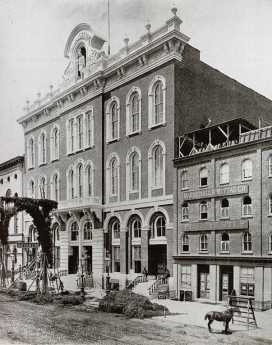
|
| Tammany Hall |
EDWARD Hicks painted a scene over and over, depicting William Penn signing a treaty of peace with the Lenape Indians at Shackamaxon ( a little Delaware waterfront park at Beach Street and E. Columbia Ave.). This scene was apparently a reference to a larger and more finished depiction by Benjamin West. The Indian chief in the painting is Tamarind, chief of the Delaware tribe. Long before Hicks got the idea for the picture from Benjamin West, Tamarind was locally famous for having the annual celebrations of the Sons of St. Tammany named after him. These outings centered on the joys of local firewater and thus may have had something to do with the evolutions of the Mummers Parade. George Washington presided over a lively Tammany party at Valley Forge, and local Tammany Hall clubs sprang up all over the country. The most famous offshoot had its headquarters on 14th Street in New York, as a club within the local Democrat party asserting Irish dominance over New York politics, allegedly using Catholic Church connections to control other immigrant groups. The identity of Tammerend seems to have got thoroughly mixed up along the way; the famous statue of "Tecumseh" at the Naval Academy in Annapolis, much revered by the cadets, is actually a depiction of Tammany.
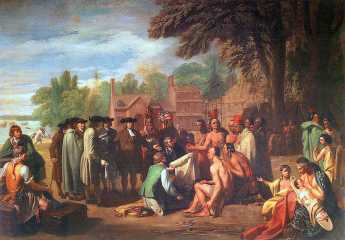
|
| Penn's Treaty With the Indians By Benjamin West |
At earlier times, Tammany was the vehicle Aaron Burr used to assert control of the now-Democrat Party, particularly in the contested Presidential election of 1804. Shooting Alexander Hamilton in a duel, along with disgrace and impeachment as Vice President necessitated Burr's rapid conversion into a non-person, both in New York and in Philadelphia. In Philadelphia, the uproar led to the dispersion of Tammany influence, while in New York other bosses, particularly Boss Tweed, took over the organization and consolidated its role as a small club which dominated a larger political party, which in turn pretty well took over the government of New York City, which in turn dominated the governance of New York State, and even occasionally leveraged itself into national politics. Eventually, Tammany fragmented sufficiently that Mayor Fiorello La Guardia was able to dislodge it from control, which in time led to its dissolution. In a larger sense, however, the decline of New York's Tammany Hall began when in the late 19th Century it adopted the Philadelphia system of consolidating graft from local leaders into unified "donations" from local utilities. That greatly improved the efficiency of collections and disbursements but undermined the need for an effective local organization of ward leaders.
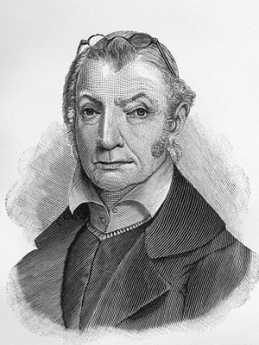
|
| Aaron Burr |
So, although Tammany was originally a Philadelphia creation perfected by New York, it continued to have connections to Aaron Burr in early days, and Philadelphia machine politics later on. But of course for seventy-five years, around here it seemed Republican.
Bonds--Do They Have A Future?

|
| Relic of the Past? |
EVER since we finally went off the gold standard completely during the Nixon Administration, the Federal Reserve has adjusted our money supply to create a fairly steady 2% inflation. If inflation is ever less than 2%, the Fed puts more money into circulation. Since many bonds are paying less than a 2% dividend, everybody who buys and holds them at par will lose money in "real" terms. That is, everyone who buys bonds when they are issued and sells them when they mature will lose spending power. Since they fluctuate in the meantime, it is possible for a trader to buy them when they are undervalued by the market. That trader will possibly make money, but only because someone else lost money. Something like that occurred during the recent financial crash bailout, when interest rates declined from 3% to less than 2% but were repurchased by the Fed as "Quantitative Easing", effectively giving speculators a 33% profit at government expense. But that doesn't happen often, and just guess who ultimately lost the money the speculators made. There is also that daunting question: when the time comes for the Federal Reserve to disgorge them, just who is going to buy all these cheapened bonds? In Japan, bonds paid a dividend of less than the rate of inflation for more than a decade; it's hard to think of a reason why the same thing could not happen in America. So it's also hard to imagine a reason why buy-and-hold investors should not abandon bonds, perhaps suddenly all at once, at some unknown time in the future. At that point, many of them will resolve never to try that, again. The whole idea is troubling.
It's particularly troubling in view of the lack of success, so far, of TIPS. These vehicles are new; perhaps the algorithm is set to ignore minor inflation and will over-respond to more major inflation, ultimately rewarding those who buy them. But at least so far, they are a disappointment. Furthermore, TIPS are quite cleverly designed to be inflation-protected, while unfortunately inflation usually does not follow a straight line but is volatile, or saw-toothed; the jury is still out. The jury better hurry up, because all investors look for net income after expenses, which include brokerage costs, taxes, and inflation. A long-term bond might have to pay a dividend approaching 4%, just to emerge with the same net value it started with; after five years of 4%, you could be 20% behind. And yet, the bond market with or without inflation protection is far larger than the stock market and compares in size with all other kinds of market. Who buys them, especially in these huge quantities?
Somebody must maintain statistics which answer this question, but as a guess, the main buyers are insurance companies, endowments, annuities, hedge funds, banks. And foreigners, of course, to whom our follies seem trivial compared with their own. The great argument for bonds is the safety of principal, and although safety is in question anywhere there is inflation when the topic is cash flow, safety is definitely an issue. Cash shortages are what cause bankruptcies, which are mainly useful in providing time to liquidate underlying wealth to pay restless creditors. The management of a non-profit organization must meet its payroll out of cash flow, so non-profits protect themselves from dissolution by having a regular flow of nominally secure bond dividends. Income from donations and contributions can be particularly weak during times of economic stress. Since most for-profit organizations also experience variable periods of time without profits, their situation does not differ greatly from nonprofits. That's particularly true when a for-profit organization has a vocal, activist stockholder group, who will protest fiercely if the management retains abundant cash. For such a predicament, holding bonds creates safety by some definition. The price of that safety is the long-term average loss on the bond portfolio; the company's alternative losses are whatever it takes to maintain a stable work force during unstable times. The business school assessment of this tradeoff is that bond losses can usually be passed through to the customers as a business cost, while layoffs and strikes may not be.
To restate the characteristics of willing bond purchasers, they are governments and corporations who have no common stock issuance alternatives, but regularly face a need to have money available for payroll. They also include borrowers and lenders at nominal interest rates like banks and insurance companies, who can afford to ignore inflation because their own liabilities are in nominal dollars, or come due at a date certain. And then, there are a host of beneficiaries of special-interest bond provisions, like "Flower bonds", state and municipal governments, foreign aid, student aid, etc. As an overall statement, natural bond buyers are those who either do not possess steady equity (common stock) alternative to offer investors or else are shielded in some way from the inflation and tax costs of buying bonds. Speculators and traders are excluded from the discussion because fixed-income trading is a zero-sum game, something you should teach your children to avoid. Other than these special niche opportunities, bonds should be regarded by the ordinary investor as trading opportunities when interest rates get too high, which is roughly every fifteen years or so.
Things in the bond market were not always so bad; Robert Morris, Jr. was a genius for devising this market in 1784. But the equity market was then not so well developed, life expectancies were shorter, and a minimum 2% inflation was not guaranteed by the Federal Reserve. The income tax had not been invented. It was possible to enjoy the promised benefits of lending in those days, for decades or even lifetimes. It was much harder to find investments of superior performance, without getting involved in business management. Meanwhile, the bond market just got huger and huger. Modifying or dismantling it in logical ways would have enormous disruptive effects. So enormous, the Congress has just adopted the stance called "kicking the can down the road", which is a debt you never seriously intend to repay.
Are we waiting for the bond market, the bond vigilantes, or speculators to find some vital vulnerable flaw, and topple it all into the ashcan of history? Or is there some better plan that no one has mentioned?
Relocation

|
| Moving Truck |
For many decades, at least since the Second World War, the Northeastern part of the country has been losing population. And business, and wealth. In recent years, New Jersey has been the state with the greatest net loss, and the Governor who is making the greatest fuss about it. Statisticians have raised this observation to the level of proven fact, although lots of people are even moving into New Jersey at the same time. This is a net figure, and it remains debatable what sort of person you would want to gain, hate to lose; so it's hard for politicians to be certain whether New Jersey's demographic shifts are currently a good thing or a bad thing.
Take the prison population, for example. Most people in New Jersey would think it was a good thing if the felons all moved to some other state because it would imply less crime and law enforcement costs. But one of the major recent causes of a decline in violent crime seems to be the universal presence of a portable telephone in everyone's pocket. Just let someone yell, "Stick 'em up!" loud enough, and thirty cell phones are apt to emerge, all dialing 911. On the other hand, cell phones are the universal communication vehicle for sales of illicit drugs and other illegal recreations, and the increase in automobile accidents is a serious business for inattentive drivers. Add to this confusion the data that capital punishment is more expensive for the State than incarceration is, and you start to see the near futility of knowing what is best to have more, or less, of.
What the Governor and his Department of Treasury mostly want to know is whether certain taxes end up producing a good net revenue for the State. That is, whether more revenue is produced by raising certain taxes more than others, or whether some taxes are a big component of the Laffer Curve, causing revenue to be lost by driving business, or business owners, out of state, in spite of the immediate revenue gain. The studies which have been done are fairly conclusive that executives tend to be most outraged by property taxes, since they have a hidden effect on the sale price of the house, and the amount of money available for school improvements. At least at present levels, a Governor is better off taking abuse for raising income or sales taxes, even though the apparent tax revenue might be the same as a rise in property taxes. Since property taxes are mostly set by a local municipal government, while sales and income taxes are usually set by state governments, a decision to raise one sort of tax or another can have unexpected consequences, or require obscure manipulations to accomplish.
Some politicians who believe their voting strength does not lie in the middle class, would normally want to hold up property values, not taxes because the data show that higher home prices drive away from the middle class and in certain circumstances are positively attractive to wealthy ones. Higher prices appeal to home sellers, at least up to a point. Wealthier people who are buying houses are likely to have an old one to sell; that's less true of first-time home buyers or people presently renting. Certain issues can even be reduced to rough formulas: a 1% increase in income tax would cause a 1% loss of population, but a 5% loss of people earning more than $125,000. A $10,000 increase in average home prices, on the other hand, causes a net loss of population, but mostly those with lower income. One important feature of tinkering with average home prices and property taxes is that these effects are "durable" -- they do not fade away over time.
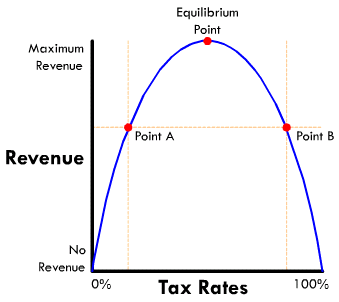
|
| Laffer Curve |
New Jersey is financially a bad state to die in, but the decision to move to Delaware, Florida or Texas is often made over a long period of years in advance of actually doing it. It has been hard to compile statistics relating changes in inheritance tax law to net migration of retirees and to present such dry data in an effective manner to counteract the grumblings that rich people are undeserving of tax relief, or dead people are unable to complain. But rich old folks are very likely to own or control businesses, and if you drive them out of state, you may drive away a considerably larger amount of taxation relating to the business in other ways. This is the underlying complaint of Unions about Jobs, Jobs, Jobs; but state revenue also relates to sales taxes of the business, business taxes, employee taxes, real estate taxes on the business property, etc, etc. Sometimes these effects are more noticeable in the region they affect; the huge population growth of the Lehigh Valley in recent years is mainly composed of former New Jersey suburbanites, who formerly earned their income in New York. The taxes of three different states interact, in places like that.
The audience of a group I recently attended contained a great many people who make a living trying to persuade businesses to move into one of the three Quaker states of the Delaware Valley. The side-bar badinage of these people tended to agree that many of the decisions to relocate a business are based on seemingly capricious thinking. The decision to consider relocation to the Delaware Valley is often prompted by such things as the wife of an executive having gone to school on the Main Line. Following that, the professional persuaders move in with data about tax rates, average home prices, and the ranking of local school quality by analysts. Having compiled a short list of places to consider by this process, it all seemingly comes back to the same capriciousness. The wife of the C.E.O. had a roommate at college who still lives in the area. And she says the Philadelphia Flower Show is the best there is. So, fourteen thousand employees soon get a letter, telling them we are going to move.
And, the poor Governor is left out of the real decision-making entirely, except to the degree he recognizes that home property taxes have the largest provable effect on personal relocation. And lowering the corporate income tax has the biggest demonstrable effect on moving businesses. But the largest un-provable effect is dependent on the comparative level of the state's inheritance tax.
Weather Man
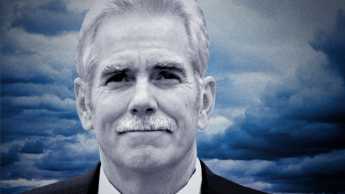
|
| Paul Walsh |
PAUL Walsh, our local weatherman, recently addressed the GIC (Global Interdependence Center) at the Federal Reserve, and presumably because everyone talks about the weather, the meeting was well attended. While he is too experienced to get drawn into a global warming controversy, we get the general outline of his views. What we call the weather is largely a result of various clouds and wind currents blowing around the planet in response to the rotation of the planetary mixture of oceans and land masses. The familiar landscape visible to astronauts makes it easy to accept this view of things.
The global warming issue, however you explain it and where ever it may be going, is a weather cycle to be measured in centuries. Shorter cycles of about eight years in duration tend to result in American weather patterns sometimes blowing Canadian cold air toward the East Coast, and sometimes blowing California winter weather Eastward. In 2011-12 we seem to be experiencing a California winter, while the preceding two winters were unusually cold, reflecting Canadian conditions. What may or may not be happening with the hundred-year global warming cycle is not easily slipped into our daily conversations. It is probably quite irrelevant to global trends whether or not last year was a cold one, or whether our sidewalks are unusually slippery this morning.
Inquiries about the weather are the number one topic to be clicked on the Internet, reaching 17% of queries. That's nearly double the second largest category and four times the number of inquiries about the stock market. Ordinary variations of the weather have been calculated to have an economic value of $384 billion, or 3.4% of the Gross Domestic Product (GDP). Insurance claims for more severe weather abnormalities run between ten and fifty billion dollars a year. The number of hurricanes and similar disasters is highly variable, sometimes running as high as fifty in a bad year.
Predictions are improving, but ridicule of weatherman errors is still highly embarrassing to the professionals in the business. A generation ago, it was almost impossible to get a one-minute warning of an approaching tornado, but nowadays we average fourteen minutes warning for them. That's almost long enough to be useful. Hurricanes seem to be increasing in frequency, but decreasing in average intensity. But insurance claims are getting steadily higher, largely because more people are building more structures in harm's way.
Small wonder that weathermen are a cautious lot about predictions. The present party line, in case you wanted to ask, is that predictions more than ten years in advance -- are just about impossible.
Poor Richard's Wealth
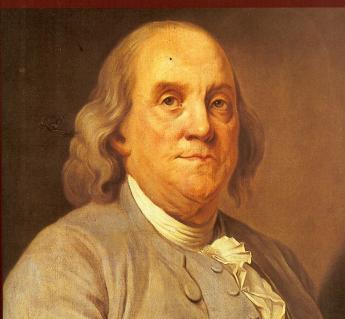
|
| Benjamin Franklin |
I RISE to offer yet another toast to Benjamin Franklin. Like our two leading candidates for the Presidency of the United States, he leaves us uncertain whether he was a rich man pretending to be poor, or a poor man pretending to be rich. To clarify this mystery, I have mainly examined the circumstances of his retirement, and the contents of his last will and testament.
Although he reports that on arrival in Philadelphia at the age of seventeen, he spent his last pennies on a loaf of bread, he was able to retire from the printing business at the age of forty-two, planning to spend the rest of his life as a gentleman at ease. He was able to do so because he had assembled over fifty partners in the printing trade, scattered from Boston to Georgia; today, we would say he had sold franchises to his business. When he came to retire, he arranged to be paid off in eighteen installments, which ought to have lasted him to the age of sixty. That was well past the usual life expectancy at the time, but we can now see it would apparently have run out while he was still in London, acting as our ambassador to Parliament, leaving him without support for the last twenty-four years of his life. Apparently, this was the reason for his seeking postmasterships and acting in some overseas business capacity for Robert Morris, then one of the richest merchants in America.
Assuming he may have run out of money when he was sixty, we look to his final estate to see how he made out in his second career, whatever it was. His assets were in three general categories: land, bonds, and hard money. He bequeathed eleven houses, mostly in Philadelphia, to various relatives. He assigned the ownership in thousands of acres of land in Nova Scotia, Georgia, and Ohio. Just what a bond was in Eighteenth-century America is not exactly clear, but bonds of at least ten thousand pounds sterling were distributed, as well as ten thousand pounds of hard assets. And he forgave a large and undefined number of unpaid debts.
He gave George Washington his gold-handled cane, which had been given to him by Duchess Du Pont, for unknown reasons. His modesty was famous but can be questioned when he gave one of his portraits to be hung in the Council Room of the government of Pennsylvania. He gave his sister a portrait of a French King, with four hundred and eight diamonds set in its frame. He instructed her not to make the diamonds into jewelry because that would be ostentatious. And he instructed that his funeral be plain and simple, although it turned out to be one of the most elaborate parades and ceremonies of the age.
After a few months, Franklin reconsidered his will and wrote a famous codicil. Revoking the gifts to his grandchildren, he ordered that a thousand pounds be set aside for each of the cities of Boston and Philadelphia. His proposal was that this money is loaned to graduating apprentices in order to help them start their businesses, and after a hundred years he envisioned it would amount to hundreds of thousands of pounds; after two hundred years, it would be worth millions and could be used for public improvements. These funds were indeed established and the loaning did begin. Unfortunately after hardly fifty years had elapsed, so many apprentices had failed to repay their loans the experiment was discontinued. What had seemingly been lacking was sufficient will of the trustees to collect the loans with vigor.
Poor Richard may have been born poor at more than one time. But he certainly didn't stay poor, very long. A toast to Ben Franklin, on his birthday, in his club.
Ben's Little Legacy
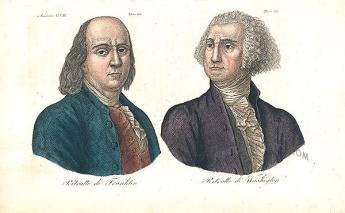
|
| Benjamin Franklin and George Washington |
ONE of the many compromises of the Constitutional Convention was to allow equal-sized blocs of people to choose their Representatives, but the State Legislatures of any size to appoint two Senators, in a bicameral Congress requiring affirmative votes from both bodies, for action. This was the first step in a separation of powers. After separation came apportionment: every state still got two Senators, but varying numbers of Representative districts would reflect population changes. The effect of this second step was to confer greater Senate power to small states because otherwise, a few states with large populations would probably always dominate the voting. (Shorthand for Constitutional scholars: favoring the House of Representatives means favoring big states.) When Franklin proposed a bargain to give the South time to solve its slavery problem, he needed to maintain balance. The small states were truculent about losing Senate power, so he had to give something else to the big states. The three big states of Massachusetts, Pennsylvania, and Virginia were very mindful that England had primarily targeted Boston, Philadelphia, and Yorktown for attack during the Revolution. Big states are paradoxically more anxious to unify with allies, to gain military strength, because enemy commanders seem to favor them as military objectives. Franklin's proposal was to allow the big states to control tax legislation, through the device of mandating that tax laws must originate in the House of Representatives. He may have known that eight states already had similar laws, but may not have realized such laws were regularly flouted. It's hard to be sure what Franklin knew because although he had once been Speaker of the Pennsylvania House, it was during a time it was a unicameral Legislature.
 ARTICLE 1, Section 7. All bills for raising revenue shall originate in the House of Representatives, but the Senate may propose or concur with amendments as on other Bills. 
|
| Washington's Gift to Franklin |
Experienced politicians in the Convention snorted with disgust. There were a dozen ways to get around such a provision, and nowadays the traditional one is for the Senate to attach a tax amendment to some bill which had originated in the House. Any House bill will suffice, and thus we have Senate-originated Medicare Amendments attached to House-originated bills whose first page purports to be legislation about highway construction. Medicare, don't you see, is an amendment to Social Security, which itself began as tax legislation. Any politician of standing could see his way through that. And even in 1787, the delegates could immediately think of ways to circumvent this little trick. When Chairman Rutledge of South Carolina returned his report from the Committee on Detail, it included Franklin's gift to the big states. His fellow delegate from South Carolina Charles Pinckney immediately proposed a friendly motion to delete the rule. Edmund Randolph of Virginia however, felt the big states "should at least get what they had been promised", thereby upsetting others who felt Randolph was being indelicate. So George Washington stepped out of the shadows and supported Randolph, his long-term neighbor, and friend in the Virginia caucus. The matter was then referred to the Committee on Postponed Parts. After a decent interval, it was reported out of the second committee and adopted. After all, with Washington and Franklin as supporters, it would be embarrassing not to pass an inconsequential motion.
Two Friends Create the Articles of Confederation
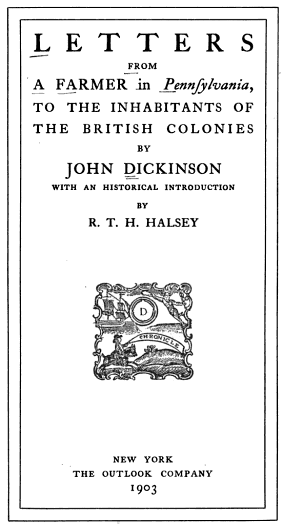
|
JOHN Dickinson had been highly critical of England's treatment of its colonies. As early as 1768 he had written a book called Letters of a Pennsylvania Farmer which is credited with strongly influencing the colonies in the direction of resistance to the British Ministry. When it came time to write the Articles of Confederation, Dickinson was the lawyer selected for the task. His good friend Robert Morris had been less outspoken in opposition to the Ministry's behavior, quite possibly because he was adept at finding workarounds for his own personal business problems. But possibly he was merely maintaining an ambiguous negotiating posture, since in a hotly contested election with this as the main issue, Morris was elected by both sides in the argument. When July 4, 1776, forced the issue both Dickinson and Morris had refused to sign the Declaration, but within a few months both of them were actively fighting for the Rebellion. The truest test of their evolving attitudes might have emerged when Lord North sent the Earl of Carlisle as an emissary after Burgoyne's defeat at Saratoga, offering peace with a sort of commonwealth status for the colonies. Not much is written about this curious episode, leaving it unclear whether the British were serious, and even if they were, whether the Americans understood the offer as serious. On the surface, the British offer conceded taxation with representation as the rebellion had been demanding. But it was rejected by Gouverneur Morris acting for -- who remains unclear. It seems possible the British were exploring the true feelings of people like Dickinson and Robert Morris but were disappointed. The earlier treatment of Ireland after it had agreed to a similar half-hearted autonomy did leave British sincerity in legitimate doubt.
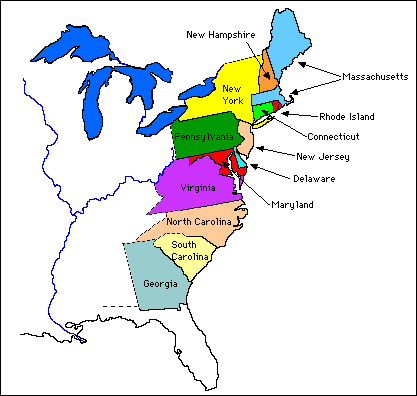
|
| Thirteen |
The thirteen colonies had united to fight the British King, but many of them were reluctant to unite for any other time or purpose. Rhode Island was perhaps the extreme example of this view of what Independence was supposed to mean, but the feeling existed to some degree in many colonies. Concern for the power of this feeling of tentativeness may have contributed an important reason the Articles placed heavy emphasis on declaring the document to represent a perpetual arrangement. Recognition of the weakness of this intent may have been an important reason why George Washington was later willing to sweep the issue aside, even though he of all people was most concerned to avoid the appearance of acting as an arbitrary king. For these and other reasons mainly revolving around state boundary disputes, the Articles remained unratified for years. Finally, in 1781 Robert Morris became convinced that failure to ratify was encouraging the states not to cooperate, and successfully pushed ratification through its steps. At that time, Morris was effectively running the country, even providing his own credit and funds to do it. People were reluctant to oppose his wishes, but they were also unwilling to provide the taxes, supplies, and troops that Morris imagined were being blocked by failure to ratify. Ratification of the Articles accomplished very little except to convince Morris: the Articles were flawed and must be replaced with something conferring more central power.
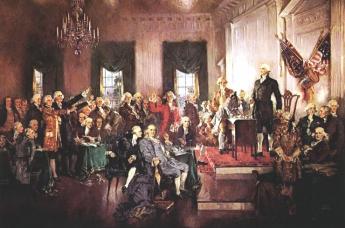
|
| The Goal: 1787 |
Little is known about the evolution of Constitutional thought in Morris' mind between 1781 and the Constitutional Convention in 1787, although a great deal is known about his other numerous activities. It is clear, however, that his experience with the recalcitrant Pennsylvania Legislature had been dismal, while he came to see the one insurmountable flaw in the current Federal government was its inability to levy taxes and consequently, to service national debt. The states were able to levy taxes under the Articles but erratic in doing so, resorting to paper money inflation at the first sign of tax resistance. In Morris' view, the key to the effective government was to reverse the situation; let the national government tax, let the states spend. The key to such rearrangement would be to permit the national government to spend on a very limited list of vital purposes, but bedazzle the states with a substantially unlimited shopping list if they thought they could afford it. As the accounts to pay for the Revolutionary War totaled up, it was apparent that the National Government had twice as much debt as the states. Therefore it would at most, need twice the state taxing power to service such a debt; presumably, wars would be infrequent and it would be less than that. Pay this one off, and potentially the need for future federal spending would be small. Indeed, under the presidency of James Monroe, the national debt was completely paid off, although briefly. It was almost as if Robert Morris and his pupil Alexander Hamilton had a crystal ball.
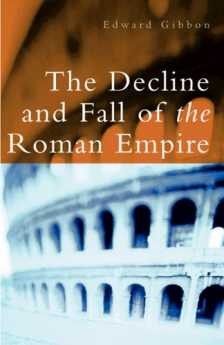
|
| Decline and Fall, Anyone? |
Robert Morris was brilliant and had six years to fashion his strategy, but he also had some help. For one thing, George Washington lived next door much of that time. By then, almost no one dared confront Washington. Adam Smith had written his book The Wealth of Nations in 1776, and Morris gave this extraordinary work as presents to his friends. Morris had corresponded with Necker, the genius financier of France, and through his good friend Benjamin Franklin, gathered insights from the rather advanced British national finance. And James Madison brought in scholarship about politics and statecraft accumulated by Witherspoon, Hume and the Scottish enlightenment. The year 1776 was a remarkable moment for new ideas. In that year, Edward Gibbon also published the first volume of The History of the Decline and Fall of the Roman Empire. The warning behind that important book had an important impact on the minds of important thinkers of the era, too.
Once you grasped all the central ideas, in this environment the resulting strategy almost worked itself out.
Penman of the Constitution
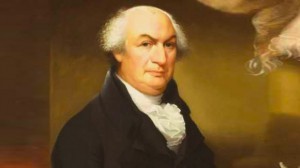
|
| Gouverneur Morris |
THE Constitution is the product of many minds, its ideas have many sources. But final phrasing of the unified document can largely be traced to a lawyer, Gouverneur Morris. The Constitutional Convention would announce a topic, argue for days about different resolutions of it, and then vote on or amend a composite resolution ( unless the matter was deferred to another day of earnest wrangling.) After months of deliberation, that jumble of resolutions made quite a pile. The Convention then turned it all over to Gouverneur Morris for smooth editing and uniformity. Although Morris had arrived a month late for the Convention, he still had time to rise and speak his views more than any other delegate, 173 times. But comparatively few of his ideas identifiably survived the voting; by Convention's end, the delegates were most likely listening for elegance and poise, increasingly expecting the final edit to be his. He finished the task in four days, and the full convention only changed a few words before accepting it. This assembly needed a lawyer who would sincerely follow the intent of his client, rather than yield to the slightest temptation to warp it with his own views. The convention had heard his opinion about almost everything, were thus alerted to uninvited slants. He gave them what they asked for, wording it for persuading the nation, as he himself had been persuaded by what the delegates wanted. The remarkable degree to which he had faithfully served his client's wishes, rather than his own, only emerged twenty years later. During the War of 1812, he disavowed the Constitution he had written.
 We the People of the United States, in Order to form a more perfect Union, establish Justice, insure domestic Tranquility, provide for the common defence, promote the general Welfare, and secure the Blessings of Liberty to ourselves and our Posterity, do ordain and establish this Constitution for the United States of America. 
|
| Preamble to the Constitution |
Morris mostly shortened what the delegates had said. A word here, a phrase there, sometimes whole sentences were removed. After that, rearrangement, and substitution of more precise verbs. This lion of the drawing room, this duelist of the salon, undoubtedly had an enjoyable time twitting his less accomplished clients with brisk capsules of what, of course, they had meant to say. To remember that he was outshining Benjamin Franklin and most of the other recognized wits of the continent, is to savor the fun of it all. Of all people in the Enlightenment, Franklin was certainly Gouverneur's equal in sparkling exchanges of debate. Here, he did not even try.

|
| John Peter Zenger |
Where did this apparition come from? He was almost but not quite a lord of the manor, referring to his extensive riverfront estate in the Bronx called Morrisania, which dated back seven generations in America and ultimately belonged to him, but the title went to his half-brother. He was unquestionably a member of that small society which settled America before the English colonization. Even George Washington was only a fourth-generation American. The Morris side of the family had included two Royal Governors of New York, including the one who tried to imprison Peter Zenger for telling the truth. Gouverneur was his mother's family name, one of the Huguenots who settled New Rochelle in 1663. Under the circumstances, it is not surprising that his mother was a loyalist, and his half-brother a Lieutenant General in the British Army. Gouverneur Morris was a brilliant student of law, unusually tall and handsome for the era. He was as tall as George Washington, and Houdon used him as a body model for a statue of the General. Among the ladies, he created a sensation wherever he went. At an early age, however, he spilled a kettle of hot water on his right arm, which killed the nerve and mummified the flesh. The pain must have been severe, with not even an aspirin to help, and the physical deformity put an end to a big man's dreams of military valor. To a young mind, the physical deformity probably seemed more disfiguring than it needed to be, in addition to diminishing his own ideas of himself. He turned to the law, where he was probably a fiercer litigant than he needed to be. And more of a rebel.
The timing of circumstances drove him out of Morrisania, then out of Manhattan, as the invading British cleared the way for the occupation of New York City. Then up the Hudson River to Kingston, and on to the scene of the Battle of Saratoga. He had been elected to the Continental Congress but stayed in the battlegrounds of New York during the early part of the Revolution, helping to run the rebel government there, and making acquaintance with George Washington, whom he soon began to worship as the ideal aristocrat in a war he could not actively join as a combatant himself. With Saratoga completely changing the military outlook for the rebellion, Morris was charged up, ready to assume his duties as a member of the Continental Congress. By that time, Congress had retreated to York, Pennsylvania, George Washington was in Valley Forge, and the hope was to regroup and drive the British from Philadelphia. For all intents and purposes Robert Morris the Philadelphia merchant, no relative of Gouverneur, was running the rebel government from his country home in Manheim, a suburb of Lancaster. After presenting himself to Robert, Gouverneur was given the assignment of visiting the camps at Valley Forge and reporting what to do about the deplorable condition of the Army and its encampment. By that time, both the British and the French had about decided that the war was going to be decided in Europe on European battlefields, so the armies and armadas in America were probably in the wrong place for decisive action. Lord North had reason to be disappointed in Burgoyne's performance at Saratoga, and Howe's abandonment of orders, even though by a close call he had captured the American Capital of Philadelphia. Consequently, Lord North added the appearance of still another defeat by withdrawing from Philadelphia, deciding in the process to dispatch the Earl of Carlisle to offer generous peace terms to the colonies. Carlisle showed up in Philadelphia and was more or less lost to sight among rich borderline loyalists of Society Hill like the Powels. His offer to allow the Americans to have their own parliament within a commonwealth nominally headed by the Monarch went nowhere. The Colonist Revolutionaries were being offered what they had asked for, in the form of taxation with representation. To have it more or less snubbed by the colonists was certainly a public relations defeat to be added to losing Philadelphia and Saratoga. In this confused and misleading set of circumstances, Gouverneur sent several official rejections of the diplomatic overture and wrote a series of contemptuous newspaper articles denouncing the idea. It seems inconceivable that Gouverneur would take this on without the approval of Washington, Robert Morris, or the Continental Congress, to all of whom he had ready access. But if anyone could do such a thing on his own responsibility, it was Morris. One hopes that future historians will apply serious effort to clarifying these otherwise unexplainable actions.
With of course the indispensable help of retrospect, some would say Gouverneur Morris had committed a massive blunder. The Revolutionary War went on for six more years, the Southern half of the colonies were devastated, and the post-war chaos came very near destroying the starving little rebellion. The alternative of accepting the peace offering might have allowed America and Canada to become the world powers they did become; but the French Revolution or at least the Napoleonic Wars might never have happened, the World Wars of the Twentieth century might have turned out entirely differently, and on and on. Historians consider hypothetical versions of history to be unseemly daydreams ("counterfactuals"), but it seems safe to suppose Gouverneur Morris changed history appreciably in 1778. Whether he did so as someone's agent, or on his own, possibly remains to be discovered in the trunks of letters of the time. Whether the deceptive atmosphere of impending Colonial victory was strong enough to justify such wrongheaded decisions, is the sort of thing which is forever debatable.
While most of the credit for the style of the Constitution must go to Gouverneur Morris, there is a record of a significant argument which Madison resisted and lost, about the document style. During the debates about the Bill of Rights, Roger Sherman of Connecticut rose to object to Madison's intention to revise the Constitution to reflect the sense of the amendments, deleting the language of the original, and inserting what purports to be the sense of the amended version. That is definitely the common practice today for organization by-laws and revisions of statutes; it is less certain whether it was common practice at the end of the 18th Century. In any event, Sherman was violently opposed to doing it that way with amendments to the Constitution. After putting up a fight, Madison eventually gave up the argument. So the 1789 document continues to exist in its original form, and the fineness of Morris' elegant language is permanently on display. It may even help the Supreme Court in its sometimes convoluted interpreting the original intent of the framers. In any event, we now substitute the unspoken process of amending the Constitution by Supreme Court decision, about a hundred times every year. By preserving the original language, the citizens have preserved their own ability to have an opinion about how it may have wandered.
REFERENCES
| Gentleman Revolutionary: Gouverneur Morris, the Rake Who Wrote the Constitution : Richard Brookhiser: ISBN-13: 978-0743256025 | Amazon |
What Is the Purpose of a National Constitution?
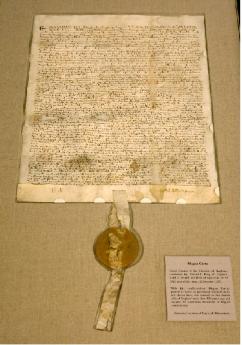
|
| 13th Century Magna Carta |
NATIONAL constitutions are mainly an outgrowth of the 18th Century Enlightenment, even though similar features are to be found among ancient legal codes. Those who trace the origins of the American constitution to the 13th Century Magna Carta will usually point to a central sentence of clause 39:
No free man shall be arrested, or imprisoned, or deprived of his property, or outlawed, or exiled, or in any way destroyed, nor shall we go against him or send against him, unless by legal judgement of his peers, or by the law of the land.
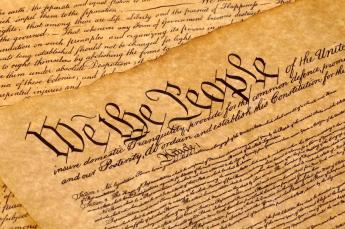
|
| American Constitution |
That's a pretty good beginning, a good example of a needed legal principle, but unrecognizable as what we would today call a Constitution. It states what a government may not do, but does not define the nature of a government which does the job best. Nor do even the many Enlightenment philosophers of government take that final step of outlining where their notions should take us until the American Constitution had been written and defended in the Federalist papers. Nowhere among the writings of Montesquieu (The Spirit of the Laws, 1748), Catherine the Great (Nakaz, Instructions to the All-Russian Legislative Commission, 1767), Diderot (Observations About Nakaz, 1774), James Madison (1787), John Dickinson(1763) or Gouverneur Morris(1787) can there be found much tightly described definition of a constitution. Certainly, there is no definition within the writings of Adam Smith if we look for rule-making among Enlightenment thinkers whose ideas were influential on the 1787 Philadelphia document. The American constitution was the product of many minds, before and after 1787. The outlines of its final form converged, and emerged, from the Constitutional Convention of the summer of 1787, with Gouverneur Morris as the penman of record. To him, we certainly owe its succinctness, which is the main source of affection for the document. That probably understates matters; in his diary of the secret meetings, James Madison records that Gouverneur Morris rose to speak about 170 times, more than any other delegate. Lots of thought and debate; ultimately, few words.
The Elizabethan Sir Francis Bacon has the greatest claim on devising a theory of law and law-making in the Anglosphere tradition. But his elegant modification of Galileo's scientific method, the English Common Law, is more a methodology for creating good laws than an outline of a nation's legal principles. Anyway, tracing the American Constitution back to an underlying British one tends to stumble when the British Constitution fails to meet a definition which would include our own. The British Constitution is said to be "unwritten" to the degree it is a consensus of revered documents. It can be amended by Parliament at will, has a variable history of defining just who is covered by it, and in order to define constitutional principles seems to rely on sentences extracted from difficult context. If the two constitutions had been written and compared at the same time, one would say the British had sacrificed coherence out of respect for tradition. In fairness, some features of the American constitution are also perhaps unnecessary for every constitution, but by surviving as the oldest constitution of the modern form, have become its model. That would be:
A set of principles governing the legitimacy of a nation's laws, and firmly standing above them. It defines its own domain, geographically and by the membership of a defined citizenry. Except as otherwise defined, it supersedes all other governance within its domain. It defines and defends its own origins. It includes a description of how to amend it, which is intentionally infrequent and difficult. It goes on to outline the structure of the laws it regulates, with subtle modifications made to channel the type of power structure which will govern.
In the American case, history and culture generated several other instabilities so central they justified heightening the difficulty to amend them to a Constitutional level, thus conferring undisputed dominance over competing principles of governance. That would be:
A separation of government powers weakened all potentially offending branches of government, and thus enhanced citizen liberty. Separation of church from state, for like purpose. A right of citizens to bear arms, to strengthen citizens' defense against internal or external attack, and perhaps also warning that revolt must be possible, even endorsed, as some final extremity of protection for citizen sovereignty.

|
| Russia's Catherine the Great |
It enhances our comprehension to contrast the outcomes of competing 18th Century implementations of the Constitution idea. Russia's Catherine the Great proposed a constitution steeped in the traditions of the Enlightenment but ultimately designed to define and strengthen the role of the monarch. Denis Diderot her French protege recoiled at this viewpoint, substituting other views resembling those of Jean Jacob Rousseau. He opened Observations About Nakaz his commentary to the Queen, with the following declaration:
There is no true sovereign except the nation; there can be no true legislator except the people. Whether looking back to the English Civil War or forward to future disputes between the Executive and Legislative branches, it makes clear the Legislative branch was dominant, with the Executive branch acting as its agent.
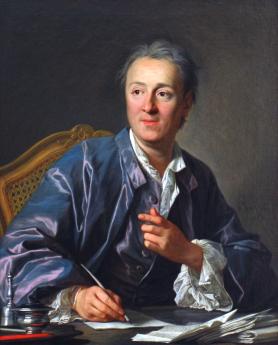
|
| Denis Diderot |
With this ringing warcry, the French model nevertheless ushered in the extremes of the Terror, the Guillotine, and the Napoleonic conquests. The consequences of the French constitution undermined world confidence in the benevolence of public opinion, at least deeply confounding those for whom the democratic rule was not totally discredited. Once more new life was breathed into allegiance for the monarchy, military rule, and dictatorship. Public opinion, it seemed, was not either invariably benign or comfortably far-seeing. The noble savage, mankind naked of tainted civilization, was not necessarily wise or worthy of trust. Edward Gibbons, the 1776 author of The Decline and Fall of the Roman Empire was pointing out where it all might lead if we completely believed in the collective goodness of the human condition. At the least, the failure of the French Revolution complimented the viewpoint of the Scottish philosopher, Adam Smith, who also in 1776 emphatically urged a switch in that reliance toward a sense of enlightened self-interest, as follows:
It is not from the benevolence of the butcher, the brewer, or the baker, that we can expect our dinner but from their regard to their own interest.
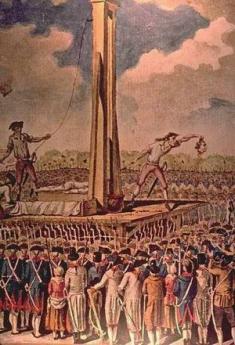
|
| Terror, the Guillotine, |
It is not surprising that Diderot rejected the Leibniz view of things that "All is for the best, in this best of all possible worlds." And, in view of his dependence on Catherine, not surprising he did not publish his rejection of it until 1823. Thomas Jefferson was in France as ambassador during the time of the American Constitutional Convention, fearing to confront George Washington; and likewise keeping his conflicting views private for several years. Eventually, they surfaced in the creation of an anti-Federalist political party along with the conflicts which kept the new nation in a turmoil for the following forty years. It is surely a testimony to the strength of the Constitution's design that the country was able to shift between such extreme governing philosophies but still hold together without changing the governing statement of purpose. Indeed, it is plausible to contend that our two political parties still continuously debate the useful tension between these two differing opinions.
Advantages and Disadvantages of Being a Small Country
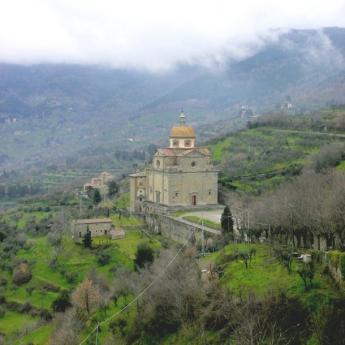
|
| very pleasant |
LIVING in a small country seems to be very pleasant, and many people prefer it to the hustle, bustle and high taxes of living in a large country. Unfortunately, big neighbors are tempted to conquer and enslave you. Aside from this one disadvantage, many people would prefer a simple, quiet life among blood relatives, all tending to think the same way. It's one step above tribalism, and maybe it's a form of peaceful tribalism.

|
| Measles |
But our evolutionary ancestors didn't think they could afford this luxury. They lived in a strange wilderness filled with fierce aborigines who often took a notion to scalp you, even if you were willing to become a hunter-gatherer like them, because they scalped other hunter-gatherers, too. And they were good at making war. Later historians sometimes contend that European settlers only gained a foothold in the New World because the Indians had been weakened by smallpox, measles, and other contagions which advanced ahead of the exploring Europeans. English settlers along the Atlantic coast were able to overcome the Dutch and Swedes who preceded them, but the French in Quebec and the Spanish in Florida were a greater threat. Worst of all enemies were the rulers of England, who seemed to think it was natural to enjoy the benefits of the New World without the nuisance of living there. A century or more of conflict from the enemies who surrounded them had pretty well convinced the English Atlantic settlers that they simply had to get bigger and stronger. Otherwise, one of the many enemies surrounding them would eventually succeed in what seemed to be a universal goal: conquest.
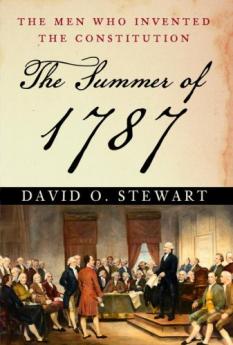
|
| The summer of 1787 |
The colonists had learned one other thing. Their own loose federation of small peaceful states was in some ways worse than rule by an outside King. The Confederation had been constantly reluctant to surrender local power to a unified defense; almost by definition, an invader was better disciplined than the defenders of a loose tribal alliance. The defense alliance had few advantages for keeping local bickering under control and was definitely less effective with families and children to protect against a mobile force of adult male warriors. The Confederation barely held together during an eight-year war against a common enemy, and it was rapidly coming apart after peace was declared in 1783. The English and French could see all this, too. Once they settled their own war with each other, each of them planned to envelop the former colonies. So George Washington and James Madison gathered the Best and the Brightest together in Philadelphia in the summer of 1787, intending to construct a practical plan for what almost all the colonists wanted: a Union. A Union strong and big enough so other nations would leave them alone. A Union was benign enough so its citizens would enjoy the same Liberty they had as a loose alliance. Divided informally into four interest groups, each of the four needed concessions to be made. But each also needed to leave the other three feelings they had gained something important as the price of surrendering to what some other group could not do without. Having found the vital concessions, it was then still necessary to tinker and re-balance, so that everyone could still "live with it". In essence: 1) The South had to be given time and forbearance to work out its difficult problem of slavery, moral qualms notwithstanding. 2) The nine small states had to be protected against perpetual domination by the three big ones, of Virginia, Pennsylvania, and Massachusetts. 3) If America was to realize the full advantage of growing from thirteen states to fifty, existing old states must not take advantage of new ones. 4) Political revolution was not the end of it; there was also the Industrial Revolution. Fishing, lumbering, farming, trade, and cotton, would in some way need to accommodate banking and manufacturing, assisting rather than upsetting other compromises. Given these tangled issues, it would be a long, hot summer in Philadelphia.
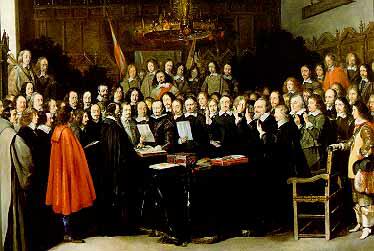
|
| Treaty of Westphalia in 1648 |
Three of the four main problems were obvious, demanding to be addressed. Slavery was obvious from the start; you either solved this problem or the South would walk out. The western wilderness was bigger than existing America; it too could not be ignored. And finally, huge variations of climate and resources led to local specialization; a marvelous thing, if you could trust your suppliers and customers to cooperate. But curiously, none of these issues got directly to the political problem the Constitutional Convention was meant to solve, which was unifying thirteen different sovereignties, each of which was prepared to get up and walk out. The modern nation state was created by the Treaty of Westphalia in 1648; its guiding principle was mutual respect for local sovereignty. Having pacified over a hundred contentious central European states, it required a great deal of self-assurance for anyone to flout it. It seemed hard to imagine any way to remain sovereign, without commanding a vote equal to that of other sovereignties. The delegates from the State of Delaware, which had separated from Pennsylvania within the past decade, were "prohibited [by their legislature] from changing the Article in Confederation establishing an equality of votes among the States". Just what agitated the minds of the Legislature of Rhode Island was kept private, but something about a Union bothered them so much they refused to send delegates to Philadelphia even to discuss Union. After they assembled and started having dinner together at taverns, and later as they were beginning to vote in coalitions, one thing began to emerge. The small states banded together, hung out together, talked alike, and began to vote alike. Their emerging leader was John Dickinson of Delaware, the author of the Articles of Confederation, and very likely one of the prime agitators in the lower three counties of Pennsylvania -- breaking off from Pennsylvania and becoming the State of Delaware. Furthermore, Dickinson had been Governor of both Delaware and Pennsylvania, so he was very familiar with the deplorable behavior of the Legislature of Pennsylvania, now and for decades in the past. It took a long time for this sly old political operator to show his cards, but when he did, he gave James Madison the shock of his life. Madison, the near neighbor of George Washington and leader of the Virginia delegation, the author of the Virginia Plan, and the clear authority on the politics of government in America was busily consumed with working out the details of the emerging Constitution. Obviously, it went to his head a little, and so he was dumbfounded when Dickinson drew him aside in the corridor to tell him he wasn't going to have a Constitution at all. Dickinson was walking around with the votes in his pocket of five or six of the nine small states and was telling Madison that the small states were fed up, and not going along. Young Madison was suddenly confronted by the most respected lawyer in America, whose timing was perfect. For what may have been the first time in his life, Dickinson fully revealed the depth of his annoyance, that the big states would always take the little ones for granted. That the little ones were always expected to be deferential to the big fellows in charge of the big states. And then the clincher: "I would rather risk conquest from a foreign state than being forever dominated by my larger neighbors." That put it in a nutshell. If the only reason for joining a Union was to be protected from foreigners, Dickinson wasn't so sure he preferred his coalition partners. Evidently, this was the feeling of most of the other small states at the Convention, and it may well be the feeling of all small states, anywhere and everywhere.
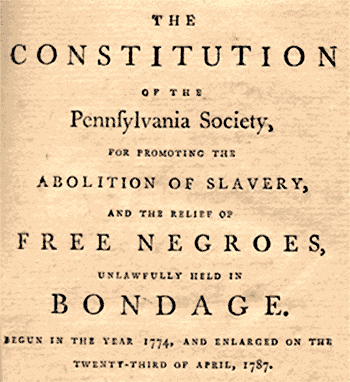
|
| Promoting the Abolition of Slavery |
Once the Convention got the idea, solving it became comparatively easy, but why waste an opportunity? There is a good reason to suppose it was Ben Franklin, silent as a cat watching a mouse, who matched it up with slavery. His fellow Pennsylvania delegate, James Wilson, had prepared the way by starting the discussion of granting 3/5 representation for slaves, but it had received comparatively little notice in the previous few weeks. Franklin rammed it home, adding a sop to the large states by according to the House of Representative sole power to introduce money legislation. Two of the main issues of the convention were solved with one agreement, small-state representation, and slavery. Who can say how long he had been nursing this idea. He had agreed to be president of the Pennsylvania Society for Promoting the Abolition of Slavery, about a month before the Constitutional Convention began. Prior to that, he and his wife had owned a slave or two, for many years. On June 2, the society adopted a resolution to end the slave trade and presented it to Dr. Franklin, asking him to present it to the Convention. He never did, explaining later it was "advisable" to let the matter lie over. In August, Alexander Hamilton blocked a similar resolution from the New York Manumission Society, even though he had been a fervent lifelong opponent of slavery.
Political Parties, Absent and Unmentionable
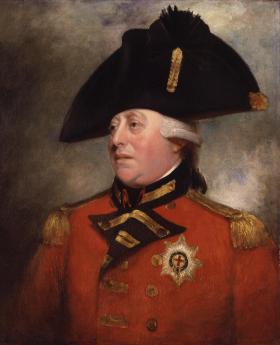
|
| King George III |
BECAUSE America had recently revolted to rid itself of King George III, the Constitutional framers of 1787 sought to construct a government forever free from one-man rule. Inefficiency could be accepted but central dictatorial power, never. It is unrealistic however to expect a wind-up toy to keep working forever, and our Constitution creates the same worry. After two centuries, some chinks have appeared.
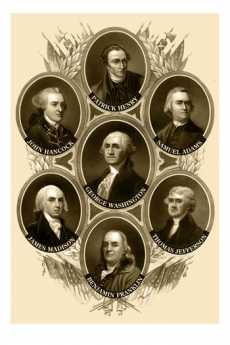
|
| Founding Fathers |
Political parties existed in 18th Century England and Europe, but the American founding fathers seem not to have worried about them much. Within ten years of Constitutional ratification, however, Thomas Jefferson had created a really partisan party which naturally provoked the creation of its partisan opposite. James Madison was slowly won over to the idea this was inevitable, but George Washington never budged. Although they were once firm friends, when Madison's partisan position became clear to him, Washington essentially never spoke to him again. Andrew Jackson, with the guidance of Martin van Buren, carried the partisan idea much further toward its modern characteristics, but it was the two Roosevelts who most fully tested the U.S. Supreme Court's tolerance for concentrating new powers in the Presidency, and Obama who recognized that the quickest way to strengthen the Presidency was to weaken the Legislative branch.
Dramatic episodes of this history are not central to present concerns, which focuses more on the largely unnoticed accumulations of small changes which bring us to our present position. Wars and economic crises induced several presidents, nearly as many Republicans as Democrats, to encourage migrations of power advantage which never quite returned to baseline after each crisis. Primary among these migrations was the erosion of the original assumption of perfect equality among individual members of Congress. A new member of Congress today may tell his constituents he will represent them ably, but when he arrives for work he is figuratively given an office in the basement and allowed to sit on empty packing cases. This is not accidental; the slights are intentional warnings from the true masters of power to bumptious new egotists, they will get nothing in their new environment unless they earn it. Not a bad idea? This schoolyard bullying is a very bad idea. If your elected representative is less powerful, you are less powerful.
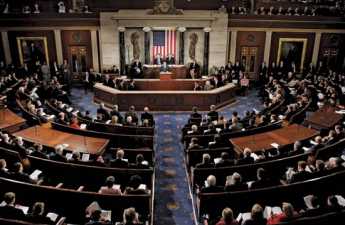
|
| Houses of Congress |
Partisan politics begins with vote-swapping, evolves into a system of concentrating the votes of the members into the hands of party leaders, and ultimately creates the potential for declaring betrayal if the member votes his own mind in defiance of the leader. The rules of the "body" are adopted within moments of the first opening gavel, but they took centuries to evolve and will only significantly change direction on those few occasions when newcomers overpower the old-timers, and only then if some rebel among the old timers takes the considerable trouble to help organize them. In the vast majority of cases, after adoption, the opportunity to change the rules is then effectively lost for two years. Even the Senate, with six-year staggered terms, has argued that it is a "continuing body" and need not reconsider its rules except in the face of a serious uprising on some particular point. Both houses of Congress place great weight on seniority, for the very good purpose of training unfamiliar newcomers in obscure topics, and for the very bad purpose of concentrating power in "safe" districts where party leaders are able to exercise iron control of the nominating process. Those invisible bosses back home in the district, able to control nominations in safe districts, are the real powers in Congress. They indirectly control the offices and chairmanships which accumulate seniority in Congress; anyone who desires to control Congress must control the local political bosses, few of whom ever stand for election to any office if they can avoid it. In most states, the number of safe districts is a function of controlling the gerrymandering process, which takes place every ten years after a census. Therefore, in most states, it is possible to predict the politics of the whole state for a decade, by merely knowing the outcome of the redistricting. The rules for selecting members of the redistricting committee in the state legislatures are quite arcane and almost unbelievably subtle. An inquiring newsman who tries to compile a fifty-state table of the redistricting rules would spend several months doing it, and miss the essential points in a significant number of cases. The newspapers who attempt to pry out the facts of gerrymandering are easily gulled into the misleading belief that a good district is one which is round and compact, leading to a front-page picture showing all districts to be the same physical size. In fact, a good district is one where both parties have a reasonable chance to win, depending for a change, on the quality of their nominee.
So that's how the "Will of Congress" is supposed to work, but the process recently has been far less commendable, and in fact, calls into dispute the whole idea of a balance of power between the three branches of government. We here concentrate on the Health Reform Bill ("Obamacare") and the Financial Reform Bill ("Dodd-Frank"), which send the same procedural message even though they differ widely in their central topic. At the moment, neither of these important pieces of legislation has been fully subject to judicial review, so the U.S. Supreme Court has not yet encumbered itself with stare decisis of its own creation.
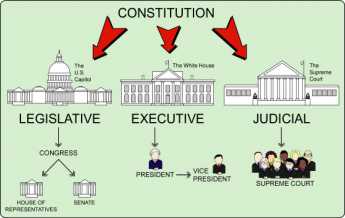
|
| Three branches of government |
In both cases, bills of several thousand pages each were first written by persons who if not unknown, are largely unidentified. It is thus not yet possible to determine whether the authors were affiliated with the Executive Branch or the Legislative one; it is not even possible to be sure they were either elected or appointed to their positions. From all appearances, however, they met and organized their work fairly exclusively within the oversight of the Executive Branch. Some weighty members of the majority party in Congress must have had some involvement, but it seems a near certainty that no members of the minority party were included, and even comparatively few members of highly contested districts, the so-called "Blue Dogs" of the majority party. It seems safe to conjecture that a substantial number either represent special interest affiliates or else party faithful from safe districts with seniority. The construction of the massive legislation was conducted in such secrecy that even the sympathetic members of the press were excluded, and it would not be surprising to learn that no person alive had read the whole bill carefully before it was "sent" to Congress. It's fair to surmise that no member of Congress except a few limited members of the power elite of the majority party were allowed to read more than scattered fragments of the pending legislation in time to make meaningful changes.
The next step was probably more carefully managed. No matter who wrote it or what it said, a majority of the relevant committees of both houses of Congress had to sign their names as responsible for approving it. Because of the relatively new phenomenon of live national televising of committee procedure, the nation was treated to the sight of congressmen of both parties howling that they were only given a single day to read several thousand pages of previously secret material -- before being forced to sign approval of it by application of unmentioned pressures enabled by the rules of "the body". When party members in contested districts protested that they would be dis-elected for doing so, it does not take much imagination to surmise that they were offered various appointive offices within the bureaucracy as a consolation. As it turned out, the legislation was only passed narrowly on a straight-party vote, so there can be a considerable possibility of its likely failure if the corruptions of politics had been set aside, with members voting on the merits. Nevertheless, since this degree of political hammering did result in a straight-party vote, it leaves the minority party free to overturn the legislation when it can. The prospect of preventing an overturn in succeeding congresses seems to be premised on "fixing" flaws in the legislation through the issuance of regulations before elections can open the way to overturn of the underlying authorization. Legislative overturn, however, is very likely to encounter filibuster in the Senate, which presently requires 40 votes. Even that conventional pathway is booby-trapped in the case of the Dodd-Frank Law. The Economist magazine of London assigned a reporter to read the entire act, and relates that almost every page of it mandates that the Executive Branch ("The Secretary shall") must take rather vague instructions to write regulations five or ten times as long as the Congressional authorization, giving the specifics of the law. The prospect looms of vast numbers of regulations with the force of law but written by the executive branch, emerging long after the Supreme Court considers the central points, years after the authorizing congressmen have had a chance to read it, and well after the public has rendered final judgment with a presidential election. The underlying principle of this legislation is the hope that it will later seem too disruptive to change a law, even though most of it was never considered by the public or its representatives.
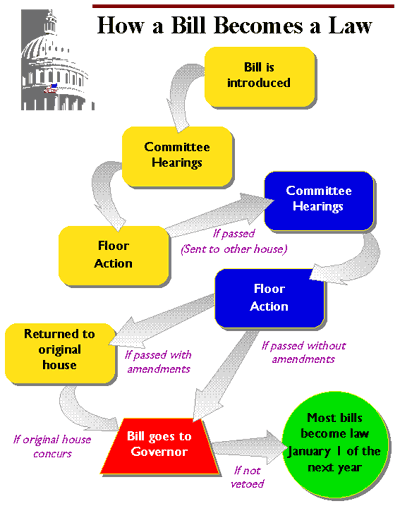
|
| Bill become a Law |
The "regulatory process" takes place entirely within the Executive branch. Congress passes what it terms "enabling" legislation, containing language to the effect that the Cabinet Secretary shall investigate as needed, decide as needed, and implement as needed, such regulations as shall be needed to carry out the "Will" of Congress. Since the regulations for two-thousand-page bills will almost certainly run to twenty thousand pages of regulations with the force of law, the enabling committee of Congress will be confronted with an impossible task of oversight, and thus will offer few objections. The Appropriations Committees of Congress, on the other hand, are charged with reviewing every government program every year and have the power to throttle what they disapprove of, by the simple mechanism of cutting off the program's funds. Members of the coveted Appropriations Committees are appointed by seniority, come from safe districts, and are attracted to the work by the associated ability to bestow plums on their home districts. By the nature of their appointment process, unworried by the folks back home but entirely beholden to the party bosses, they have the latitude to throttle anything the leadership of their party wants to throttle badly enough. The outcome of such take-no-prisoners warfare is not likely to improve the welfare of the nation, and therefore it is rare that partisan politics are allowed to go so far.
The three branches of government have become unbalanced. These bills were almost entirely written outside of the Legislative branch, and the ensuing regulations will be written in the Executive branch. The founding fathers certainly never envisioned that sweeping modification will be made in the medical industry and the financial industry, against the wishes of these industries, and in any event without convincing proof that the public is in favor. This is what is fundamentally wrong about taking such important decisions out of the hands of Congress; it threatens to put the public at odds with its government.
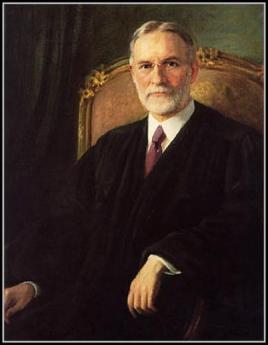
|
| Justice George Sutherland |
There is no need to go further than this, harsher words will only inflame the reaction further than necessary to justify a pull-back. And yet, the Supreme Court would do us mercy if it doused these flames; the Supreme Court needs a legal pretext. May we suggest that Justice George Sutherland, who sat on the court seventy years ago, may have sensed the direction of things, short of using a particular word. Justice Sutherland recognized that although it is impractical to waver from the principle that ignorance of the law is no excuse, it is entirely possible for a person of ordinary understanding to read law in its entirety and still be confused as to its intent. He thus created a legal principle that a law may be void if it is too vague to be understood. In particular, a common criminal may be even less able to make a serious analysis. Therefore, at least in criminal cases, a lawyer may well be void for vagueness. In this case, we are not speaking of criminals as defendants or civil cases of alleged damage of one party by a defendant. Here, it is the law itself which gives offense by its vagueness, and Congress which created the vagueness is the defendant. Since we have just gone to considerable length to describe the manner in which Congress is possibly the main victim, this situation may be one of the few remaining ones where a Court of Equity is needed. That is, an obvious wrong needs to be corrected, but no statute seems to cover the matter. The Supreme Court might give some thought to convening itself as a special Court of Equity, on the special point of whether this legislation is void for vagueness.
We indicated earlier that one word was missing in this bill of particulars. That would be needed, to expand the charge to void for intentional vagueness, an assessment which is unflinchingly direct. It suggests that somewhere in at least this year's contentious processes, either the Executive Branch or the officers of the congressional majority party, or both, intended to achieve the latitude of imprecision, that is, to do as it pleased. Anyone who supposes the general run of congressmen voluntarily surrendered such latitude in the Health and Finance legislation, has not been watching much television. Given the present vast quantity of annually proposed legislation, roughly 25,000 bills each session, the passage of a small amount of vague legislation might only justify voiding individual laws, whereas an undue amount of it might additionally justify a reprimand. However, engineering laws which are deliberately vague might rise to the level of impeachment.
Human Rights

|
| AMA Logo |
ABOUT ten years ago, I first encountered the use of the term "Human Rights". Seated as a member of the House of Delegates of the American Medical Association, I was distracted when a late resolution was passed around for urgent consideration. Such resolutions require a supermajority to be introduced as a business of the House, either two thirds, or three-quarters of the attendees, and a little speech by the author explaining the "reason for lateness". The resolution was a one-line request for endorsement of the concept of Human Rights by the American Medical Association. The stammering explanation for lateness (as distinguished from holding it over to the next meeting) was that it was self-evident that the Association would favor human rights and immediately place it on the "Consent Calendar" for approval without voting on it. Like everyone else in the room, I looked to my seatmate neighbor to ask what this was all about. No one knew, so the author was asked to explain. Well, it was about human rights, not animal rights or corporate rights, and was otherwise so self-evident it needed no further explanation. Just what was in the mind of others seated in that room I cannot say, but to me, the resolution seemed like nonsense, whose author seemed very innocent and naive. In any event, the resolution was dismissed, the paper discarded, and we went on to the medical issues we were there to discuss.
.jpg)
|
| Bill of Rights |
In fact, the whole concept of prosecution for human rights violation is too vague to be useful. When individuals commit outrageous crimes, the matter can normally be handled under the criminal code, with the offense defined and appropriate punishment described in advance. Murder and torture are not commonly affected by whether or not rights have been violated. On the other hand, offenses by component national states are usually regarded as acts of war; if Ghengis Kahn were accidentally admitted to the EU, the punishment would start with expulsion from the Union, and surely go on to war, essentially the same outcome. A nation which was able to deal with the Iroquois and the Comanche tribes surely has no nightmares about Nebraska electing Pol Pot as governor. The human rights advocates have simply got to make a more plausible case for revolutions in our criminal justice system, if they are to be taken seriously.
Obamacare's Constitutionality
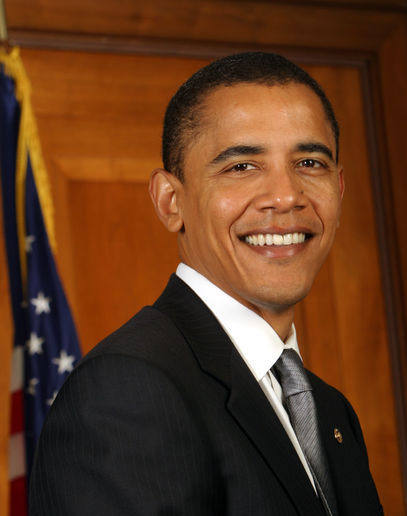
|
| President Barack Obama |
Any idea of a smoothly orchestrated introduction of the new law was jarringly interrupted by the U. S. Supreme Court, which granted a hearing to a complaint by 26 State Attorney Generals, that the ACA Act was unconstitutional. It was big news that the whole Affordable Care Act might be set aside without selling a single policy of insurance. The timing (before the Act had actually been implemented) served to guarantee that the constitutional issue, and only that issue, would be discussed at this Supreme Court hearing. By implication, there might be more than one episode to these hearings.
While many could have declaimed for an hour without notes, about difficult issues perceived in the Obama health plan, questioning its constitutionality had scarcely entered most minds. Then of a sudden, near the end of March 2012, a case testing the constitutionality of mandatory health insurance was granted certiorari and very promptly argued for three full days before the U.S. Supreme Court. Twenty-six state attorneys general brought that case, so it was not trivial. In jest, one Justice quipped he would rather throw out the whole case than being forced to spend a year just reading 2500 pages of it. But Justices are practiced in the art of quickly getting to the heart of a matter; it soon boiled down to one issue: was it constitutional for Congress to force the whole nation to purchase health insurance? Is there no limit in the Constitution about what the federal government can force all citizens to do, even though the federal government itself is severely limited in scope? Even though the Tenth Amendment states that anything not specifically granted to the federal becomes the province of the states? Would a people who fought an armed revolution for eight years over a 2-cent tax on tea, now consent to a much larger requirement which it was not constitutionally authorized to impose? Most people finally wrapped their heads around some formulation of this non-medical concept to a point where they vaguely understood what the Judges were arguing about. This was beginning to look like a topic where We The People made a covenant with our elected leaders, and reserve the sole right to change it.
 The powers not delegated to the United States by the Constitution, nor prohibited by it to the States, are reserved to the States respectively, or to the people. 
|
| Tenth Amendment |
The Constitution describes a Federal system in which, a few enumerated powers are granted to the national government but every other power is reserved to the state legislatures. The Constitution had to be ratified by the states to go into effect, and the states had such strong reservations about the surrender of more than a handful of powers that they would not ratify the document unless the concept of enumeration was restated by the Tenth Amendment. If states could not be persuaded of the need for a particular power to be national, they might refuse to ratify a document which enabled permanent quarrels about the issue. That wariness explains why The Bill of Rights goes to the extra trouble of declaring certain powers are forbidden to any level of government.
Separation of powers further explains why Mr. Romney's mandatory health insurance plan might be legal for the Massachusetts legislature but prohibited to Congress. After Chief Justice Roberts got through with it, whether that truly remains the case will now depend on whether it is described as a tax, a penalty, a cost, or whatever, and only if the U.S. Supreme Court later agrees that was a proper definition. Because -- to be considered a tax it must be too small to be considered coercion. The law itself apparently does not underline this distinction in a way the Justices felt they could approve. Indeed, while Mr. Obama in his speeches firmly declared it was not a tax, later White House "officials" declared it might be. There was agreement the Federal government could tax, but no acknowledgment that taxes might have any purpose other than revenue.
Under circumstances widely visible on television, however, it was clear that the House of Representatives had been offered no opportunity to comment on this and many other points in this legislation. To a layman, that fact itself seems as clear a violation of constitutional intent as almost any other issue, since the Constitution indicates no idea was ever contemplated that any President might construct laws, nor like the courts, interpret their meaning. The first three Presidents repeatedly raised the question of whether they had the authority to do certain things we now take for granted. And Thomas Jefferson was similarly boxed in by a clever Chief Justice, who said, in effect, Agree to This Decision, or be Prepared to Get a Worse One. The Constitution says it is the function of the Executive branch to enforce the law, "faithfully". Presumably, all of the thousands of regulations issued by the Executive Branch under this law must meet the same test.
Given that the Justices now hold it constitutional for the federal Congress to mandate universal health insurance, based on some authority within taxation, the immediate next issue is paying for it. Millions of citizens, usually young and healthy but sometimes for religious reasons, do not want to buy health insurance and would be forced to do so by this law because the only available alternative is to pay a revenue tax. The purpose of including them is to overcharge people who will predictably under-use community-rated insurance, and thus enable the surplus to reduce costs for those who do want to buy health insurance. (Here, the Court had the pleasure of reducing an unusually opaque law to an unusually succinct summary.) To avoid the charge of a "taking", the Administration must either surrender on the universal mandatory point or else surrender the level premiums of community rating. The lawyers for the complaining attorneys general laid great stress on this particular issue in their arguments, and it occasioned much of the discussion from the bench. However, until the law is in action there is as yet no cause for damages.
Here it will depend on whether you call it a permissible activity for Massachusetts or for the Federal government. The Constitutional point seems to be that it is a legitimate Federal power to tax for the "general welfare", so it now becomes essential to know if the taxes for noncompliance in Obamacare are really a penalty. The Justices seemed to be questioning whether the whole scheme would collapse with the forced subsidy eliminated, and because of that be deemed to have been a "general welfare purpose" adequate to meet the constitutional requirement of a permissible enumerated purpose. Lawyers can generally find such a defined purpose in the words of the Constitution, even if they have to dip into the penumbras and emanations of the words. So the question might just devolve into whether a majority of the Justices wish to declare the penumbra to be within the enumerated powers of Congress. To all of this, the lawyers for the attorneys' general reply that such an enumerated power is impossible because there is no limit to what could be done by this method. Congress would then be allowed to mandate that everyone eat broccoli for dinner, or buy a General Motors car in order to pay for the deficits of rescuing that company from bankruptcy. Almost anything could be mandated by establishing a penalty called a tax; including a mandate that everyone buys a product in order to pay for the deficits of mandating it, illustrates there exists at least one circularity of enumerating something like a power of Congress. According to this reasoning, mandated health insurance cannot, therefore, be an enumerated power of Congress, either now or at any time in the future. The sort of speculative law outlined in this paragraph is exactly the sort of thing the Supreme Court dislikes and shows the utility of denying access to the courts to anyone who cannot claim "standing", defined as a claim of actual injury from a law.
The Justices undoubtedly had to weigh the fact that the American public has a strong distaste for this sort of convoluted reasoning, which sounds like a convention of Jesuit priests having fun. On many other occasions, however, the public has accepted the judgment of people it hired to understand this sort of thing; that's called respect for the law. Eighty years ago in the Roosevelt court-packing case, there was the same sort of collision between the Court and the President, and the Court knuckled under even though the public supported the Court. In both cases, the Court seemed to be yielding to the President, with the unspoken compromise that the President would not pursue his earlier course with quite so much vigor. Since the really central 1937 question of overturning the Interstate Commerce clause ("Commerce among the several states") was left unaddressed, the velvet glove might yet contain an iron fist.
How Could We Improve State Legislatures?
NEARLY every student of government agrees, the state government is the weakest part of the American system. Almost every academic or federal congressman, at least, seems to hold that belief, while almost any lawyer would prefer to have his case in Federal court rather than before a state judge. Although the followers of Thomas Jefferson kept the nation in an uproar for forty years pursuing his notion of government identical with the will of the people, the public opinion he prized nevertheless remains scornful of state government. Such scorn by itself can undermine legislative quality, creating a destructive cycle.

|
| Small Town |
Students of government point to instability and unpredictability as main features of concern about state government. The legal profession values a central principle, called stare decisis: Leave the Law Alone. Stability, or order is desired so highly that dictatorship, corruption, and poverty may be tolerated in order to achieve it. Conversely, an inability to predict what is coming next is highly destabilizing, a sign of amateurism at the controls. Any decision is better than no decision, even a bad decision is better than no decision. The public hesitates to act in the face of indecisive governance, and dynamism drains from the environment. Most of the time it doesn't make much difference what a rule says as long as it is emphatic and prompt. And it's usually the case that bad decisions are quickly reversed. Test it yourself: how much difference does it make whether a one-way street runs East or West? But it would make a considerable difference if almost any street changed Eastward to Westward to Eastward again, several times capriciously. Suppose someone did make a bad mistake: Eastward to Westward and back to Eastward again. Everyone can now see that Westward was a dumb idea, you bonehead. It will be a very long time before anyone tries that, again.
A second general characteristic of state government is the location in a small remote town. The capital of Michigan is in Lansing, not Detroit. In New York, it is in Albany, not New York City, and in Pennsylvania, it moved from Philadelphia to Harrisburg. Even in little Delaware, it is in Dover, in Maryland, it is in Annapolis rather than Baltimore. And so through most of the fifty states, we see the same pattern. No doubt it could be argued: getting away from big-city bosses and political machines is positive, and stretching a network of highways through the open countryside to the new capital is a source of real estate development for the state. But it definitely creates weakness of the governing system to locate it in towns that have little newspaper coverage, no think tanks, few universities, and even poor airports, school systems, museums, and civil society. These are generally one-industry towns, where the children of the bureaucracy all go to school with each other, along with the offspring of lobbyists. Voices in the past have been raised against the development of a ruling class, as might have been seen in Potsdam outside of Berlin and similar political suburbs. But we have just as surely developed a bureaucratic subclass in Bethesda, Maryland and Alexandria, Virginia. No doubt there are many other similar clusters, in other states. Where the children of bureaucrats are clustered in the schools near the Washington Post and the National Journal it can be argued they know the inside game of politics, as well as the children of Boston, know the inside baseball of the Red Sox, and there is a certain value to developing such a political artisan class. But in the vast majority of the country, the dominant problem is that the voters of the state have not the faintest idea of how their state government is functioning. The children of bureaucrats may still learn at the dinner table how to adopt "Yes, Minister" behavior or how to find lifetime bureaucratic jobs with accidentally high fringe benefits. The big flaw is the rest of the state does not realize the smallest part of how prevalent such behavior is in the capital. If the politician who is caught in a scandal is largely unknown to the general public, it is an advantage to the political class. With less notoriety, there is less scandal, possibly even lighter punishment from judges he has been involved in appointing. Rising above this sort of sorry behavior, the quality of legislation is surely diminished when there is diminished fame for doing a good job, diminished scorn for incompetence.
To a certain extent, this pressure for mediocrity is augmented by the reduced importance of the subject material. The federal government is involved in foreign policy and monetary issues Constitutionally forbidden to the state legislature. Even at the bottom of the hierarchy of public notice, the activities of mayors and city councils have a more direct effect of the lives of the local voter than state government does, with importance shaved off at both the top and the bottom. Such activities really can possibly afford to be relegated to some rural small town with nothing to do except play poker and drink in the bar of the local hotel; it's a question which is a cause, which is the effect. The Constitution provides that the Federal government shall be limited to a dozen specified activities, while everything else is governed by the states. Unfortunately, two hundred years of chipping away at the wall separating two governments of limited powers have left the states with little scope to govern anything substantive except the insurance industry. That does not prevent most state governments from considering more than two thousand bills a session, but these are matters of little import, boring, boring.

|
| Big City |
The Progressive Movement of the early Twentieth century saw much the same problems, being handled by much the same sort of people; but they over-reacted to it. Like most reform movements, the Progressives wanted to make a big splash and then go home. A century later, it is difficult to assess how outrageously corrupt the Senatorial process may or may not have been at that time in the past. Somehow, the public became convinced the U.S. Senate was a terribly rotten organization because of the terribly rotten selection system for U.S. Senators. Consequently, the Seventeenth Amendment passed with little fanfare, taking the selection process away from "the states" and giving it to a statewide popular election. In states with large urban political machines, this change meant giving the nominating process to big-city bosses, taking it away from the legislatures. That is definitely a distinction without much difference. Most big-city political bosses are content to select obedient hacks for nomination to the legislature, but this is the source of most rotten boroughs, gerrymandering, corruption, and mediocrity. In the areas of rural machine politics, the boss himself is more commonly attracted to the appointive legislative jobs. In New Jersey, the election law prohibits more than small campaign contributions to legislators but permits unlimited contributions to the county boss. Either way, the progressive reform of 1913 has not had much progressive effect. One thing is very certain. When the method of selection of the state's U.S. Senator is left to the legislature, the resulting Senator is pretty certain to be a current member of the Legislature. And in the instant you aspire to be U.S. Senator, it becomes very clear you will greatly enhance your chances if you first run for the legislature. There were once likely to be half a dozen senatorial aspirants within the Legislature at any one time, so there was an appreciable improvement in the quality of the Legislatures. True, there was probably more grand-standing and maybe even vote-swapping in return for assistance on the Senatorial seat selection. But there was also much more attention paid in return to the state's interests, by the U.S. Senate. The state's voice on the national scene was considerably louder. The value of a legislative seat and the later experience it provided were much enhanced by possessing the power of selecting a U.S. Senator.
A measured assessment of the effects of the Seventeenth Amendment is long overdue. My own view is that ripping the selection process away from the state legislatures and substituting a second popularly elected national legislative house, was both an over-reaction and a careless gesture without much improvement. Because vested interests have been created, it is now nearly useless to ask the present Congress to study the matter. We have to hope that some rich private citizen will see the need for a serious study of these issues, and both fund the effort as well as leave it alone. If it gets captured by ideologues, it will require a second study, or maybe even a third.
And finally, we get to Earl Warren. former governor of California, and President Eisenhower's choice for Chief Justice of the Supreme Court of the United States. Eisenhower later once referred to the appointment as the worst decision he ever made. Two decisions are said to have been his pets: Baker v. Carr and Reynolds v. Sims. Prior to these two decisions, it was really only possible to gerrymander Congress and the fifty state Legislatures. The U.S. Senate and the various state Senates were elected by geographic boundaries, and couldn't be gerrymandered. Tracing back to a corridor conversation between John Dickinson and James Madison, Dickinson had caucused with the other small states and was in a position to block almost any Constitutional Provision at the Convention. He used words to the effect of, "Do you want a Constitution, or don't you?" and went on to describe his total unwillingness to allow big states to dominate small ones. Out of this, Ben Franklin cobbled a compromise of a two-house Legislative Branch. To pass, any legislation would require the approval of both houses. The House of Representatives would have proportional representation, while in the Senate each state would have two senators, regardless of its population. Eventually, almost every state Legislative branch followed this pattern, although it was not a provision of the Constitution.
The hidden dissention in 1789 was over slavery, but Dickinson was a shrewd and experienced lawyer. He knew human nature, and the best example of the power of his insight has later emerged as California has become the largest state. Every new insurance design first seeks to conform to California laws, because it's expensive to launch a new project, and you might as well assure yourself of conforming to the rules of the largest market, first. The smallest state, Delaware, was not about to be pushed around like that, even on many unrelated issues. But centuries later, Earl Warren had learned the same lesson in reverse and lunged for it when he became Chief Justice. Using the argument of "equal justice", he forced 49 state Senates to adopt proportional representation, just like the other house in their branch. New Jersey, which I know best, is typical in being forced by this decision to change its Senate from one vote per county to voting by population. The subtlety was that both houses of state legislatures became dominated by big-city machines and hence were capable of being gerrymandered. They thus gained control of the nomination process, and gerrymandering nation-wide has assumed the posture of machine politics dominating the selection of candidates. It's certainly true that in the Pennsylvania legislative process, you can regularly observe party hacks drive up, and vote on the floor in accordance with a little card which the "leadership" hands them as they step on the floor. The beauty part of this is that decades later, most citizens haven't a clue what had happened.
Sanctity of Contracts
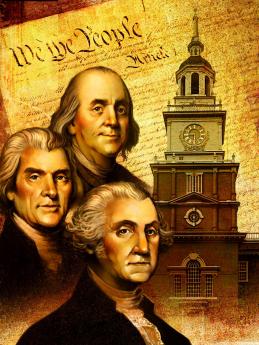
|
| Constitution |
THERE is little doubt many state legislatures behaved in a capricious and high-handed way in the twenty years prior to the 1787 Constitution. Outrage at this behavior was one of the important stimulants to writing the Constitution, as well as putting public pressure on state legislatures to ratify it in 1788. Section 10 of Article 1 is devoted to limitations on state behavior deemed to be generally offensive or otherwise contrary to the national interest. Among the comparatively short list of absolute prohibitions is found "No state shall......, pass any law.....impairing the obligation of contracts, or grant any title of nobility." This section condemns certain behavior as indefensible but does not specify the Federal government to be similarly limited, along with the states. However, the government which was established as one of the limited federal powers. Unless a power was specifically granted to the Federal government, the Tenth Amendment announces it belongs to the states, or, as the Ninth Amendment would have it, to the people. There seemed no need to limit the scope of a power which could not exist. The Tenth and final Amendment in the Bill of Rights ended the 1791 Constitution with the words:
X. The powers not delegated to the United States by the Constitution, nor prohibited by it to the states, are reserved to the States respectively, or to the people.
A modern capsulation might be: the Federal Government is no more empowered to impair the sanctity of contracts than it is to grant titles of nobility.
The Framers of the Constitution were inexperienced in the habits of a republic, or they might have anticipated the general tendency of those who are empowered to enforce the law, to flout it in their own behavior. Around the smallest courthouse in the nation, one need not be surprised to find the Sheriff or other local worthies, parking their cars in illegal spots without fear of punishment. It is not just state legislatures who are tempted to disobey the laws they pass, but a general tendency of all authority to do so. It requires a local citizenry with a very short fuse, displaying instant hostility to the first sign of this sort of swaggering, to keep their local newspapers from filling up with scandal stories in the weeks before an election. Many of these stories are politically motivated, of course, but it must be admitted that in a naughty world, they are necessary.
 No State shall enter into any Treaty, Alliance, or Confederation; grant Letters of Marque and Reprisal; coin Money; emit Bills of Credit; make any Thing but gold and silver Coin a Tender in Payment of Debts; pass any Bill of Attainder, ex post facto Law, or Law impairing the Obligation of Contracts, or grant any Title of Nobility. No State shall, without the Consent of the Congress, lay any Imposts or Duties on Imports or Exports, except what may be absolutely necessary for executing it's inspection Laws: and the net Produce of all Duties and Imposts, laid by any State on Imports or Exports, shall be for the Use of the Treasury of the United States; and all such Laws shall be subject to the Revision and Control of the Congress. No State shall, without the Consent of Congress, lay any duty of Tonnage, keep Troops, or Ships of War in time of Peace, enter into any Agreement or Compact with another State, or with a foreign Power, or engage in War, unless actually invaded, or in such imminent Danger as will not admit of delay. 
|
| Article One, Section 10 |
A 21st Century illustration is found in a letter sent to current beneficiaries of Social Security, reducing their monthly check by twenty or more percent in some cases, and in other cases just a few dollars. The notice says that this deduction is based on IRS reports of the individual's income, using material supplied by the Internal Revenue Service, thereby triggering an additional side question about the right of the government to use supposedly private information to impair the obligation of the Social Security contract. Setting the privacy issue aside, what is illustrated is an even more discouraging violation of the expectations for fair dealing. This is a privacy right which might have been enforced by an excruciating repetition of the time-consuming requirement of manual specification. Now that computers are more common, what formerly needed no specification, now perhaps begins to need it, since endless repetition is now so tediously conventional.
Governments casually violate the sanctity of contracts when it is self-serving to do so, and presumably, it can be shown that they neglect to violate, or even punish those who violate, whenever such violations are to the advantage of anyone else. It has been said that this matter has been adjudicated in favor of the government in the past, thus creating a precedent, stare decisis, so to speak. Whatever the logic of such precedents, growing Constitutional literacy among the public is going to demand that the matter be re-argued. That is to say, it is comparatively easy to imagine growing knowledge about the Constitution among the citizens, while it will never be easy to expect the public to puzzle through the steps in a judicial chain which explicates how the reverse is now a superior view. Therefore, the demand for re-argument should be a growing one.
Beginning Social Security Benefits
 Some should start benefits before age 65, others should delay it for ten years or more 
|
| Dr. Fisher |
BY mail or visit to the local Social Security office in your neighborhood, it is possible for anyone to determine how much you can expect to be paid in benefits, and at what age. In fact, it is a wise precaution to ask for this information every few years, just to be sure your payments are being credited properly, since hundreds of millions of payments are flowing into many millions of accounts, and you want to get things straight before years of problems accumulate. In the early years of the program, one of their biggest problems was that a great many people used the sample numbers on the illustration card instead of their actual "Social".
Assuming payments from your employers have been flowing properly, you currently have the option to retire at the age of 62 and start getting reduced benefits. You will get three extra years of payout, but you may need to pay income tax on some of it, and the payout will be less. More recently, the standard age to begin payments was raised to age 67, gradually phased in. And more recently than that, the payments became taxable for some people, with offsets for Medicare reducing it. Better check where you stand. My Pennsylvania Dutch uncle used to say it was bad arithmetic to take the money early. But my Scotch-Irish accountant advised everybody to take the money as soon as possible, because money in your pocket is real money, while future payments depend on your living long enough to get them, and just might depend on who was elected President. Who knows, you might get hit by a truck tomorrow. So, ultimately any decision about this matter is based on opinions which differ since the sanctity of contracts is fast becoming a quaint anachronism.

|
| Social Security Benefits |
However, the arithmetic is available, once you know a few facts. The longer you wait, the larger the monthly payments will become. However, you can count on about 3% inflation during the interval so the money might have less purchasing power. Some of the monthly payment will be free of income tax, some of it will be taxable at whatever your tax rate might be. If you spend the money, it's gone; but if you save it, it will grow at an after-tax rate which may or may not be greater than if you leave it with Social Security until you need it. The arithmetic isn't very hard, but if you look around on the Internet, somebody surely provides a fill-in-the-blanks tool which will calculate it for you.
If the arithmetic or your personal situation is such that you aren't going to spend your Social Security check as soon as you get it, here's what you do. Arrange for direct deposit into a world index fund, total market. Historically, that will grow at 8% compounded annually and will pay about 1.8% taxable dividend. Now, do the math again, and see if you are better off leaving it with those nice folks on Social Security Boulevard, in Baltimore, instead of those nice folks at Vanguard or Fidelity.
The whole theory behind this maneuvering is that many people have half-time jobs or dual incomes, or income from the sale of a house, which means that for a few years after they retire they have more income than they will have later in life. For them, there is a choice between the two methods of saving Social Security money for the time in life when they need it. Other people need every cent they can get, right now. If you are one of the lucky ones, try to be even a little luckier by using arithmetic and choosing between the options. If you are hit by a truck, it really won't matter what you do, so try to be an optimist.
A Time to Read Books

|
| Retirement Reading |
BEFORE we talk about retirees reading books in a retirement community, reflect for a moment about reading in your own home during the working years. Most suburban homes do not have many books in evidence. It's possible to stand in the center of most suburban living rooms unable to see a single book, while it's hard not to see a television set. Increasingly, a home computer is only a few steps from the front door, but the evolution from desktop to laptop to portable telephone to tablet is too rapid to make generalizations. Everyone says books are going to disappear soon, and newspapers maybe even sooner. But there are still said to be a million books constantly in transit on 18-wheeler trucks between print shops and wholesale depositories, night and day. Right now, the producers, publishers and merchandizers of printed material are in turmoil and decline, so they talk about it a lot. But ultimately it is the reading public which will decide what it wants and force the suppliers to give it to them.

|
| reading |
It seems to me that what the reading public wants most is to find time to read. The suburban home has so few books because the sort of person who lives in the suburbs to be near the school system, just doesn't have time to read after the day's work and commuting. Helicopter parents spend a lot of time hauling the kids to mandatory kid entertainments, as can easily be seen by driving past a high school in the afternoon and observing the lines of cars with waiting mothers. They make the best of it as a social occasion for mothers with shiny cars, but they really do it to be sure the kids don't get mixed up with recreational drugs. Anyway, they do it, and it all eats up their discretionary time for reading. Meanwhile, their's no local bookstore to buy books, even unread books. They may think they will catch up on their reading after they retire, but that's becoming increasingly unlikely in my observation. They are getting out of the habit of reading. By the time they retire, they will find it's almost like going back to school. You must find other readers, readers groups, conversations about books over the bridge table, books lying about. The first economy a struggling news paper makes is to cut down the size and number of book reviews, because there are no bookstores to take out advertising, and advertising is what pays for newspapers. There's one good feature about that; what book chatter there is, is not so confined to recent books. Some people are bookish and other people are golf-ish, and a growing number of people are simply TV-ish. It's a struggle to find time for work and the family, and books on top of that. No matter what level of reading the working people may be doing, it's declining in favor of deferred reading when they finally retire.

|
| Retirement Community |
Having visited quite a number of retirement communities, I find the community's library is a good place to assess the institution and its typical inhabitant. When it's newly built, a library area is set aside, usually without many books. The first few waves of residents quickly fill up the space with books they brought from home. During the first ten years it is possible to guess what sort of person lives there by the books they brought and deposited, or died and left to the library. The space, more or less empty at first, gets full and something must be discarded. Enlarging the library is an economic issue, so the size at which it halts will to considerable degree reflect the willingness equilibrium to pay for new construction, both by the book lovers, and by the book enemies, the golfers and the administrators. Ultimately book congestion gets to the point where someone simply must cull out some old books to make room for the new. In another essay I have described the use of volunteers to exchange books of no lasting interest for more books of real interest to real residents, through a used-book exchange. But someone must organize the process, often recruited by an administrator who has learned to be horrified of construction which cannot be rented, but must be cleaned and cared for. If passive resistance is a new term to you, this is the place to learn about it. The residents have short memories, lack drive and follow-through. So inertia tends to win, and lack of reading feeds on itself because there is nothing to read. What's apparently needed here is an organization of bookish people that extends to all retirement communities, probably with a paid staff, an annual meeting, Internet connections. And therefore an immortality which can outlive and outlast the passive resistance. Good ideas then have a means to spread and help support other good ideas; somehow the costs must be supported until a few True Believers in Books can write a bequest in their wills to sustain it. And activate their intention, so to speak.
One of the largely unrecognized reasons for the success of the American Revolution was that the Colonies had a higher level of literacy than the Mother Countries. Thomas Paine, for example, printed 150,000 copies of Common Sense on the rickety old printing presses of the 18th century, when there were fewer than three million white inhabitants of the thirteen colonies. And who was mainly responsible for that? It was Benjamin Franklin with his invention and popularization of the lending library. If Ben could find time to start libraries in 1742, and Andrew Carnegie was later found willing to pay for dozens of them, surely the time and energy can be marshaled in the 21st century to establish a first-class library system throughout the retirement communities of the nation.
Void for Vagueness

|
| Question Mark |
BECAUSE otherwise, everyone would plead ignorance, ignorance of the law has been dismissed as a defense for thousands of years. What, then, is the situation when the statute itself is accused? Here, a group of citizens accuses the government of enacting vague laws, conceivably with the malicious intent to give government officers a free hand. Only the U.S. Supreme Court may decide Constitutional issues, and nine Justices are certainly inadequate to cope with a huge vagueness project. The Court must at least define a method for coping with imprecision. What is to be done with this?
 Is it really any longer true that ignorance of the law is no excuse? 
|
This novel proposition is a recent one, mostly because the volume of laws has steadily grown since 1787, when we began the Republic without any statutes at all, to the present gargantuan size of the Federal, State and Local Codes requiring hundreds of feet of shelf space in a library. No human brain can contain all that information at once, not even to mention the interpretive Regulations which grow by hundreds of thousands of pages each year. The limits of practical governance by traditional methods have passed the point where ignorance of the law is a theory, it is an absolute certainty for every citizen in most situations. Is it thus really any longer true that ignorance of the law is no excuse? Perhaps modern computer search capability has advanced to the point where it can conquer this problem for judges in an appellate situation, but woe unto the financier or automobile driver who professes ignorance of the state of judicial dispute resting in the system. Sometime relatively soon, some legal genius must figure out a sensible, workable, way to reconsider the rule that ignorance is no excuse when plainly anything other than ignorance is a laughable pretense.
But this muddle is only a background for a new twist to the same issue. The synthetic process has now created a growing apprehension that duly elected officials have passed laws which are deliberately vague, forcing the country to surrender decisions to a tyrannical process. Leave motive and intent out of the discussion; a tyrant is being created whether a tyrant seeks the crown or not. Just review recent history.

|
| Lame Duck |
We now grow accustomed to seeing proposed legislation thousands of pages long, appearing on the desks of elected congressmen who have been given a day or two, or sometimes less than a day, to approve them. The authors of this proposed legislation are often quite unidentifiable, and might sometimes not even be officials of the government. For a while, there was some talk of appointing "Czars" for certain areas of activity, but this has apparently provoked too much Congressional resistance. These multi-thousand page bills appear out of nowhere in particular, nominally authorized by the Speaker, the Committee Chairman, or some other official of Congress whose freedom of action is actually tightly controlled by arcane but irresistible partisan politics. A legislative body pretending that every member is the equal of every other, is in fact ruled with an iron hand.
Elected representatives of the people, charged with writing our laws, who even happen to belong to the majority political party, are powerless to refuse to adopt the legislation they have not read, and the minority is even more dismissively ignored. Confounding even careful reading of small sections of these bills, they are vague, potentially intentionally so. There is scant opportunity afforded legislators to question the authors of these legislative piles, not even the opportunity to have them reveal their names. Subscribe to this mystery package, or suffer unspoken political punishments. We are told assurances are privately given there will be an opportunity to correct errors when regulations are written by the Executive branch. The Legislative branch effectively removed itself from the expenditure of a trillion dollars for a medical reform that no one could lucidly explain, affecting a sixth of the gross domestic product. Within a month, this "reform" was followed by a highly similar process directed at the financial system of the nation, which likewise bears almost no resemblance to the problems it claims prompted the action. Small wonder the countryside is dotted with Tea Parties, and small wonder they are confused by what they want. Chief among their objectives is a demand to return to an understandable system, controlled by the legislative branch, not the executive one.
Whether the applicable term is "vagueness" or whether an underlying motive is to be alleged by calling it "deliberate ambiguity", a former Justice of the U.S. Supreme Court once supplied an adequate slogan for these legal barricades. Justice George Sutherland, who sat on the court from 1922 to 1938, constructed the legal standard for the unconstitutionality of criminal cases called Void for Vagueness . It seems a sufficiently evocative slogan for fall election campaigns, and it might even serve as a legal claim in a Supreme Court test of the matter.
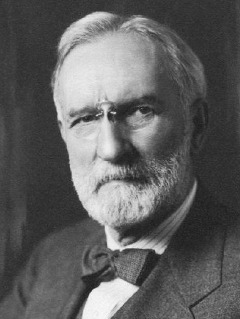
|
Meanwhile, we have wars to fight, and the deepest recession in eighty years, plus whatever events national or international news may force us to contend with. A monumental Supreme Court test seems an almost welcome alternative. To make it possible, the Court will have to resolve the difficulty that this issue is neither criminal nor civil in the usual sense, and there is no third alternative. Furthermore, there is the picky-picky quibble that the doctrine of "void for vagueness" has only previously been used in criminal cases. We will have to endure the Republican resurrection of George Sutherland as a former American Bar President, whose elevation to the Supreme Court was so anticipated by everyone that he was unanimously confirmed, without hearings, the day he was nominated.
The fact is, popping the bubble of "void for vagueness" in this particular political tap dance is only an early warning that the nation is already inundated in a sea of bewildering rules. To the point where ignorance of the law must be acknowledged to be the common fate of all citizens. The law must soon address the matter, uncharacteristically remembering that the first step in resolving any true crisis is to decide which rule must be broken.
Roberts the Second
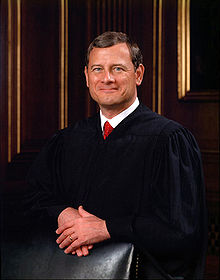
President George W. Bush nominated John Roberts to be Chief Justice of the U.S. Supreme Court in 2005. Since then, the Chief's administrative changes to the court and the whole court system have been slow but methodical. To the extent the Chief Justice has control of the matter, Roberts has been taking steps which make the Court into a more thoughtful branch of the Federal Government, ultimately making it more powerful. His first step was to reduce the number of cases considered each year, constraining them to conflicts between lower jurisdictions, unless otherwise mandated. This year, the number of cases heard is about eighty, or only half of the previous numbers. The policy lets unconflicting Appellate judgments stand. A second court must disagree with the first one, for the Supreme Court to enter the case.
The so-called Obamacare case, (NFIB v. Sebelius), meets this conflict-between-jurisdictions standard, but is notable for other innovations. The case was nationally broadcast as a live slide show. It heard arguments lasting three days instead of the usual single hour, and of course, it broke new substantive ground in a case of national interest. The decisions will now get more press attention; but this relatively rapid evolution toward a national debating contest, through modified Court procedure, is more important than it looks. It would be saying too much to claim the whole nation now fully understands its Constitution of enumerated powers, but surely the citizens who have only recently learned something about it must number in the millions. Before this case, many law school graduates might have had difficulty describing the design of the federalized system in a plausible dinner-table conversation. It's not yet clear where John Roberts is going, but he is surely trying to bring the public along with him.
During the semi-televised arguments, I was at first impressed with the rapid-fire exchanges between Justices and litigators about the operation of health insurance. Some people are born with high-speed brains and high-speed speech apparatus; no doubt, such people are sought after to represent others in court. But after practicing Medicine for sixty years and writing books about health insurance, I recognized that several rapid-fire responses by the attorneys were confident but off-target. Frankly, if you only have a few minutes but many points to make, and have to say them before someone interrupts, you would almost have to be a circus freak to manage. This is quite unnecessary, no matter how entertaining it may be to other lawyers. There seems no reason why the questions cannot be submitted in writing, sometimes employing experts on the specific points, and allowing enough time without interruption to devise a thoughtful answer. At present, it seems to matter more what the litigating attorney will agree to, than what is the fact. The outcome of cutting a litigant off after he says, "Yes, your honor, but.." is now only to establish whether both sides agree on a point; just why they agree or disagree is not even sought, let alone disregarded. It would seem useful to know Justice Thomas' reasons for abstaining from questions during oral arguments, for a different sort of example. So, it is easy to imagine that John Roberts has some thoughtful goals in modifying Supreme Court traditions, and equally understandable if jurists of this distinction become irritated by suggestions from the peanut gallery. It is thus fitting that we all hold back and first watch where the varsity means to take us. But allowing the public to express an opinion, is not the same as lobbying for it.
The Obamacare Act was about 2600 pages long, and two years after the President signed the bill, more than half of the necessary regulations remain to be written. The Law is "not severable", which is to say individual pieces of it cannot be attacked in court, without potentially upsetting decisions made on other portions. As a consequence, both the good and bad parts could endure for a long time to come. Or, the whole thing could suddenly sink from sight, relatively quickly. If the Justices can tolerate it, this legislation with many "moving parts" could be in the courts for a long time to come. So, Justices will then find the rule Roberts has made, of only accepting conflicts between the jurisdictions, protects their time and patience. But in doing so it will shift most final judgments into the hands of the lower, appellate courts. The legal profession will like this quite a lot. It will be like the gratifying situation said to prevail when a commanding General decides to retire -- everybody down the line could get promoted one notch.
By artfully selecting cases to argue, there were here four points open to the decision. Only two of them eventually had bearing on the final outcome of this case, but the whole issue is not necessarily concluded. The first decision got the most attention, deciding that the penalty for not having health insurance could be read as just a tax, and therefore was legal for Congress to use as a Constitutional basis for making health insurance mandatory, as Roberts declared the "Commerce clause" was not. The distinguishing feature of a Congressional exaction which is "just a tax" appears to be whether it exceeds the expenditure intended; if it exceeds the expenditure it would presumably be punitive. Nothing had seemed more important to the Founding Fathers than to expand the ability of the national government to impose taxes to service war debts. To truncate this wish of George Washington and Robert Morris into a short-cut, "Congress has the right to tax", or conversely to expand its confining language into "Congress has the right to tax in order to make private health insurance compulsory" just points up that the only real purpose of taxes in Washington's day was to wage war, and that the purpose of allowable taxes probably would have been defined if other purposes had been foreseen. Someone could usefully point out that what the Constitution really means is that Congress has the right to tax for "defense and the general welfare", and challenge anyone to argue otherwise. One sees the clever hand of Gouverneur Morris fuzzing up that argument; are we to ignore the fungibility of money and ask whether Congress may spend money on the general welfare only if it is general? How about earmarks, for example, are they all for the general welfare?
However, to turn a blind eye toward interesting issues is apparently a price that must be paid for obtaining the right for the Chief Justice to write the majority opinion, which eventually slips in some language (in legal language, an obiter dictum) to the effect that , of course, you couldn't use the Commerce Clause to do that. Getting Justice Ruth Ginsburg to sign that will eventually sound like the box John Marshall constructed in Marbury v. Madison. If that obiter dictum is as heat-resistant as the opinions of the first Justice Roberts in Franklin Roosevelt's court-packing effort, then the Commerce Clause is likely to be off-limits for a long time. Of course, if Chief Justice Roberts had joined the other four conservatives he would still have been able to write the majority opinion, but in the opposite direction. Except of course for that inevitable political accusation: There you go again, you 5-4 conservatives.
The second decision, in this case, is the sleeper. Congressional managers in charge of writing the bill had finally decided they had no way to cover 40 million uninsured people, except by diverting fifteen million of them into what is acknowledged to be the absolutely worst part of the American medical system, the state Medicaid programs. And because many States Rights advocates were in charge of state Governor's offices, the Congressional bill-writers added what is now a fairly familiar prod to cooperation. That is, if a state refuses to take the extra Medicaid patients, it will lose all federal funds for existing clients of state Medicaid. This sort of coercive provision has become so standard in highway bills and other federal programs operating at the state level, that it was largely unnoticed in the 48 hours the Congress was given to examine 2600 pages of legislative provisions. This, however, is blackmail, said John Roberts, quite unallowable under the defined separation of powers of the Constitution, between the state and federal levels of government. Furthermore, if some state decides to accept the penalty, it could close the existing program for the poor and accept the subsidy for the middle class, thus enhancing their revenues and reducing their obligations to the poor. Congress must now devise new strategies for suggesting federal programs to the states, and probably will do so. But the financial blackmail strategy now has a permanent black eye, with a skeptical public eye on the alert for it. The ironic conclusion of all this comes from the Congressional Budget Office, which predicts we will end up with 30 million uninsured persons, anyway.
What's awkward about this was immediately pointed out by attorney Richard Epstein: it ignores the century-old precedent set by Chief Justice Taft. Writing about a Child Labor law, Taft created a Supreme Court precedent that the Constitutional taxing power of the national government may not be used to implement what cannot be implemented directly. We can now see an example within the borders of a single case, where the Constitutional taxing power provision is used to indicate an otherwise impermissible Obamacare, and a few pages later its use is forbidden in the case of Medicaid in order to accomplish a forbidden coercion. Locating the two issues in the same case decision helps make the distinction between using the taxing power for revenue, and using it to coerce obedience; the distinction grows as the magnitude of the tax grows, particularly after it exceeds the intended government expenditure. What is not emphasized is the basis for Chief Justice Roberts reversing the precedent set by Chief Justice Taft on the same topic a century earlier. He did it with the Obiter dictum, and yet he didn't exactly do it. The four liberal Justices who co-signed the decision are not in a position to dispute it, while the four conservative Justices may not wish to. In either direction, however, the vote of the current Chief Justice appears to be both decisive and subtle.
It remains to be seen whether the 'tax, not commerce' strategy was clever. If the tax approach proves to be durable, it presumably extends to a wide range of legislation since Roosevelt's New Deal. Already, its awkward features have emerged in renaming portions of Obamacare into Chapter 48 of Subtitle D of the Internal Revenue Code of 1986 (!). Any law student who tries to look that up is going to have a frustrating time. But on the other hand, sometimes you win by losing. If it should somehow not be a tax, it has already been excluded from the Commerce Clause, so it has no hook left in the Constitution on which to hang it. There's something in this whole wrangle which resembles the position of Germany and Japan after the Second World War. In spite of losing that war, those two nations seem to have prospered better than England and Russia, who lost their empires but are said to have won the war .
Statement of Accounts, March 1785
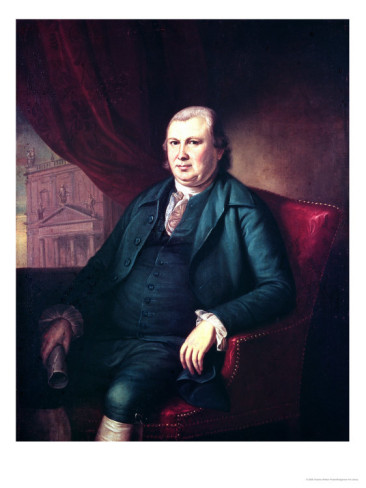
|
| Robert Morris |
AFTER resigning his position as Financier of the United States, Robert Morris worked for five months laboriously summarizing and detailing his official activities, and then he paid for printing five hundred copies of it. The document had a five thousand word preamble and over two hundred printed pages of detailed accounts, a prodigious effort. And a rather unprecedented one in an environment of traditional national secrecy about its accounts, except for the pioneering efforts of Necker in France. His reward at first was an infuriating discovery five years later that the government had not released his report to the public, and continued throughout this time to investigate Morris's earlier activities on the Secret Committee. The standard of bookkeeping for a secret committee engaged in smuggling arms before the Declaration of Independence was understandably obscure, and to have it flogged for failing to uphold the improved standards of government accounting which Morris later devised for the new nation was such a mixture of ingratitude and slyness that the behavior seemed well beyond infuriating. Nevertheless, it must have been gratifying to end the report with a positive balance of $21,000 even after eight years of struggle, war, and improvisation. The magnitude of this achievement was not lost on others in a position to see the contrast with earlier efforts, encapsulated by James Madison whose committee report concluded, "It appears to the committee that the regular official examination has already been made, and it would be inexpedient to incur the expense of a re-examination."
Madison by this time was evolving into a political opponent of Morris, but Samuel Osgood was a declared opponent of his approach to government accounts. Osgood's assessment of his opposition to the approach was prefaced with a ringing statement of its effectiveness: "I will tell you very freely, that in mere money transactions, he has saved the United States a very large sum... I am also of the opinion that much more regularity has been introduced into the keeping of accounts than ever before existed. This is a matter in my mind of very great importance. And without the strictest attention to it, the several states ought not to trust Congress with a single farthing of their money."
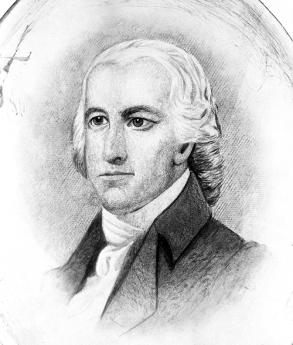
|
| Samuel Osgood |
The supreme irony of this situation was that by imposing strict accounting standards where none had previously existed, Morris was offering to his enemies a club to beat him with. Instead of recognizing that Morris was both too diligent and too rich to bother with cheating, there emerged a duel in which his enemies took unusual behavior to be a sure sign of wickedness, while Morris absolutely courted personal disaster, supremely confident he was unchallengeable.
There are two enduring truths to both positions. It is absolutely true that a well-informed public has a perfect right to do anything it pleases, regardless of the existing rules of government, regardless of the opinions of predecessors, heedless of the opinions of anyone else, past present or future. If a republic has supplanted a monarchy, the republic in a sense has the same divine rights. It's just unwise to act that way in anything but extreme circumstances.
On the other hand, it is also absolutely true that stability, peace, and prosperity are most likely enhanced by avoiding the mistakes of the past, following the accepted rules of conduct, and avoiding the counsel of loud and unstable leaders. Once in a while, a genius does appear and his discoveries should be adapted for future use as rules. Once in a while, a treasured maxim needs to be discarded. In a limited way, these evolutions of the rules of the road are an application of Galileo's invention of the scientific method, applied to the Common Law by Sir Francis Bacon. Make a likely conjecture, then verify it. And the second source of societal wisdom is the constant pressure of Society's Hidden Hand, as described by Adam Smith. The American Revolution was not so much an overthrow of a boisterous king, as it was incompletely successful incorporation of existing principles into a Constitutional system of government.
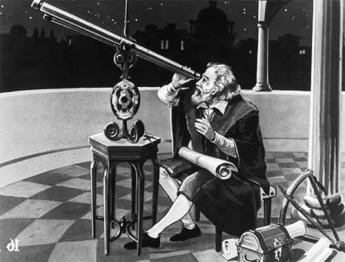
|
| Galileo's invention |
Considering the convulsive upheaval caused by its principles, the 18th Century colonists must be forgiven for misjudging their situation when confronted with a genius like Robert Morris. In barely a moment of time, Morris assembled these ideas into a vastly improved system of government management, immediately proved that it made the country rich, and demonstrated that he had the common sense to make himself rich using the same ideas. Even the idea usually attributed to his friend George Washington, that honesty is the best policy, sounds more like Morris than Washington, and certainly more like Morris than Alexander Hamilton. Only the likes of John Adams protested that honesty came from God. Morris did not deny that was possible, but acted as though it was irrelevant.
Pay attention to the voice of consensus, be quick and alert to occasional innovation, and don't waste your time being crooked. With these three rules, Morris got rich and made his country rich, enraging those who do not think riches should be a universal goal. Don't want to be a millionaire? Plenty of other people will take your place.
Our two-party system began in Appalachia, and one poor soul found himself marooned there. Hugh Henry Brackenridge, a representative of Western Pennsylvania, cried out, "If they would let Mr. Morris alone, he would make Pennsylvania a great people. But they will not suffer him to do it!" Brackenridge was never elected again.
REFERENCES
| Robert Morris: Financier of the American Revolution: Robert Morris: Charles Rappleye: ISBN-10: 1416570926 | Amazon |
The Revolution is Over, Every Man for Himself
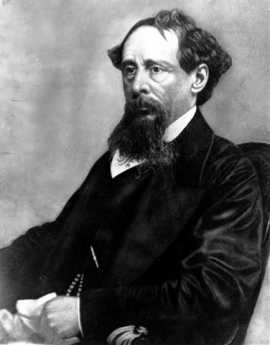
|
| Charles Dickens |
A DOZEN episodes from American revolutionary times might be called pivotal, but a single debate in the Pennsylvania Legislature seems to have begun our political parties in their present form. Two debaters, their topic, and its consequences all rise to dramatic, even operatic, heights. In another place, we intend to explore the clashing philosophies of the Eighteenth century, with Hegel and Hume at the apex, but two quotations from Adam Smith are more intelligible. Charles Dickens nearly ran away with the topic in his novel A Tale of Two Cities, but Charles Brockton Brown and Hugh Henry Brackenridge were local authors, Pennsylvanians present at the scene. John Adams and Thomas Jefferson debated for decades about which of them was the main protagonist. But all of that is the background for one operatic scene at Independence Hall, where the real David and Goliath were William Findlay and Robert Morris.

|
| Robert Morris |
Robert Morris, it must be remembered, was probably the richest man in America, a signer of the Articles of Confederation, the Declaration of Independence, and the Constitution. He was one of three men, including Ben Franklin and George Washington, about whom it could be said: the Revolution could not have been won without them. Morris essentially invented American banking, founded the first bank, the Pennsylvania Bank, invented investment banking, corporate conglomerates, American maritime insurance, and dozens of financial innovations. His merchant house probably had 150 ships sunk by the enemy. George Washington lived in his house for years. Today, he is mostly remembered for going bankrupt at the end of a busy life.
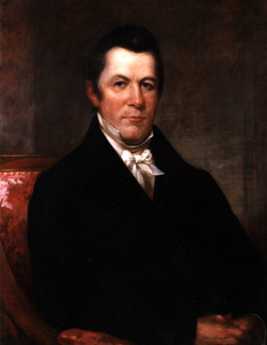
|
| William Findlay |
William Findlay, on the other hand, was a Scotch-Irish frontiersman with a flamboyant white hat, elected by others like him from the Pittsburgh area to promote inflation through state-issued debt paper, so as to finance land speculation in the West. He had no education to speak of, no accomplishments to mention. He made no secret of his self-interest in land speculation, and therefore no secret of his opposition to rechartering the Bank of North America, which Morris had founded for the purpose of restraining inflation and speculation. Findlay wanted the bank to disappear, get out of his way, and he boldly denounced Morris for his self-interest in promoting a bank where he owned stock. He utterly denied that Morris had any motive other than the profit he would make for the bank, so in his opinion, they were equal in self-interest. Let's vote.
Prior to that time, Findlay had politically defeated Hugh Brackenridge, using the two strong arguments that Brackenridge had gone to Princeton, and written poetry; how could such a person possibly represent the hard-boiled self-interest of frontier constituents?
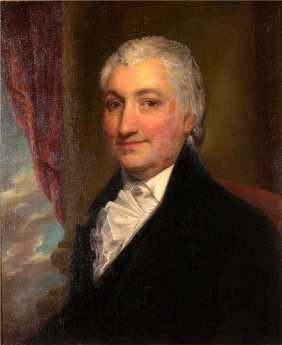
|
| Hugh Brackenridge |
Morris was positively apoplectic at this sneering at everything he stood for. As for the country's lack of trust in a man who had risked everything to save it, well, what has he done for us, lately? America had lately thrown off the King, but what it had really discarded was aristocracy. Every man was as good as every other man, and each had one vote. Under aristocratic ideals, a man was born, married and educated in a leadership class, expected to be utterly disinterested in his votes and actions, scrupulous to avoid any involvement in trade and commerce, where temptations of self-interest were abundant. Washington never accepted any salary for his years of service and even agonized for months when he was awarded stock in a canal company, wanting neither to seem ungrateful nor to make private profit. John Hancock, who came pretty close to having as much wealth as Morris, gave up his business when he was made Governor of Massachusetts. Benjamin Franklin was only accepted into public life when he retired from the printing business, to live the life of a gentleman. That's how it was, everywhere; every nation had a king and depended on rich aristocrats to supply the leadership for war and public life. But, now, America had become a republic where every man was equal. Morris and the Federalists he represented wanted to turn the clock back to an era that would never return.
Goaded too far, Morris impulsively resigned his business interests, to prove he had the nation's interest at heart in opposing inflation. It didn't help. Findlay won the vote, and the Bank of North America was closed. America was ashamed of how it behaved after the Revolution, but not ashamed enough to change.
REFERENCES
| Robert Morris: Financier of the American Revolution: Robert Morris: Charles Rappleye: ISBN-10: 1416570926 | Amazon |
Morris Upended by a Nobody
THE Revolutionary War ended militarily with the Battle of Yorktown in 1781, and diplomatically with the Treaty of Paris in 1783. The careers of Washington and Franklin appeared to be complete, while the economic and financial career of Robert Morris seemed likely to stretch for decades into the future. But as matters actually turned out for these three fast friends, it was Washington who was propelled into a new political career, Franklin soon died, and Morris got himself into a career-ending mess. The financial complexity and economic power of the United States did grow massively in the next several decades, but unfortunately, Robert Morris was soon unable to exert any leadership. At the end of Washington's eight years as President, the power of the Federalists, and particularly the three men most central to it, was coming to a close. John Adams had a tempestuous single term, and then Federalism was all over.
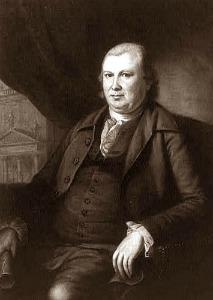
|
| Robert Morris |
The end of the Eighteenth century marked the end of The Enlightenment and the beginning of the Industrial Revolution, accompanied by many national revolutions, not just the American one. This was a major turning point for world history. The momentum of these upheavals still continues, but it is clear that the Industrial Revolution of which the Morris banking revolution was an essential part swept the world far faster than the social and political revolution, in which he also played a pivotal role. In the banking and industrial revolution, it is universally agreed that Morris was almost always right. In the social and political world, it is conversely agreed he was quite wrong. Essentially, Morris assumed that a small minority, an aristocracy of some sort, would rule any country. Within weeks of the ratification of the new Constitution, or even somewhat in anticipation of it, America made it clear that replacing an aristocracy of inheritance with an aristocracy of merit would not satisfy the need. Morris, born illegitimate and soon an orphan, was obviously in favor of promotion based on merit. John Adams defined leadership even more narrowly; he said a gentleman was a man who went to college, and he probably meant Harvard. Nobody extended the leadership class to include Indians and slaves, but the backwoodsmen of Appalachia made it clear that power and leadership at least included them. Thomas Jefferson was the visible leader of this expansion of the franchise, but changed his mind several times. James Madison switched sides; Thomas Paine switched in the opposite direction. The leaders of Shay's Rebellion and the Whiskey Rebellion lacked coherence and consistency on this point; instead of agitating for a refined goal, they mostly seemed to be running around looking for a leader. William Findlay, on the other hand, knew what he wanted. The issue might be defined as follows: it was obvious that hereditary aristocracy was too small and too inflexible to suffice, but it was also obvious that every man a king was too inclusive. An expanded leadership class was needed, but its boundaries were indistinct and contentious. But to return to Findlay, who at least had a clear idea of what he wanted.
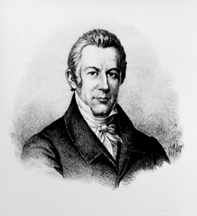
|
| William Findlay |
William Findlay was a member representing Western Pennsylvania in the State Legislature, in 1785. It would be difficult to claim any notable accomplishment in his life; he was largely uneducated. The new leadership class must, therefore, include both the uneducated and the mediocre. The Legislature at that time met in the State House, Independence Hall, in Philadelphia, where no doubt the unconventional dress and manners of backwoodsmen did not pass without audible comment. Findlay made his own political goals quite explicit; he was for paper money to facilitate land speculation which could make him rich. Wealth was a goal, but it did not confer distinction. The rights of the Indians, the rights of the descendants of William Penn, the rights of the educated class and the preservation of property were all just obstacles in the way of an ambitious man who had carefully studied the rules. Everybody's vote was as good as everybody else's, and if you shrewdly controlled a majority of them, you could do as you please. If this meat-ax approach had any rational justification, it lay in the essential selfishness of every single member of the Legislature, working as hard as he could to further his own interest. If someone controlled a majority of such votes, then the majority of the public were declaring in favor of the outcome. Those who believed in good government and the public interest were saps; the refinements of education mostly just created hypocritical liars. There was a strain of Calvinism in all this and a very large dose of Adam Smith's hidden hand of the marketplace. If you were rich, it was proof that God loved you, if you were poor, God must not think much of you, or He wouldn't have made you poor. Findlay had the votes and meant to become rich; if his opponents didn't have the votes, they could expect soon to be poor. In this particular case, the vote coming up was a motion to renew the charter of the Bank of North America. Findlay wanted it to die.
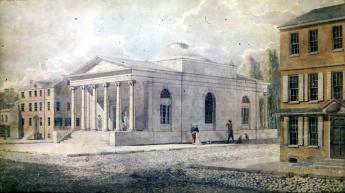
|
| America's first bank, the Bank of Pennsylvania |
It came down to a personal debate between Findlay, and Robert Morris. Morris had conceived and created America's first bank, the Bank of Pennsylvania. Today it would be called a bond fund, with Morris and a few of his friends put up their own money to act as leverage for loans to run the Revolutionary War. After a short time, it occurred to Morris that the money in a bank could be expanded by accepting interest-bearing public deposits and making small loans at a higher interest rate, which is the way most banks operate today. Accordingly, a new bank called the Bank of North America was chartered to serve this function, which greatly assisted in winning the Revolutionary War. There was no banking act or general law of corporations; each corporation had its individual charter, specifying what it could do and how it would be supervised. When the charter came up for renewal, Findlay saw his chance to kill it. Morris, of course, defended it, pointing out the great value to the nation of promoting commerce and maintaining a stable currency. The reply was immediate. Morris had his own money invested in the bank and only wanted to profit from it at the public expense. His protests about the good of commerce and the public interest in stable money were simply cloaking for this rich man's greed to make more money. Findlay made no secret of his interest in reverting to state-authorized paper money, which could then be used by the well-connected to buy vast lands in Ohio for speculation. There were enough other legislators present who could see welcome advantages, and by a small majority the charter was defeated.

|
| John Hancock |
At this point, Morris made a staggering mistake. After all, he was a simple man of no great background, largely uneducated but fortified by his ascent in society from waterfront apprentice to the highest of social positions, a friend of George Washington and Benjamin Franklin, acclaimed as a financial genius, the man who saved the Revolution, very likely the richest man in America. For many years, he had harbored not the slightest doubt of his personal genius, his absolute honesty, and total dedication to the welfare of his country. To have this reputation and accomplishment sneered at by a worthless backwoodsman, a man who would stoop to using the votes of other backwoodsmen to accomplish self-enrichment, was intolerable. Morris announced and actually did sell out his entire business interest as a merchant, at a moment when he fully understood the new nation was about to enjoy an unprecedented post-war boom. So much for his self-interest. It helps to understand that John Hancock and Henry Laurens had done the same thing in Boston and Charleston, against what we now see as a strange aristocratic tradition of prejudice against bankers and businessmen. In even the few shreds of aristocracy now surviving in Britain and Europe, the tradition persists that a true aristocrat is so independently wealthy that no self-interested temptations can attract him away from purest attention to the public good. The original source of this wealth was the King, who conferred high favor on those who served the nation well. A curious exception was made for wealth in the form of land, the only dependable store of tangible wealth, and transactions in land. Wealth was something which came from God and the King in return for public service. Land ownership was its tangible storage and transfer medium. Otherwise, grubbing around with trade and manufacture was beneath the dignity of a true gentleman.
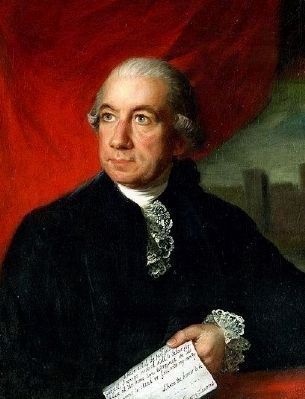
|
| Henry Laurens |
We now know what was coming. Wealth was soon to be the reward of skill and merit, recognized by fellow citizens in the marketplace, by consensus. Findlay and his friends wholly accepted this conclusion, unfortunately skipping the merit part of it for several decades. In their view, you were entitled to the money if you had the votes. As the nation gradually recognized that rewards must be durable, and once granted were yours to have and to hold, the new nation gradually came to see the need for durable ownership of property. Unless or until the owner places it out at risk in the marketplace, legislative votes may not affect its ownership. Our system ever since has rested on the three pillars of meritorious effort, assessment of value by the free market, and respect for pre-existing property. That's quite a change from the Divine Right of Kings, and therefore quite enough material to keep two political parties agitated for a couple of centuries. And quite enough change to bewilder even so brilliant a victim as Robert Morris.
Morris Defends Banks From the Bank-Haters
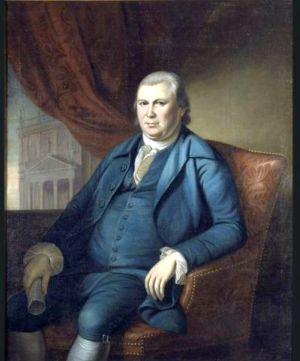
|
| Robert Morris |
IN 1783 the Revolution was over, in 1787 the Constitution was written, but the new nation would not launch its new system of government until 1790. It was a fragile time and a chaotic one. Earlier, just after the British abandoned their wartime occupation of Philadelphia in 1778, Robert Morris had been given emergency economic powers in the national government, whereas the state legislatures were struggling to create their own models of governance, often in overlapping areas. While the Pennsylvania Legislature was still occupying the Pennsylvania State House (now called Independence Hall) in 1778, it -- the state legislature -- issued the charter for America's first true bank the Bank of North America, and in 1784 the charter came up for its first post-war renewal. Morris was a member of the Pennsylvania Assembly both times. Although he was not a notable orator, it was said of him that he seldom lost an argument he seriously wanted to win. Keeping that up for several years in a small closed room will, unfortunately, make you many enemies.

|
| Tavern and Bank |
Morris was deeply invested in the bank, in many senses. He had watched with dismay as the Legislature squandered and mismanaged the meager funds of the rebellion, issuing promissory notes with abandon and no clear sense of how to repay them, or how to match revenues with expenditures. There was rioting in the streets of Philadelphia, very nearly extinguishing the lives of Morris and other leaders, just a block from City Tavern. Inflation immediately followed, resulting in high prices and shortages as the farmers refused to accept the flimsy currency under terms of price controls. Every possible rule of careful management was ignored and promptly matched with a vivid example of what results to expect next. Acting only on his gut instincts, Robert Morris stepped forward and offered to create a private currency, backed by his personal guarantee that the Morris notes would be paid. The crisis abated somewhat, giving Morris time to devise The Pennsylvania Bank, and then after some revision the first modern bank, the Bank of North America. The BNA sold stock to some wealthy backers of which Marris himself was the largest investor, to act as last-resort capital. It then started taking deposits, making loans, and acting as a modern bank. Without making much of a point of it at the time, the Bank interjected a vital change in the rules. Instead of Congress issuing the loans and setting the interest rates as it pleased, a commercial bank of this sort confines its loans to a fraction or multiple of its deposits, and its interest rates are then set by the public through the operation of supply and demand. The difference between what the Legislatures had been doing and what a commercial bank does, lies in who sets the interest rates and who limits the loans. The Legislature had been acting as if it had the divine right of Kings; the new system treated the government like any other borrower. As it turned out, the government didn't like the new system and has never liked it since then. Today, the present system has evolved a complicated apparatus at its top called the Open Market Committee of the Federal Reserve, most of whose members are politically appointed. Several members of the House Banking Committee are even now quite vocal in their C-span denunciations of the seven members of the Open Market Committee who in rotation are elected by the commercial banks of their regions. Close your eyes and the scene becomes the same; agents of the government feel they have a right to control the rules for government borrowing, while agents of the marketplace remain certain governments will always cheat if you don't stop them. This situation has not changed in two hundred years and essentially explains why some people hate banks.

|
| Seigniorage |
That's the real essence of Morris's new idea of a bank; other advantages appeared as it operated. The law of large numbers smooths out the volatility of deposits and permits long-term loans based on short term deposits. Long-term deposits command higher loan prices than short-term ones can; higher profits result for the bank. And a highly counter-intuitive fact emerges, that making a loan effectively creates money; both the depositor and the borrower consider they own it at the same time. And finally, there is what is called seigniorage. Paper money (gold and silver "certificates") deteriorates and gets lost; the gold or silver backing it remains safe in the bank's vault, where it can be used a second time, or even many times.
For four days, Morris stood as a witness, hammering these truisms on the witless Western Pennsylvania legislators. At the end of it, scarcely one of them changed his vote, and the bank's charter was lost. But at the next election, the Federalists were swept back into the majority, defeating the opponents of the bank. Although, as we learn the way democracy works, still leaving them unconvinced of what they do not want to believe.
Morris at the Constitutional Convention
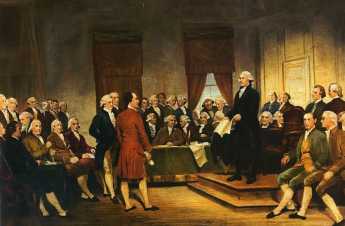
|
| Constitutional Convention 1787 |
TRUE, George Washington was the presiding officer of the Constitutional Convention. But Pennsylvania was the host delegation, so the role of presiding host should have fallen to Benjamin Franklin, the President of Pennsylvania. However, Franklin was getting elderly and turned the job over to Robert Morris, who among other things was rich enough to host some necessary parties. The rules of decorum at that time thus kept Washington and Morris out of the floor debates. The proceedings were, in any event, kept the secret, so occasional frowns or encouraging smiles are not recorded for history.
But Morris had been an active debater in the Assembly and other meetings, so he knew enough to line up a consensus in advance for the matters he thought were essential. Obviously, Morris was strongly in favor of giving the national government power to levy taxes for defense purposes, and Washington whose troops had suffered severely from the inability of the Continental Congress to pay them also regarded this taxing power as the central reason for changing the rules. By making it the central argument for holding the convention at all, Washington, Franklin, and Morris had made taxation power a foregone conclusion. And by giving them what they wanted from the outset, the rest of the convention was in a position to do almost anything else it wanted without open comment from the Titans. The sense of this trade-off was captured by Gouverneur Morris, the editor of the Constitution, in Article I, Section 8:
The Congress shall have Power To lay and collect Taxes, Duties, Imposts, and Excises, to pay the Debts and provide for the common Defence and general Welfare of the United States; but all Duties, Imposts, and Excises shall be uniform throughout the United States;This formulation had the effect of greatly empowering James Madison, the only participant who had studied the inside details intensively and cared about every comma. It also encourages the military to believe that federal taxation was mainly their entitlement, whereas those whose main goals are defined as "the general Welfare" tend to regard defense spending as an unnecessary deduction from their share.
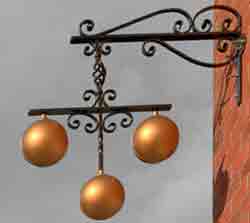
|
| Pawn Broker Sign |
Most of the convention delegates had experience with state legislatures, and Franklin and Morris had spent decades struggling with the weaknesses of legislators. A wink or a quip in a tavern was as good as an hour's speech for reminding the delegates what they already knew about human nature. What was designed as a dual system of powers of taxation, with federal oversight of balanced state budgets combined with federal power to tax on its own in emergencies or unforeseen situations. Since the members of the first few congresses after 1789 were largely the same people as the members of the constitutional convention, many details of this balance were worked out over a few following years. State powers to tax and borrow were tightly constrained, only the federal government could tax and borrow without limit. Since government borrowing is merely the power to defer taxes until later, the borrower of last resort was the U.S. Congress, alone empowered to encumber the wealth of the whole nation in a federal pawn shop window called the funded National Debt. For almost two centuries, this pawn shop window seemed able to support any imaginable expense. Today, we monitor this as the ratio of national debt to Gross Domestic Product (GDP), and we now have a clearer idea what level of that ratio flirts with hopeless inability to pay the federal government's debt. The experts say it's close to a 60% ratio, and unfortunately, almost every nation on earth now exceeds that limit. The system continues to lack an unchallenged definition of its limit, but the system is nevertheless still Morris's system, wrapped in a mountain of descriptive detail by Alexander Hamilton. If a nation borrows more than that and clearly will never repay it, that nation is to some degree a slave to its creditors, with war its only hope if creditors are unrelenting. Perhaps another way to refine the thought is to say that if the nation wishes to mortgage everything it owns down to the last shoe button, the creditors will only accept additional debt if it is proposed by someone with the power to pawn the last shoe button. To foreigners, the proof of who has what power is much more certain if written down. Morris's protege Alexander Hamilton went even further: "credit" is established when creditors can see that somebody is in the habit of getting the nation's bills paid, and "credit" is injured whenever anyone in charge, welches.
Fighting About Taxes So Soon?
THE Constitutional Convention convened in secrecy, so the reasoning behind important provisions are sometimes unwritten. That is particularly true of taxation. Wars created the main reason for abrupt tax increases in the Eighteenth century, whereas present non-war expenditures are larger and steadier. For most people in any era, taxes have always been their main cash expense, but taxes are no longer synonymous with wars. An example of the way the problem has transformed over the centuries appears in Madison's notes, where Rufus King asks What is the meaning of a Direct Tax. The befuddled assembly answered with silence. No one present seemed to know, but since direct taxes were discouraged, perhaps it didn't matter.
 Article 1, Section 8. Section 2: Section 9. Amendment 16 - Status of Income Tax Clarified (Ratified 2/3/1913) |
| The Constitution, on Direct Taxes |
It matters, of course, and leaving it unchanged suggests the Committee on Style either thought it sounded better than "taxing the states directly", or they didn't, and preferred a blurred wording. The purpose of neither changing the wording nor making further reference to direct taxes remains obscure. We are free to recognize that the two linked topics of Taxation and Congressional Representation (using a single verb and including a forceful "shall" for emphasis) announce a major trade-off was being explored, concerning a very sensitive point. The state legislatures were being asked to give up a power they had repeatedly abused, but they still had the power to refuse to ratify the proposed Constitution if the Convention started scolding them. In such a negotiation, all states immediately but privately calculate how much they are willing to pay for concessions, before being forced to take a vote. In the Eurozone negotiations currently being conducted today about a fairly similar issue, there is even deeper doubt about the actual ability of some nations to do what is being asked of them. There is thus the real reason for the Europeans to balance the financial books with something other than money. In the Eighteenth century American case, concessions on the slave trade were used as the surrogate bargaining chip. The Europeans have climate, religion, military position, language, and perhaps other things they could use, because it must be obvious to everyone that money bargaining could be conducted by accountants, with no need to involve chiefs of state. The early American experience seems to show that -- once a union is actually achieved -- income inequality between jealous states immediately began to seem less important, probably because after political union both money and people can pick up and move to a different part of the Union. Before the Union, it was all about money. Only two states fully paid their federal taxes during the Revolution, so problems collecting direct state taxes had been anticipated. To put it another way, New Yorkers do not greatly grumble about indirectly subsidizing Alabama citizens, but even today it would be politically dangerous to propose that New York State should pay a block grant outright (directly) to subsidize the state of Alabama. If enough latitude and diversity between the constituent states are allowed, however, individual persons and corporations can individually decide to move. Under those circumstances, the migration is effectively a plebiscite on the underlying governmental dispute.
An important diversion was created by trading away the tax issue in a compromise, seemingly having little to do with main concern about taxes. Madison's notes on the Convention record relatively little discussion of slavery, but there is every reason to suppose the matter was at the front of every Southern mind. Because George Mason of Virginia was known to be delaying matters for the seemingly specious reason of demanding a Bill of Rights, which even James Madison of Virginia could see no purpose to, Mason was the swing vote in the most powerful state delegation at the Convention. Mason almost jumped joyously at the potential resolution of the direct taxation problem in the form of: "Numbers of inhabitants, though not a precise standard of wealth, was sufficiently so for every substantial (i.e. Virginia) purpose." This was a considerable concession for the richest state of the thirteen to make, and it followed the ancient political advice about a trade-off that it seems to have nothing to do with the central issue in dispute. This is something the European debaters must learn: if you are at loggerheads about one issue, trade it off for something unrelated, and call it a compromise. Although Mason would undoubtedly have been gratified to escape a higher tax rate, he nevertheless rejoiced in the alternative of increased voting power by 3/5 of a vote for each slave. Since this was soon touted as the second great compromise of the Convention, he could detect the signals of a binding agreement which the South would exploit for fifty years.
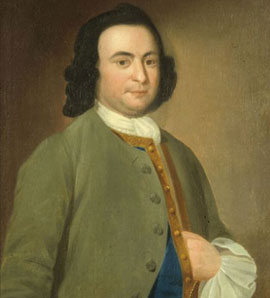
|
| George Mason |
At this point in the proceedings, the Convention was still in a mindset of struggling to unify thirteen sovereign republics; naturally, each one also wanted to be sure the taxation was fairly distributed. Virginia not only wanted its own definition of fair shares, but it also wanted enough power in the House of Representatives to maintain that definition. It wanted to avoid any tampering with slavery, and both demands were now agreed to. Direct taxation of the states, with its inherent apportionment issue, was not explicitly linked, but it is hard to believe it went undiscussed. Except for the District of Columbia and the Territories, which are regulated by Congress in many unique ways, Congress now has no power to impose a direct tax upon a state, or otherwise to pick tax winners and losers. Everyone agreed that Congress needed to be able to levy a limited amount of taxes "for the common defense and the General Welfare", but many delegates were uneasy about the apportionment method used in the Articles of Confederation because short of military force there was no sure way to collect them. Going to war against one of the states for non-payment of taxes must have sounded very unattractive after a recent history of having eleven of the thirteen refuse to pay them. Anyway, we had a deal with regard to slavery. And seemingly for those reasons, Congress now has no real power to impose a direct tax upon a state. Rufus King might not have needed to embarrass everyone with his revealing question if the wording meant "impose a tax directly upon a state", because the Constitution says that of course you can, but as a practical matter, of course, you won't.
At present the issue of apportionment of taxes roils the European Community, although in a slightly different form, and they must find a way to solve it. Germany is unwilling to support Greece, the Netherlands unwilling to support the Belgians, and so on. The poor nations cry "fairness" while the rich nations proclaim "merit and hard work", and it was ever thus. Our founding fathers found the solution was to forbid the taxing of nations, except in proportion to the population. That is, to shift the tax from the national level to the individual taxpayer level. Doing so will not make national jealousies disappear, but here it proved to be sufficient. Texans would still rather lose their left leg than pay taxes to support Oklahoma, but when a dust storm or drought appears, Texans are immediately generous to their neighbors in distress. Within the past decade, a Texas law professor published a law review article denouncing the unfairness of a state with twice the population being forced to pay double the taxes. George Mason would have simply smiled and said, "Of course twice as many people pay twice as much tax. And get twice as many Congressmen, too." That's called square dealing, but square dealing is often not quite enough. Some land is not quite as fertile, some people are not as well educated, one state has more seaports than the other. To bring the scales into balance, something more must be added. In that case, it's best if what is offered has nothing to do with either taxes or congressional representation. That's called diplomacy.
And let's not forget one of the features of taxes. A major reason for national taxes has always been to pay for wars. Less of one usually means less of the other.
The Origin of States Rights, a Rumination
ALMOST alone among the British colonies in America, Pennsylvania's western border was specified in the King's charter of the colony. It was "five degrees longitude west of the point where the eastern boundary crosses the Delaware" [River]; however, its actual location on the ground was not actually marked until 1784. It's a few miles west of the present city of Pittsburgh, located at the forks of the Ohio River, where the Allegheny and Monongahela Rivers join. However, until 1784 it was not a certainty that this complex was within Pennsylvania instead of Virginia. The origin of Ohio is at the only major water gap in the North-South mountains, and the tributary rivers are fairly large. The three merging rivers thus form a nearly continuous water route along the base of the mountain range, from the Great Lakes south to Pittsburgh, or from the Chesapeake Bay north to Pittsburgh, and then to the Mississippi, going past the best topsoil farming land in the world. The forks of Ohio were the great prize of the Seventeenth and Eighteenth centuries, the place where young George Washington himself started the French and Indian War. To include these treasures, it seems vaguely possible that William Penn insisted on having the border of his state safely include the water gap at the beginning of Ohio. Perhaps not, of course, perhaps it was just a sense of tidiness on the part of the ministers of Charles II. The original document stated that the border was a hundred miles east of there, to match where Maryland ended. When the document was returned to Penn by the King's ministers, however, it had the new language.
The existence of this north-south termination of Pennsylvania began to take on a new significance when other states made claims for their land grant to extend to the Pacific Ocean, and the extensions collided with each other. Virginia then developed its territory to include modern Kentucky and West Virginia. That resulted in Virginia's land aspirations veering northward, to include the Ohio Territory west of Pennsylvania's fixed boundary. By the legal standards of the day, Virginia had a fairly good claim to all of the Indian territories, not merely to the west of Pennsylvania, but extending at least to the Great Lakes, perhaps farther. Maryland, Connecticut, New York, and Massachusetts had conflicting claims from an infinite extension of their western boundaries. As a consequence, it was impossible to achieve ratification of the Articles of Confederation for five years. The various states involved were fearful of the creation of a combined political entity might result in a court which would be enabled to rule against their individual aspirations. The stakes were high; the land mass involved would be several times as large as England.
The person who finally broke this deadlock might well have been Robert Morris, who was disturbed that this inter-state dissension was injuring his ability to borrow foreign funds for the Revolutionary War. The internal negotiations took place under wartime conditions, and are poorly researched. No doubt some person deserves credit for bringing this wrangle to a close. Virginia had the strongest claim, New York the weakest. New York gave up its claim first, Maryland was the last, and Virginia the most disappointed. Pennsylvania, unable to make a claim, took the position that the land belonged to everyone, and eventually was mollified by getting a small notch of land extending to the Great Lakes at Erie. It must be noticed in passing that final resolution of the land claims came at the Treaty of Paris ending the Revolution. Benjamin Franklin, soon to become President of Pennsylvania, was the negotiator of the treaty which reflected Pennsylvania's position that the land belonged to all of us, right?
Even without these western land claims, Virginia was the largest and richest of the colonies, and rather easily adopted the attitude that Virginia would be the leader of the new United States. From their viewpoint, the preservation of states rights would enhance Virginia's leading the country. More or less immediately, the attitude of small states like Delaware hardened into resistance that this must not happen. Much otherwise inexplicable behavior also begins to make a sort of sense: the perverse behavior of the Lee family in the Continental Congress, the quarrels within George Washington's cabinet, the relocation of the capital and the dreams of the Potomac as the nation's main portal of transportation, the rise of Jefferson's political party, the obstructionist behavior of Patrick Henry, the Virginia domination of the Presidency for decades, and countless less famous episodes of history -- make more sense as residuals of Virginia's early land aspirations, than as defenses of slavery or philosophical convictions that states were somehow superior to nations. These suspicions are difficult to clarify and impossible to prove. The best way to see some substance to them is to imagine yourself in the Virginia House of Burgesses, politically connected and vigorous, able to imagine your descendants all inheriting a county or two of rich land as a remote consequence of a few glamorous deeds by their Cavalier ancestor.
Robert Morris, Land Speculator
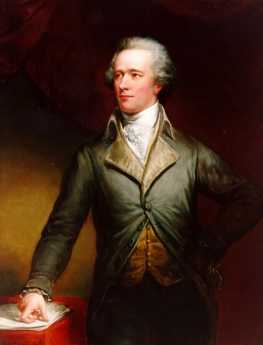
|
| Alexander Hamilton |
IN 1782, Robert Morris the Superintendent of Finance of the United States, produced a paper called "On Public Credit", which was the model for Alexander Hamilton's more famous paper with the same name. His interest in the topic almost surely grew out of the idea of selling America's abundant land to finance the Revolutionary War. It was obviously a tempting idea, but a fairly unworkable one under wartime conditions, particularly since the great abundance of American land depressed its price for long-term speculators, compared with European land. A price of fifteen or twenty cents an acre required huge parcels of land to justify the problems associated with deriving a profit from it as an intermediary, and created a myriad of other problems dealing with the end user; in 1782 it just wouldn't work.
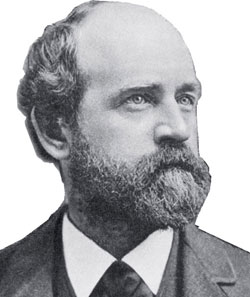
|
| Henry George |
By 1792 it was perhaps workable because the boundaries of the nation were more clear, but generated the problems of a rolling frontier, associated with steep and volatile differentials of price and safety. If the end user was an impoverished immigrant, the seller was necessarily tangled in protracted periods of refinancing. The issues of slave territory and free territory close by generated local peculiarities of land use and optimum parcel size. Those who gave close attention to the complexities of the novel situation could see the close relationship between the credit of the nation, and the value of its land mass, the ultimate definition of what the nation really was. Thus in time, the single tax idea of Henry George would be an idea that kept coming up for discussion, long before Henry George popularized the concept of placing all taxes on immobile land. The nation was the land it owned, and the land couldn't move. So Morris and Alexander Hamilton wrestled with devising ways to base the credit of the nation on its land wealth, without the complexities of doing so directly. In 1782 such ideas were only dreams, but by 1792 a clever person might work out ways to manage it.
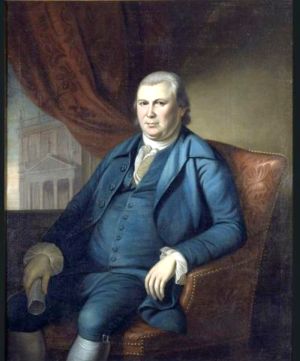
|
| Robert Morris |
As the opportunities of suddenly having undisputed ownership of most of a continent began to clarify, Morris was rearranging his own life. He had accomplished most of his vision of what the nation should be like and had resolved his internal conflicts about the meaning of being a patrician in a democracy, by selling off his business. No matter how strange it may seem to us that being a shipping merchant was disrespectable, while real estate speculation was an acceptable gentleman's occupation, that was apparently how he saw it. His many associations put him in contact with many opportunities, and soon he acquired the parcel of land in upstate New York abandoned by the exterminated Iroquois. Generally called the Genesee territory, the combination of smallpox and General Sullivan's famous march had greatly reduced the tangled arguments about the title to the land, and the sales went very well, netting him roughly $350,000 unadjusted for inflation. If Morris had quit the business right then and there, he had a fair chance of living the rest of his life among the richest men in America.
Lest the impression persist that Morris got into financial difficulty entirely by real estate speculation, a letter he wrote to Gouverneur in 1790 celebrating the Genesee agreement exulted, "This bargain will not only be the means of extricating me from all the embarrassments in which I have become involved, but also the means of making your Fortune and mine."
In 1794 the Asylum Co. was founded by U.S. Senator Robert Morris and John Nicholson, Pennsylvania Comptroller General, to develop and sell lands in northeastern Pennsylvania. Although it was rumored that Marie Antoinette was to be housed in the 1600 acres on the North branch of the Susquehanna River near the present Towanda, she had actually already been executed in late 1793. In 1795 Nicholson succeeded to Morris' interest, and three years later Morris was put in debtor' prison. In 1802, Napoleon invited all French emigrants to come home, and only a few stayed behind in Azilium. The Asylum Co. soon dissolved.
REFERENCES
| Robert Morris: Financier of the American Revolution: Charles Rappleye: ISBN-10: 1416570926 | Amazon |
Chief Justice John Marshall Enters (Kettledrums and Crashing Cymbals)
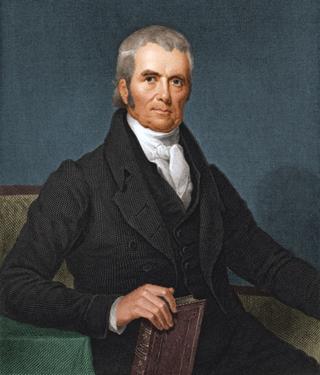
|
| Chief Justice John Marshall |
Chief Justice John Marshall first took his seat at the opening of the new term, in Washington the new capital, on Wednesday, February 4, 1801. It was also at the end of Philadelphia's twenty-five-year reign as the center of the country, and twelve-year Federalist domination of national power, except for the Supreme Court. The Presidency, both houses of Congress, and the federal bureaucracy were in the hands of Jefferson's party. Only the dwindling life tenure of federal judges permitted some power to remain in the hands of Federalists for several more decades. John Adams the defeated Federalist President realized this very well and hastened to fill any remaining vacancies before he left the office. The Jeffersonian Republicans understood what was happening, resented it, and referred bitterly to the "Midnight Judges". We discuss the Marshall Court in some detail because it leads to the Andrew Jackson escapade in high finance, which ultimately merges with evolving financial history back in Philadelphia at the crashing termination of "Biddle's Bank".
Marshall was himself a Midnight Judge in the sense he was the retiring (Federalist) Secretary of State, immediately appointed by Adams to the duties of Chief Justice. He was himself the office of the Adams Administration who neglected to deliver the certificate of appointment of Justice of the Peace to Marbury, who promptly sued James Madison the incoming Secretary of State, to give him his signed and ratified certificate. Jefferson the incoming President of the United States, ordered Madison not to give it to Marbury. The behavior of all these high officials was unbecomingly petty since it was within the power of several of them to end the tangle in simple ways. To make matters still more infuriating, Jefferson delivered a beautiful, heart-warming First Inaugural Speech, full of forgiveness and invitation to compromise ("We are all Republicans, we are all Federalists"), which his own intransigence before, during and afterward transformed into a Federalist by-word for hypocrisy exceeding anything in Shakespeare. It's hard to say whether it makes these performances more or less bearable to learn that Marshall and Jefferson were first cousins. In any event, Marbury v. Madison was the first example of a Supreme Court ruling that a law was unconstitutional. The legal point on which this titanic Constitutional point rested, however, seems mostly a minor procedural error, leaving poor Marbury's problem as a footnote, Marshall's negligence uncriticised, Jefferson's interference unimpeached, and the whole nation's opinion of its governance sadly disappointed. On vivid display was the dominance of petty private grievances of our most venerated Founding Fathers, in an era when a public policy seemed most in need of getting the highest priority. In 1800, the confluence of names alone suggested crisis: Aaron Burr, Robespierre, Bonaparte, Hamilton. It was certainly a dramatic way for John Marshall to make an entrance on the public stage, but compared with the tie-vote election of 1800, and the Trial of Aaron Burr the Vice President for treason, it scarcely seemed worth public notice.
Within legal circles, professional achievements of Judges are ranked by a different standard which seems obscure to both the public and historians. Oliver Ellsworth, Marshall's immediate predecessor, nowadays seems most highly esteemed in the legal profession for revising the nature of judicial opinions. Prior to Ellsworth, the seven justices gave their opinions individually and serially. Ellsworth simplified this to majority and minority opinions of the entire court, with individual concurring opinions if insisted upon. The Chief Justice selects who will write the majority opinion, and generally writes it himself if he is in that majority. Effectively this makes the Chief Justice the voice of the court in important cases. Ellsworth retired for reasons of health before he got many advantages from this change, so the full force of Chief Justice power began to appear with the voice of Marshall. John Marshall then added his own twist, which was the obiter dictum .
Judges often make little speeches from the bench, which sometimes are on the public record. If they are directly related to the decision or opinion, they have some force as precedents to lower or later courts. In other circumstances obiter dicta have little consequence, but Marshall recognized there was a very big difference when an obiter issued from the pen of the Chief Justice of the United States, speaking for a majority of the Supreme Court. All Judges of every Federal Court and the Judges of State Courts in many situations are then on notice that the obiter is the opinion of that court to which all appeals could ultimately be made. It would be a brave judge who ignored this warning, and only a foolish lawyer would bring a case which flouted it. John Marshall had found a way to legislate what was effectively the Law of the Land, one without the possibility of a veto while he was still on the bench. He had not been made an Emperor, because the power of his dicta would depend on how combative he and fellow justices chose to be about it. But, looking ahead, Andrew Jackson would have been showing a profound lack of subtlety about the way things really are, had he issued his famous jibe that "John Marshall has made his decision. Now let him enforce it." Jackson's most distinguished biographer Robert Remini maintains Jackson never said it, and prudently so.
Marshall was also prudent when he had to be, and acting as a Moses was careful to confine his Commandments to his mandate, which was the American law. Some of his obiter dicta might have been ignored as coming from the most powerful Federalist of his day, a former chief of the Virginia Federalist party, but with the passage of time several of these opinions have passed from statements of early Nineteenth century judicial policy into becoming the accepted American view of things. It is reasonably safe to say the following three dicta anticipate the coming of the Civil War, define its issues, and survived that war, reconfirmed:
The Federalist View of the Constitution. The Constitution is an ordinance of the people of the United States, and not a compact of States.
Enumerated powers. While the government which the Constitution established is one of the enumerated powers, as to those powers it is a sovereign government, both in its choice of the means by which to exercise its powers and in its supremacy over all colliding and antagonistic powers.
States Rights. The National Government and its instrumentalities are present within the States, not by the tolerance of the States, but by the supreme authority of the people of the United States.
 Article 1, section 10, clause 1 No State shall enter into any Treaty, Alliance, or Confederation; grant Letters of Marque and Reprisal; coin Money; emit Bills of Credit; make any Thing but gold and silver Coin a Tender in Payment of Debts; pass any Bill of Attainder, ex post facto Law, or Law impairing the Obligation of Contracts, or grant any Title of Nobility. 
|
| The Contract Clause |
The Sanctity of Contracts. In a famous dialogue between James Madison and Roger Sherman of Connecticut, Madison identified the erratic and high-handed behavior of state legislatures as one of the main reasons to convene the Constitutional Convention. He was describing a long list of behaviors which included reclaiming sales which had been regarded as permanent, reversing statutes, interfering with executions or other verdicts of courts, intervening in private controversies, calling for new hearings, introducing new rules of evidence after a trial had begun, and so forth. To a considerable degree, these abuses grew out of a collision between the undeniable right of a later legislature to change the rules which had been established by an earlier legislature, balanced against the disruptive effect of making any changes in rules, no matter how beneficial. For their part, the courts were in need of restraining themselves with doctrines like stare decisis , while reserving the right to make desirable changes in the law after serious consideration. They were also in need of establishing best practices and insisting they be followed, eventually evolving into the concept of due process , which eventually became Constitutional doctrine by the XIV Amendment. The legislative equivalent of these judicial principles was seen in laws passed after the crime had been committed ( ex post facto ), special legislation for one case an exception to general rules, and a wide variety of other unfair practices which had grown up. Accordingly, Article 1, section 10, clause 1 of the Constitution was written but often evaded in practice by sly legal tricks with Latin names. Examples of the broad principles might be stated in the constitution, but it required an experienced Judge to recognize the many evasions for what they were and organize a set of rules to implement the Constitutional principle. Marshall appointed himself in that role and systematically integrated his judicial counter-attack into a coherent code of moral conduct, bit by bit in obiter dicta.
We should let the French traveling correspondent, Alexis de Tocqueville, pass the final judgment on Marshall's effort:
"Scarcely any political question arises in the United States which is not resolved sooner, or later, into a judicial question. Hence all parties are obliged to borrow in their daily controversies the ideas, and even the language peculiar to judicial proceedings. . . The language of the law thus becomes, in some measure, a vulgar tongue; the spirit of law, which is produced in the schools and courts of justice, gradually penetrates beyond their walls into the bosom of society, where it descends to the lowest classes, so that at last the whole people contract the habits and the tastes of the judicial magistrate."
Lazaretto

|
| David Barnes |
DAVID Barnes, professor at the University of Pennsylvania, kindly visited the Right Angle Club with an interesting talk about the Lazaretto, the oldest quarantine station in the Western hemisphere, and the sixth oldest in the world. It was built in 1800 responding to the Yellow Fever epidemic of 1793, followed by those of 1797, 1798, 1799, 1820, 1853, and 1870. If an incoming ship had a case of Yellow Fever on board, the patient was institutionalized at the Lazaretto and the ship captain had to pay for the care until the patient recovered, or until he didn't. Since we now know that Yellow Fever is transmitted by mosquito bites, it probably didn't do much good, and by locating the Lazaretto in a swamp, it may actually have promoted the spread of the disease. It thus fits into the story of Dr. Benjamin Rush hastening the death of his Yellow Fever patients by bleeding them of several pints of blood, as well as the construction of the Philadelphia Water Works to purify the drinking water, which we can now she had nothing to do with the disease, either. However, the waterworks were a marvel of engineering and must have saved many lives from Typhoid Fever. As recently as 1970, I can remember cases of anthrax being brought to the port on Pakistani ships, so quarantining and quarantine stations are useful ideas, some of the time.
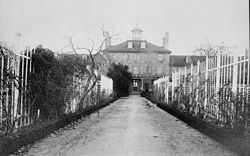
|
| Philadelphia Lazaretto |
The first Lazaretto was built on the Aegean Sea at Venice, around 1450. There is some dispute about the name, which is said to come from the patron saint of lepers, St. Lazarus. The followers of St. Nazareth maintain the present name is a corruption of Nazaretto however, since St. Lazarus was the name of the church on the island where it stands. It seems most likely that the original Venetian quarantine hospital was responding to the plague, which would have benefitted greatly from isolation, although the rats and mice probably quickly found a way around their problem. Benjamin Rush thought that Yellow Fever was transmitted by the overpowering stench of rotting coffee beans, which is quite wrong as Walter Reed later showed, but at least it would lead to the idea that quarantine might be useful. Historically, the rumors and suppositions about this matter were useful to the Virginia delegates to the Constitutional Convention, who used it to promote their campaign to move the national capital to Washington, D.C.
The Schuylkill empties into the Delaware River at a sharp bend in Delaware, which slows the river and causes silt to be dumped there. William Penn had earlier decided to locate his new colony at Chester, just below the bend. However, he soon saw that it was more defensible to locate Philadelphia on the upstream side of the mud flats, as it proved to be in the Revolutionary War. Fort Mifflin was located just above the mud flats and could be kept supplied by flatboats coming down the Schuylkill from Valley Forge and Reading, the arsenal city of the Revolution. On Benjamin Franklin's suggestion, the channels between the mud flats were blocked by the chevaux de fries, underwater spiked contraptions which were much like the blockages to the entrance of parking lots. On the Jersey side of Delaware was Ft. Mercer at what is now called National Park. It was a formidable defense which almost ended the War by starving the British troops who had occupied Philadelphia from the rear via Germantown but were long unable to get past Fort Mifflin with their fleet, coming upriver. Most of South Philadelphia was a swamp, and there are many reports of flocks of swans paddling around the entrance of the Schuylkill. Hog Island became a shipyard, then a Naval Base. And then the airport was built on the mudflats, pretty much-obliterating everything else. There is the talk of making this area into the main intermodal transportation hub of the east coast, since ocean shipping, air transport, interstate highways, and railroad are all crowded together, quite close to the urban centers.
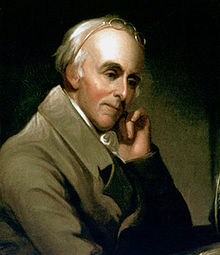
|
| Benjamin Rush |
Benjamin Rush, a signer of the Declaration of Independence, was still active at the Pennsylvania Hospital in 1800. It was still the only general hospital in America and the model for much of subsequent American medicine. One striking memento of that connection at the Lazaretto is the cupola on the center building, which is very similar to the cupulas on the roof of the building at 8th and Spruce Streets. The brickwork is also Flemish bond. The ten-acre site of the Lazaretto is very accessible, except perhaps for the suspicious Tinicum Township police. However, it has long been a tradition to have a banquet and picnic at the Lazaretto at the beginning and end of the quarantine season, roughly June 1, and October 1. Yellow Fever shots are not required.
Muddle: The War of 1812
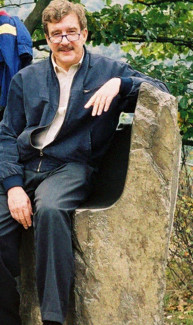
|
| H.G. Callaway |
HOWARD Callaway is an old friend and an expert historian of the War of 1812. This is the two hundredth anniversary of that war, so Howard is in demand as a speaker. At a recent meeting of the Right Angle Club, he gave a fascinating recital of his analysis of the reasons for the war, and its subsequent upheavals in American politics. The audience at the Club stayed well beyond the allotted hour to ask questions and finally had to be sent home by the moderator. We will here try to summarize his views fairly.
American impressions of this war come largely from Henry Adams, who wrote a nine-volume history of it, concluding it was a senseless muddle. Henry Adams however, was the grandson of John Quincy Adams, and the great-grandson of John Adams, both of whom were active participants of the event, its causes, or its consequences. He later killed himself, having displayed fugues of depression in his autobiographical Education of Henry Adams. No matter how serene his writing style, you have to be a little careful about the views of such an involved person. New England hated this war almost universally, not a single Federalist congressman or Senator voted for it, and the Federalist political party essentially dissolved as a consequence of it. New England even considered secession. In particular, maritime New England hated the two-year embargo on European trade which Thomas Jefferson had imposed as a measure short of war. Since Jefferson had stripped the Army down to 3000 soldiers and the Navy down to a single ship -- he didn't have many choices. Great Britain at that time had eight hundred ships in its navy. When it came, the war was mainly supported by the more rural South and West of the nation. It was the war of the "republican" political party of Jefferson and Madison, actively demonstrating that Virginia had defeated the Federalists and now would dominate American politics for decades. Regardless of details, the War of 1812 made it clear that New England was not the central essence of America any longer; the rest of the country would not follow its lead.
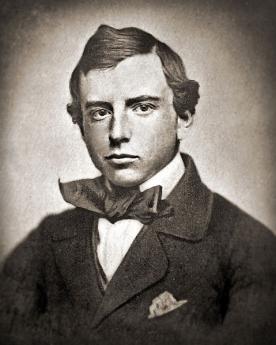
|
| Henry Adams |
His opponents called it "Mr.Madison's War", and the bad management of it certainly damaged the later reputation of the principal author of the Bill of Rights, perhaps the Constitution. It's pretty hard to maintain the image of a Founding Father when you get us into a war that could not be won and was not even conducted well. Whatever Madison's early skill as a political philosopher, his later execution as its chief officer was a shambles. He was indeed a clever politician, never completely revealing his true beliefs, so it is a question how much he was really in favor of the war, and to what degree he could merely see how the wind was blowing. It might be argued, for example, that a supporter of the constitutional intent that Congress would declare wars, the president would only command them, might well have been yielding reluctantly to his party's clear wishes. Howard does not think so.
There was no time to expand on the evidence, but our speaker is convinced that Madison and the whole "Republican" party were anxious to sever the cultural ties to England and turn the nation to looking Westward. Certainly that was Jefferson's view, and certainly, the nation entered a century of turning its back on Europe, England in particular, becoming in one word, isolationist. That's the sort of grand strategy which might offer coherence to the subsequent Wilson and Franklin Roosevelt reversals of attitudes, which contain a major element of anglophilia.
Quite a lot to think about, considering what a bumbling rout the War seemed to be in 1812.
REFERENCES
| Alexander James Dallas: An Exposition of the Causes and Character H.C. Callaway ISBN-13: 978-1906716288 | Amazon |
Evo-Devo
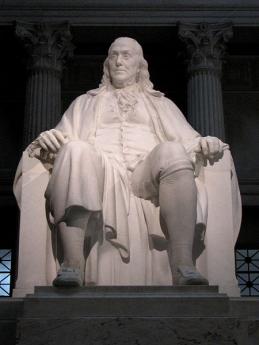
|
| The Franklin Institute of Philadelphia |
THE oldest annual awards for scientific achievement, probably the oldest in the world, are the gold medals awarded by the Franklin Institute of Philadelphia for the past 188 years. Nobel Prizes are more famous because they give more money, but that in a way involves another Philadelphia neighborhood achievement, because Nobel's investment managers have run up their remarkable investment record while operating out of Wilmington, Delaware. In the past century, one unspoken goal of the Franklin Institute has been to select winners who will later win a Nobel Prize, the actual outcome more than a hundred times. That likelihood is one of the attractions of winning the Philadelphia prize, but in recent years some Nobel awards have acquired the reputation of being politicized particularly the Peace and Literature prizes. Insiders at the Franklin are positively fierce about avoiding that, so the Franklin Institute prizes have become known for recognizing talent, not merely fame.

|
| Dr. Jan Gordon, Dr. Sean Caroll, and Dr. Cliff Tabin |
Within Philadelphia, the annual awards ceremony is one of the four top social events. The building will seat 800, but reservations are normally all sold out before invitations are even put in the mail. A major source of this recent success is clear; in the past twenty-five years, the packed audience is a star in the crown of Dr. Janice Taylor Gordon. This year, she hurried back from a bird-watching trip in Cuba, just in time to busy herself in the ceremonies where she sponsored Dr. Sean Carroll of the Howard Hughes Foundation and the University of Wisconsin, for the Benjamin Franklin medal in the life sciences. Carroll's normal activities are split between awarding $80 million a year of Hughes money for improving pre-college education from offices in Bethesda, Maryland, and directing activities of the Department of Genetics in Madison, Wisconsin. His prize this year has relatively little to do with either job; it's for revolutionizing our way of thinking about evolution and its underlying question, of how genes control body development in the animal kingdom. Evolution and Development are academic terms, familiarly shortened to Evo-Devo.

|
| Dr. Carroll's Butterflies |
My former medical school classmate Joshua Lederberg, also a resident of Philadelphia, was responsible for modern genetics, demonstrating linkages between the DNA of a cell, and the production of a particular body protein. For a time it looked as though we might confidently say, one gene, one protein, explains most of the biochemistry. In the exuberance of the scientific community, it even looked as though deciphering the genetic code of 25,000 human genes might explain all inherited diseases, and maybe most diseases had an inherited component if you took note of inherited weaknesses and disease susceptibilities. But that turned out to be pretty over-optimistic. Lederberg got into an unfortunate scientific dispute with French scientists about bacterial mating and now appears to have been wrong about it. But the most severe blow to the one gene, one protein explanation of disease came after the NIH spent a billion dollars on a crash program to map out the entire human genetic code. Unfortunately, only a few rare diseases were explained that way, at most perhaps 2%. Furthermore, all the members of the animal kingdom turned out to have pretty much the same genes. Not just monkeys and apes, but sponges and worms were wildly different in outward appearance, but substantially carried the same genes. Even fossils seem to show this has been the case for fifty million years. Obviously, animal genes have slowly been added and slowly deleted over the ages, but in the main, the DNA (deoxynucleic acid) complex has remained about the same during modest changes in evolution. Quite obviously, understanding the genome required some major additions to the theory's logic.
In late 1996, three scientists met in Philadelphia for a brain-storming session. Sean Carroll had demonstrated that mutations and perhaps an evolution of the wing patterns of butterflies and insects took place during their embryonic development, and seemed to be controlled by the unexplored proteins between active genes. Perhaps, he conjectured, the same was true of the whole animal kingdom. Gathered in the Joseph Leidy laboratory of the University of Pennsylvania, the three scientists from different fields proposed writing a paper about the idea, suggesting how scientists might explore proving it in the difficult circumstances of nine-month human pregnancies, in dinosaurs, in deep-sea fish and many remote corners of the animal kingdom. Filling yellow legal pads with their notes, the paleontologist (fossil expert) Neal Shubin of the University of Pennsylvania, genetic biologist (Sean Carroll of Wisconsin), and Harvard geneticist Cliff Tabin worked out a scientific paper to describe what was known and what had to be learned. The central theme, suggested by Carroll, was that evolution probably takes place in the neighboring regulatory material which controls the stage of life early in the development of the fetus, and these regulatory proteins consist of otherwise inactive residual remnants of ancient animals from which the modern species had evolved. As the fetus unfolds from a fertilized egg into a little baby, its outward form resembles fish, reptiles, etc. And hence we get the little embryonic dance of ancient forms morphing into modern ones. In deference to the skeptics, it would have to be admitted that the physical resemblance to adult forms of the ancient animals is a trifle vague.
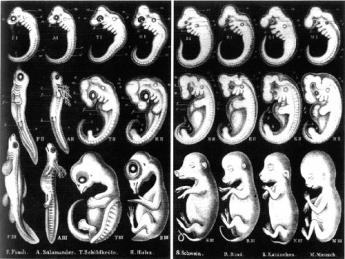
|
| Haeckel's drawings of vertebrate embryos, from 1874 |
Embryologists have long argued about Ernst Haeckel's incantation that "Ontology recapitulates phylogeny", which is a fancified way of saying approximately the same thing. Darwin's conclusion was more measured than Haeckel's and explanations of the phenomenon had been sidelined for almost two centuries. But it seems to be somewhat true that fossils which paleontologists have been discovering, going back to dinosaurs and beyond, do mimic the stages of embryonic development up to that particular level of evolution, and might even use the same genetic mechanism. The genetic mechanism might evolve, leaving a trail behind of how it got to its then-latest stage. Borrowing the "Cis" prefix ("neighboring") from chemistry, these genetic ghosts have become known as Cis-regulatory proteins as the evidence accumulates of their nature and composition. Growing from the original three scientists huddled in Shubin's Leidy Laboratories in 1996, academic laboratories by the many dozens soon branched out, dispatching paleontologists to collect fossils in the Arctic, post-doctoral trainees to collect weird little animals from the deserts of China, and the caves of Mexico, everywhere confirming Carroll's basic idea. Even certain forms of one-celled animals which occasionally form clumps of multi-celled animals have been examined and found to be responding to a protein produced by neighboring bacteria which induces them to clump -- quite possibly the way multi-cellular life began. Many forms of mutant fish were extracted from caves to study how and why they developed hereditary blindness; the patterns of markings on the wings of butterflies were puzzled over, and the markings on obscure hummingbirds. The kids in the laboratory are now having all the fun with foreign travel, while the original trio finds themselves spending a lot of time approving travel vouchers. Many fossils of animals long extinct have been studied for their evolution from one shape to another, especially in their necks, wings, and legs. Some pretty exciting new theories emerged, and are getting pretty well accepted in the scientific world. At times like this, it's lots of fun to be a scientist.
Running the Opera

|
| The Kimmel Center |
MICHAEL Bolton, Vice President of the Opera Company of Philadelphia, recently addressed the Franklin Inn Club, giving one of the more informative descriptions we have had about the inner workings of a philanthropic entertainment. We are very grateful to him for being so frank and open about an important perplexing issue.
The Academy of Music was originally designed as an opera house but served for many years as the home of the Philadelphia Orchestra as well. We formerly had two Opera companies, but the audience couldn't support two before they merged. Things are now definitely looking better for opera in Philadelphia; the recent presentation of La Boheme , for example, was one of the high points of American opera in recent memory. However, that achievement has been made with struggles and a certain amount of patchwork. For example, the Academy of Music is owned by the Philadelphia Orchestra, which now has its home in the Kimmel Center, and rents the Academy building to the Opera. It's hard to know who makes out better in this circular arrangement, but there is little doubt the Opera Company is pinched by the rental fee of $45,000 per performance, which probably partly goes to subsidize some of the financial troubles of the Orchestra that have recently been in the papers. It ends up costing a million dollars to put on a performance at the Kimmel Center, nearly two million to put one on in the Academy.
It's true that our opera costs (and ticket prices) are less than in many other cities, most notably the Metropolitan Opera in New York. But it's more important to know that only half the budget is spent on performers. When you hear of the prices paid to performers, particularly soloists, it's easy to imagine this is the main source of financial strain. But the issue is not what people are paid, but rather who is overpaid. At the top of the list has to be the stagehands, whose hourly wages Mr. Bolton declined to specify. But I recently had the opportunity to overhear a conversation on the train between a stagehand and his friends. With great glee, the gentleman described how few hours he worked, how little needed were his services, and how soon he expected to retire. Even making some allowance for boastfulness, this recital was a little hard to take on the day after I had sat in a hundred-dollar seat.
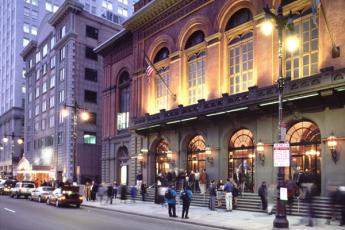
|
| The Academy of Music |
Philadelphia wants to put on more and better operas. There are so many applicants for positions that the junior nonfamous singers are charged $300 by the agents, just to have an audition. Voice teachers command several hundred dollars an hour to coach aspiring performers. There is a great oversupply of performers in the local market; the problem is inadequate demand, resulting in part from high prices. No doubt this situation will correct itself, partly, when the economy recovers. Unfortunately, however, some of us old-timers can remember the Japanese recession which is in its seventeenth year, and our own Great Depression of the 1930s, which lasted fifteen.
My own suggestion is that the Italian and Central European immigrants of the early Twentieth century are disappearing, and their children have become Americanized. What we now need is to make a conscious effort to Americanize classical music, especially opera. American singers no longer adopt European stage names; it's more likely to be the other way. Let's recall that America was founded just eight blocks from the Academy. Beaumarchais, the one who wrote the Barber of Seville, ran a Revolutionary gunpowder smuggling ring in conjunction with Robert Morris. Major Andre and General Burgoyne were authors and producers of theater. If librettists get desperate, there is always Benedict Arnold the estranged hero of the Battle of Saratoga. And George Washington with tears on his cheeks as he gave orders for Major Andre to dance on the end of a rope. There's plenty of material for grand opera in this city. And most of it is even true.
Bones in Duffy's Cut
THE Right Angle Club was recently honored by a talk by Professor William Watson, who teaches history at Immaculata University in Malvern, Pennsylvania. Although it is hard to find much memorial recognition of it, Immaculata is on the site of the Battle of the Clouds, of the Revolutionary War. Washington's army was retreating from the advancing British invaders from Elkton, Maryland, who were headed for the occupation of Philadelphia, in 1778. Although Washington had been outflanked at the biggest battle of the war at Brandywine Creek, he regrouped near Paoli and prepared to defend Philadelphia where the Continental Congress convened. A tremendous rainstorm, possibly a hurricane, hit the two armies as they formed for battle, and everyone's gunpowder was soaking wet. By mutual consent, the battle was called off. The Malvern area was also the site of the Paoli massacre, where General Anthony Wayne overestimated his understanding of the local area, and British troops attacked at night with orders to use bayonets, only.

|
| Duffy's Cut |
Professor Watson was, however, speaking about another massacre in the area, at Duffy's Cut. The Cut now belongs to Amtrak, but it was originally built in 1832, from Columbia on the Susquehanna River eastward, as the Philadelphia and Columbia RR, using horse-drawn rail carriages. That essentially means it went from Scotch-Irish Cumberland County, through the Pennsylvania Dutch territory, to Quaker Chester County and Federalist Episcopalian Philadelphia. The builders of the railroad contracted out mile-long sections of the construction to contractors, one of whom was Philip Duffy, who naturally imported southern Irish laborers to do the digging. As a sidelight, Duffy lived in Port Richmond, where he was buried, allegedly a very rich man. His work site was nearly 60 miles east of Columbia, the most expensive contract on the railroad because it involved more cutting and filling of the hilly countryside: Duffy's Cut.
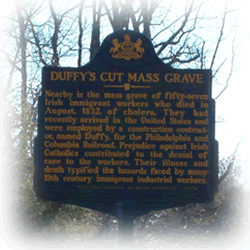
|
| Duffy's Cut Marker |
Sanitary conditions at the dig site were probably pretty primitive, ideal for the spread of fecal-borne illnesses like cholera (and hepatitis, amoebic dysentery, Salmonella, and Shigella), which are characteristic of concentration camps, prison camps, army encampments, and the like. Many later epidemiologists now trace the introduction of cholera to Canada, with downward spread along the Susquehanna, but fifty years before Pasteur there was no sure way to make the diagnosis and no knowledge of its epidemiology. The Irish encampment at Duffy's Cut might just as well have died of bacillary dysentery, but it would have made little difference to know; they just died, and it was said to be cholera that did it. It was probably some kind of fecal contagion, but modern archaeology has recovered eight or ten skulls with bullet holes at the site, and historical investigation of the more usual type has recovered letters by President Clement of the Pennsylvania Railroad, ordering a cover-up. The rest of the story is necessarily conjectural, and we have to be uncertain whether Clement was concerned about hushing up cholera in the region, or ethnic riots, and if so whether he wanted to avoid scaring away replacement laborers, or avoid stirring up local antagonisms. Professor Watson describes considerable difficulty with getting cooperation from politicians and news media in pursuing his studies, where it is hard to see any non-railroad motive, except the motive of wanting to let sleeping dogs lie.
If so, it is a serious concern. It must be recalled that the Scotch-Irish of central Pennsylvania were located there as a result of the activities of James Logan, the agent of the Penn family. The Penns wanted to sell land to settlers and felt that fear of hostile Indians was inhibiting immigration. Logan, who was himself a Scot from Northern Ireland, suggested that the protestant Scotch Irish of that region were tired of combating their Catholic neighbors to the south, and were definitely the equal of the Indians in combativeness. This is the reason the Scotch Irish of Pennsylvania were located to the west of the German settlements of Dauphin and Lancaster Counties. It is also the cause of numerous clashes with the Indians (the Paxtang Boys), the Connecticut invaders of the three Pennamite Wars, and most notably -- the Irish Catholic Molly Maguires of the Pottsville region. Throughout all of these overtly military disputes ran the readily observable fact that the Scottish tribes were accustomed to guerrilla warfare in the woods. They mainly are responsible for winning the Revolutionary War, at least in the Appalachian regions stretching as far to the south as Georgia. They leave us a heritage of bagpipes, country music, very rough football, and airplane pilots. Unfortunately, rough behavior provokes rough behavior in return, and much of the unfortunate features of the labor conflicts of our national politics can be traced to the scars and antagonisms of the Molly Maguire episode of railroads and coal mining. This may or may not have been on Clement's mind when he tried to suppress the news of Duffy's Cut massacre, but it should have been, and to some extent it probably was.
There is no excuse for shooting people in the head or killing them with an ax. But the sixth or seventh generation descendants of the victims are urged to reflect that a campful of male laborers far away from home are apt to exhibit unfortunate behaviors. Remember that no one knew the cause of cholera, but it was new, and it certainly looked contagious. The laborers may or may not have brought it with them, but somebody introduced it to the region, and it looked as though the contagion would continue to spread as long as the laborers continued to be there. There might well have been some unfortunate economic incentives at work, like the disappearance of the Conestoga wagon industry among the Pennsylvania Dutch when the railroad came through. And the obvious concern of the railroad owners that the region has a peaceful, healthful, reputation. The almost total approval of slavery by the Pennsylvania Irish during the Civil War provoked Lincoln to send ten thousand troops to the area during the Civil War. And on, and on. There is almost no part of this region which does not have some remote history of savage behavior. Let's be careful not to stir it up.
Breaking the Buck

|
| Walt Bettinger |
WHEN mysteriously crashing financial markets caused transactions to freeze in terror in 2008, no one was brave enough to explain what had happened, because no one was sure. It had happened before and in many nations, but no comprehensive theory was acknowledged to exist for all such crises, and certainly no coherent explanation existed for this one. That is an assessment some people might dispute, of course. But during the worst of the crisis, chairmen of major financial houses, professors of economics, and assorted other notables were asked by the news media to explain the situation, and most of them confessed they really didn't know. As the crisis continued, tentative partial explanations were offered, and eventually, political partisans or competitors were emboldened to assign blame to indignant participants in various financial trades, apparently using the logic that if no one really knew the answer, then everybody was permitted to offer one. Gradually, however, some serious theories have been announced, along with reasonably credible evidence, but no more than that. After the dust had settled somewhat in November 2012, Walt Bettinger published an article in the Opinion pages of the Wall Street Journal which plausibly helps explain a piece of it.
Mr. Bettinger is the CEO of Charles Schwab Corp., which owns several large money market funds, and he credibly offers a theory about the money market part of it. Briefly, it is that large institutions with both sizeable investments in money market funds, as well as strong computer and mathematical resources, were in a position to withdraw their investments during the days of chaos, whereas smaller public investors have to wait until the end of the trading day to learn that a fund had abruptly developed too few assets to justify paying out a dollar for every dollar's worth of obligation. That is, in a "mark to market" situation there weren't enough reserves to cover the liabilities. If the public became aware of this situation, it might suddenly withdraw its deposits and throw the fund into bankruptcy; that is, it might start a run on the bank. In the past, this sort of thing has happened to money market funds from time to time, and the institution which owns or sponsors the money market fund has -- so far -- supplied its own money to prevent potential disaster from a bank run. However, in a serious crash with uncertain causes, someday that might not be their choice or their assets might not be sufficient to stop the run. The consequences are uncertain, but the dangerous potential is clear.
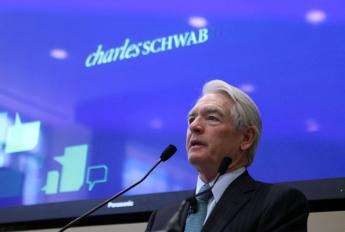
|
| Chuck Schwab |
The remedies for this situation might well be numerous, but the simplest one would be to isolate large investors from small ones by setting a top limit for large accounts, perhaps even automatically transferring large accounts to a large-account fund at the instant the account exceeds some limit. Apparently, similar proposals have been made privately, and there is opposition whose validity must be addressed. However, in the confines of an Op-ed article, a fully exhaustive discussion of a technical proposal is not possible. Ideally, this sort of proposal could be adopted privately, using the advance consent of the two involved parties, the bank, and the big customer. No doubt there is some legitimate concern that widespread publicity might trigger unfortunate legislative over-reaction. After all, most members of the public are unaware that "breaking the buck" is even a possibility. If the possibility of a run can be eliminated by skipping the alarming discussion of whether it potentially exists, or how serious it might or might not become, it would be a mercy. It only seems to be required that the parties agree it is a risk worth avoiding.
Conowingo

|
| Conowingo Dam |
IT was once a major hazard of travel between Philadelphia and Virginia, to cross the Susquehanna River along the way. The river is wide at the top of Chesapeake Bay, and the cliffs are high on both sides. Consequently, the cute little towns of Port Deposit and Havre de Grace grew up as places to stay in inns overnight, perhaps to throw a line into the water and catch your breakfast. Today, these little towns can be seen to have millions of dollars worth of cabin cruisers and sailboats at anchor, at least during certain seasons of the year. In 1928 the Conowingo Dam was built about ten miles north of the mouth of the river in order to harness the water power, and the Philadelphia Electric Company put a power station there as part of the dam, to generate electricity for Philadelphia. It doesn't seem so long ago, but it gave a mighty boost to the electrification of Philadelphia and its industries at the end of its industrial decline from 1900 to 1929. Unfortunately, competitive forms of power generation have now reduced the dam's output of electric power to periodic bursts during the day, and Philadelphia no longer enjoys a reliable cheap water-powered electricity advantage. Coal and nuclear came along, and now shale gas looks like the coming future.

|
| Bald Eagle Fishing |
Although water power could be claimed to be not merely cheap but environmentally friendly, the unvarnished fact is fish get caught in the turbines and rather chewed up by being sucked from the tranquil lake on the upside, emerging at the bottom as a diced fresh fish salad. That attracts seagulls and other fish lovers to the base of the dam. Some fish escape the meat grinder and merely are stunned by the experience, floating downstream to be attractive to eagles, turkey vultures, hawks, and owls. The consequence is that many thousands of gulls sit on the downside of the dam, while hundreds of turkey vultures and eagles sit on the higher levels of the power generation apparatus. And hundreds of bird-watching nature lovers stand on the southern shore below the dam, poised with many thousands of dollars worth of camera equipment and binoculars. If you don't have a pair of binoculars, your visit there will certainly be substandard. Lots of fishermen are there, too, but depending on the waves of spawning fish at different seasons of the year; shad is particularly favored. You can now begin to see the prosperity of Port Deposit and Havre de Grace has a wider variety of attractiveness than merely sailboating and crabbing. There is, however, a large and ominous yellow warning sign.
The sign says you are standing on a riverbank where the water can suddenly rise without warning; if the red lights start blinking and the warning siren starts honking, immediately gather up your tripods and head for higher land. It looks pretty peaceful, however, and the people with tripods are mostly chatting happily with their friends. It can be pointed out, however, that about two hundred bald eagles are perched on the superstructures roundabout. Cameras are mostly digital these days, attached to the rear of a telescopic lens three feet long, and when they shoot bursts of exposures they sound like a machine gun. So, the bird photographers follow a swooping eagle eagerly, shooting away and hoping to catch the bird in an attractive pose, throwing away the rest of the pictures. Good shots are called "keepers", which the photographer is happy to show onlookers on the rear view screen of the camera/machine gun. More sedate bird watchers carry binoculars made in Germany or Switzerland, which cost thousands of dollars and produce really spectacular images. It's unclear whether all this expenditure is worth it, but there is little doubt in the bird lovers' minds you are wasting significant parts of the trip without some kind of binocular.
Suddenly, ye gods, the lights start to flash and the siren starts to honk loudly. Not knowing exactly what to expect, first-time visitors head for the hills. The old-timers with a Gatling gun on a tripod are much more casual, picking up their apparatus and scuttling several feet up the river bank. The birds seem to know what the signals mean, scramble into the air, or start to arrive from far perches. The electric company seems to have received a notice that more electric power generation is needed, so the gates at the bottom of the dam are lifted and water gushes forth; the water does indeed rise rather rapidly. The birds divide themselves into two groups: the gulls' circle in a thick spiral at the base of the dam, while the eagles and vultures circle independently in a second spiral, several hundred yards below the dam. One group looks for fish salad, and the other group prefers stunned whole fish. Photographers however much prefer the eagles downstream, circling and then swooping to the water's surface to grab a wiggling fish and running off with it. Some of the bigger bullies prefer to let others do the fishing, simply swooping to steal the fish. Ratta-tap-ratty tap goes the digitals. After twenty minutes it is all over, and the birds seem to realize it before the water stops gushing into geysers. The river recedes, birds go back to their perches, and quiet again rules the land.
On the way home, you notice something you perhaps should have known. Interstate 95 takes people speeding down the turnpike, just out of sight of the dam. You get there quicker, but don't see the sights. Coming back from the bird watching parking area which the electric company provides, you are more or less compelled to recognize that U.S. highway Number One goes right across the top of the dam, up to the hill and over the charming rolling countryside. Back to Philadelphia.
One Big Brewerytown

|
| Rich Wagner |
RICH Wagner, the author of Philadelphia Beer, recently visited the Right Angle Club. It's hard to imagine that Philadelphia was once the American center of beer production, with hundreds of breweries and their associated bottlers, beer gardens, brewing equipment, and horse-drawn beer delivery systems, dominating the city scene. Equally hard to imagine that the last Philadelphia brewery closed in 1987, and the biggest American brewer, Budweiser, was sold to the Belgians in the past year. What's this all about?
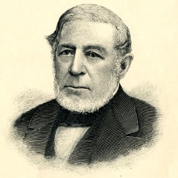
|
| Francis Perot |
In the early wilderness days, water supplies were tainted and unsafe, so most prosperous Quakers had their own little brewery just to avoid typhoid fever. The first American brewery was started by Anthony Morris (the second Philadelphia Mayor) in 1687, in a little brewery on Dock Creek, which became the early Brewerytown of the city, with several dozen brewpubs for sailors and the like. In 1797 there were over a hundred breweries in Philadelphia, and in 1840 there were over three hundred of them. Perot's brewery was prominent for a long time since an early Perot married a daughter of Anthony Morris. Since Philadelphia developed the first and famous city water supply in 1800, beer drinking lost its position as a safe beverage in an unsafe city, and gradually water-drinking became the dominant beverage for the strict and upright. At one time in the early Eighteenth century, gin was cheaper than beer, so even the intemperate multitudes deserted beer for a while, although the effect of the higher alcohol content of gin was apparently fairly dramatic.
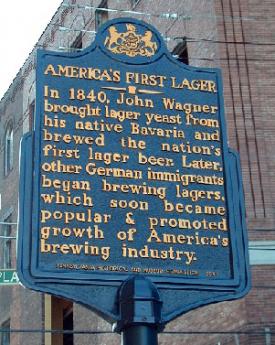
|
| John Wagner Marker |
In 1840 John Wagner imported the yeast for lager beer from Bavaria, at considerable personal risk if he had been caught at it. Prior to 1840, Philadelphia beer was either stout or Porter, a very dark and bitter dose, or else ale, which had the advantage of storing fairly well and thus was popular for sailing vessels and among sailors. The yeast for ale floats to the top and ferments, whereas lager yeast sinks to the bottom of the barrel and requires some refrigeration to slow it down. In all forms of beer, the suds are created by later adding some unfermented beer to the barrel for the purpose of generating carbon dioxide. That's what is going on when you see the bartender in a British pub pulling on a lever to pump it up from the basement. Lager tastes much less beery than other beer and is by far the dominant form of beer in consumption -- a considerable improvement, in the view of most people. But it has to be cooled, and Philadelphia had a system. Brewerytown moved to Kensington, dominating the local scene. It was produced in barrels which were trucked to the east bank of the Schuylkill where ice formed on the surface of the river, stilled by impoundment above the Fairmount Dam. Caves were dug in the banks of the Schuylkill where the barrels full of fermenting beer were hauled to be cooled by the ice for the rest of the process. From there, it was trucked again to bottlers in a general ratio of one brewer for thirty bottlers. More directly, it was trucked to the beer gardens of Spring Garden to Girard Avenue, which gave that area a different sort of reputation as a brewery town. By this time, most of the breweries had moved to the region between 30th and 33rd Streets, near Girard, and most of them still survive, made into condominiums by rehabilitation money. One by one, many sections of downtown Philadelphia acquired a beer environment. A dramatic moment in this process was the advent of the 1876 exposition, which caused many of the Schuylkill fermenting vaults to be acquired by eminent domain. A second momentous change was introduced by the invention of refrigeration, apparently invented in Germany near Berlin, but imported and refined by York and Carrier. Philadelphia was particularly suitable for the importation of coal to fuel the heating of the brew, and the chilling of the fermentation. All of this required large numbers of brewers, bottlers, makers of bottles and inventors of brewing equipment. It took many horses to haul all this material around town, and many teamsters to drive the horses. This was a beer town, until Prohibition.
During the long period of beer ascendency, the advantages of big breweries over small ones were gradually making this a major industry, rather than a local craft. Prohibition completed the destruction of the small craft brewers and brew-pubs. Only 17 of the major brewers survived Prohibition, and then even the big ones went out of business, ending with Schmidt's in 1987, almost exactly three hundred years after the first little one started by that famously convivial Anthony Morris on Dock Street. Evidently, the same competitive disadvantages continue as even Budweiser moves to Brussels, where you would ordinarily expect the wine to be the popular drink. Changing tastes have been cited as the reason for this shift, but differential taxes seem more probable as an explanation. In most industries, you are apt to find that most of the competition takes place in Washington and Harrisburg, rather than the saloons of Main Street or the salons of Madison Avenue. But perhaps not. We hear that little Belgium is about to have a civil war because the Flemish can't get along with the Walloons. And somebody in Portland, Oregon got the idea that beer was trendy, and started up the growing phenomenon of craft brewers, usually flourishing in brewpubs. We are apparently going back where we started in 1687.
REFERENCES
| Philadelphia Beer: A Heady History of Brewing in the Cradle of Liberty: Rich A. Wagner: ISBN: 978-1609494544 | Amazon |
American Chestnut Trees

|
| American Chestnut tree |
RECENTLY, John Wenderoth of the Tyler Arboretum visited the Right Angle Club of Philadelphia, bringing an astounding account of the triumph, near-extinction, and revival of the American Chestnut tree. The Tyler Arboretum, and this man, in particular, is at the center of the movement to rescue the tree, although the modern Johnny Appleseeds of the movement seem to be a Central Pennsylvanian named Bob Leffel, and a geneticist named Charles Burnham. Together, they had the vision and drive to enlist a thousand volunteers to plant seedlings in Pennsylvania; and there are many other volunteer groups in other states within Appalachia. About 45,000 Chestnut hybrids have been planted, surrounded by wire fencing to protect the new trees until they grow too tall for deer to reach the leaves. Here's the story.
In 1904 it was estimated that a fourth of all trees in the Eastern United States were American Chestnuts. The tree typically grew to eighty feet before permanent branches took over, so the shading and tall pillars of tree trunks gave the forest a particular cathedral-like distinctiveness, much celebrated by such authors as James Fennimore Cooper. The wood of the American Chestnut tree is rot-resistant, so it was favored by carpenters, log-cabin builders, and furniture makers. It once was a major source of tannin, for leather tanning. The nuts were edible, but it has been a long time since they were available for much eating. The chestnuts you see roasted by sidewalk vendors are primarily Chinese Chestnuts, which actually come to us from South Korea. The Buckeye, or horse chestnut, produces a pretty and abundant nut but is too bitter for most tastes. For whatever reason, a fungus was first discovered to infect the chestnuts of the Bronx Zoo in 1905, attracting the attention of Teddy Roosevelt and his Progressive naturalist friends, but to little avail. The fungus (Cryptomeria parasitic) enters the tree through cracks in the bark, flourishes in the part of the tree which is above ground, leaving the roots undisturbed. Ordinarily, when this sort of thing happens, the roots send up shoots which keep the tree alive and flourishing. Unfortunately, the abundant deer of this area quickly nipped off the shoots as they appeared, and finally, the trees died. It took only a decade or so for this combination of natural enemies to wipe out the species, and today it is unusual to see lumber from this source. The forests of Chestnuts have been replaced by other trees, mostly oaks. The Chinese chestnut, however, proved to be resistant to the fungus, even though it does not grow to the same height.

|
| Chinese Chestnuts |
After many futile but well-meaning efforts to save the trees by foresters, friends of the American Chestnut tree turned to geneticists. The goal was to transfer the fungus resistance gene from the Chinese Chestnut to a few surviving American Chestnuts. It took six or seven generations of cross-breeding to do it (four generations of seedlings, then crossing the crosses, then weeding out the undesirable offspring), but eventually, the Tyler Arboretum was supplying truckloads of seedlings to the volunteers to plant in likely places. It's going to take many years for the seedlings to grow in sufficient numbers to make an impact on our forests, and eventually on our carpenters, but that effort is underway with gusto. If anyone wants to volunteer to join this effort, there appears to be room for plenty more people to help.
Which is Better: Big Nations or Small Ones?
BIG nations easily gobble up small ones, so small ones band together. As George Washington famously observed, when you are strong the others leave you alone. But other forces make smallness seem attractive, especially if the nation is already uniform in religion, language and culture. Most nations search for an ideal size for both Peace and Prosperity and find they need two different sizes, and have to choose. Both the American Revolution of 1776 and present struggles of the European Union fit a common formula: banding together for military security, then pulling back for greater independence. The American experience of a subsequent Civil War eighty years later suggests the margin for error is narrow.
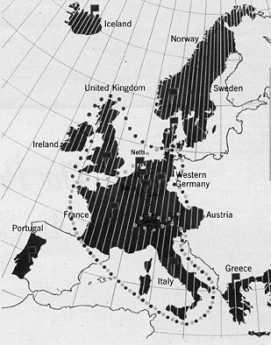
|
| Europe Colonies |
Geography doubtless imposes limits for both peace and prosperity. Some nations have therefore banded together for military reasons then split apart in local quarrels, more or less regularly. The thirteen American colonies had been afraid to confront Britannia alone, but somewhat overconfidently took on that challenge as a confederation of thirteen. At the other extreme, little Rhode Island even refused to send delegates to the Constitutional Convention, for fear the other twelve would want to share its revenues from the coastal road through their state. Similar possessiveness has at least not been reported about the narrow defile through the northern end of the equally small State of Delaware, but one glance at a map is sufficient to expect similar restlessness from the region which for decades protected its secrets of mushroom cultivation. Peace and prosperity: getting bigger discourages predators, but getting smaller offers sole possession. Since the United States grew in jumps through most of its history, it probably learned intangible things from its alternating episodes as too big and then too small. Frederick Jackson Turner's thesis of the frontier as a shaper of culture is fairly similar.
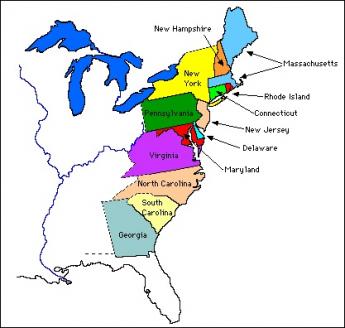
|
| 13 Colonies |
When ideas of Union first gained traction, both the thirteen American colonies and the twenty-five nations of the Eurozone were afraid of war. The American objective was the simple one of military parity with a common enemy. The nations of the European Union had a longer view; a seemingly endless history of bloody wars sustained their conviction that other wars would inevitably follow unless they did something innovative. National unification on the American model would be ideal, but perhaps the habits of cooperation and trade would lead to that. The unexpected decline of the Soviet empire further reduced the threat to European peace. Pride may also have led to over-reaching; twenty-five is comfortably larger than thirteen, which up to that time was the largest nation merger to survive. But twenty-five is smaller and thus more manageable than the present American fifty. To begin the Euro process with monetary union might produce quick benefits from a source too mysterious to produce much public resistance. Nobody could think of a war started by a monetary dispute.
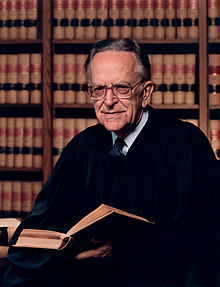
|
| Justice Blackmun |
Of course the Europeans would expect to cope with the difficulties of speaking many languages. The American colonies mostly shared a single language. Even their enemy spoke English. In this particular, the Europeans seem to have underestimated the language-induced difficulties of maintaining a common understanding of what their Constitution meant to people. Indeed in American Judicial disputes about Original Intent, we repeatedly encounter the tenacity of people to believe a document says what they want it to say. Staying within a single English language, the inflammatory evolution of U.S. Supreme Court interpretations often turns on subtle differences in the meaning of simple words, since vigorous legal advocates think they are paid to marshall every argument weak or strong. Penumbras and emanations from the word "Privacy" in Roe v. Wade force our judges to decide whether the inclusion of abortion within a right of privacy is simply too far from common understanding of English, in a double sense. Both in the discovery of a right to privacy within a document which does not use the word and in the inclusion of abortion within that, Justice Blackmun clearly overestimated the capacity of citizens to understand what they did not want to understand. How much more surely would he have overestimated public willingness to grasp his meaning in two-step translations from a foreign language. Since this famous decision is destined to stand or fall, depending on public tolerance for such wordplay, having almost every citizen confidently understanding English is a decided advantage in achieving consensus about its wisdom. It seems almost unnecessary to point out how many European languages are derived from Latin or German, and how seldom such migrations of meaning have sharpened the precision of the originals.
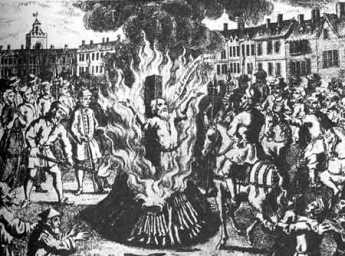
|
| Auto-de-fe |
By contrast with important language confusions, "hatreds between nations" are often mentioned as an obstacle to unification but seem largely bogus. Argot and slang are commonly invented to conceal the opinions of a minority group. Over thousands of years, this purpose of "jiving" a secret code among conspirators has been perfected exquisitely. It's hard to overcome, easy to teach children. But the memory of actual wars really dies out rather quickly, not least because atrocities are so hideous, mankind wants to forget them. I was seventy years old before someone told me I had ancestors burned at the stake. By whom? By someone who has also been dead for four hundred years, not likely to seem threatening. Over the fifty years since the Second World War, I have run into former German and Japanese soldiers; they now seem pretty benign. One American former prisoner of war was forced to stand at attention while his Japanese captor pulled out his gold teeth with pliers; he told this story with a faint smile. It is one of the benevolence of biology that we are born without memories, and a second is the impossibility of remembering the feeling of pain without first dramatizing the experience for future reference. Once actual onlookers stop grinding the grievance ax, it should be possible to get on with devising a European constitution, provided it contains the equivalent of our First Amendment.
From a commentator's perspective, currency matters are difficult to understand and explain. For contrast, the Battle of Normandy is thrilling and awe-inspiring; every death is the death of a hero. But rises in productivity, the risk implications of volatility, even the way the value of bonds goes down while their interest rate rises seem hopelessly confusing to a beginner. Worse still, there exists real uncertainty. We now have currency which has no backing in precious metals and is really just a book entry. That's useful for transactions but certainly less useful as a storehouse of value. Mr. Ron Paul ran for President of the United States challenging the whole Federal Reserve concept, and a possibility must be admitted that he had a grain of truth in his speeches. We trust our bankers to devise a workable system of exchange without gold and silver, and readily admit that Mr. Bernanke knows more than we do. But. The world economy nearly collapsed utterly a few years ago, and you know, Mr. Ron Paul might just have a valid point or two. There has not yet emerged any fit environment for enjoying a monetary Crusade to a World Without War. For striking contrast, go to any Civil War movie and watch those teenaged soldier boys charge up the hill, ready to die for the Union.
| Posted by: Seston | Nov 26, 2011 3:01 AM |
| Posted by: Emily | Nov 23, 2011 11:00 PM |
41 Blogs
Boalsburg
 Eight generations of the Boal family have lived in the house in Boalsburg, where you can see five signatures of Presidents of the United States, and the personal possessions of -- you heard me -- Christopher Columbus.
Eight generations of the Boal family have lived in the house in Boalsburg, where you can see five signatures of Presidents of the United States, and the personal possessions of -- you heard me -- Christopher Columbus.
Ginseng Trading
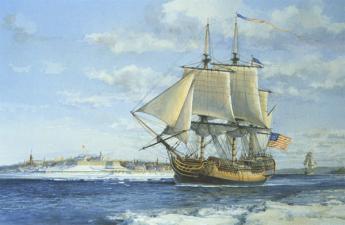 The Chinese love ginseng for its alleged aphrodisiac qualities, so it is not surprising that trade has flourished between China and Philadelphia. What's surprising is that ginseng flourishes in our exurbs, and is mostly exported to China, not from it.
The Chinese love ginseng for its alleged aphrodisiac qualities, so it is not surprising that trade has flourished between China and Philadelphia. What's surprising is that ginseng flourishes in our exurbs, and is mostly exported to China, not from it.
Children Playing With Matches

Tammany: Philadelphia's Gift to New York
 All the bad things they say about Tammany Hall are somewhat true. William Penn, George Washington, and Aaron Burr can be happy that Tammany Hall is now mostly a New York tradition, its Philadelphia origins long forgotten.
All the bad things they say about Tammany Hall are somewhat true. William Penn, George Washington, and Aaron Burr can be happy that Tammany Hall is now mostly a New York tradition, its Philadelphia origins long forgotten.
Bonds--Do They Have A Future?
 It's increasingly hard to imagine why investors buy bonds because it's increasingly difficult to imagine an end to inflation.
It's increasingly hard to imagine why investors buy bonds because it's increasingly difficult to imagine an end to inflation.
Relocation
 Moving your place of residence has many influences, but property taxes seem to have the biggest influence on business executives decided to move. By contrast, property prices have the biggest influence on the middle class.
Moving your place of residence has many influences, but property taxes seem to have the biggest influence on business executives decided to move. By contrast, property prices have the biggest influence on the middle class.
Weather Man
 The weather is a big business.
The weather is a big business.
Poor Richard's Wealth
 Ben Franklin called himself Poor Richard, and he also was invited to visit five kings. Was he rich, or poor?
Ben Franklin called himself Poor Richard, and he also was invited to visit five kings. Was he rich, or poor?
Ben's Little Legacy
 The Constitution provides that revenue bills must originate in the House of Representatives. This provision is regularly circumvented, and Congressmen have long forgotten they should tip their caps to Ben Franklin.
The Constitution provides that revenue bills must originate in the House of Representatives. This provision is regularly circumvented, and Congressmen have long forgotten they should tip their caps to Ben Franklin.
Two Friends Create the Articles of Confederation
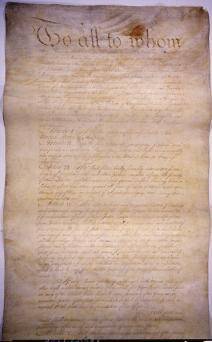 John Dickinson and Robert Morris were good friends who pushed the Articles of Confederation through to ratification. Both of them had been active critics of Great Britain's treatment of the colonies, but both hesitated to sign the Declaration, and both later relented and fought for Independence. Dickinson's final position is less clear, but it was Morris who first saw the weakness of the Articles, and pressed on for their replacement by the Constitution.
John Dickinson and Robert Morris were good friends who pushed the Articles of Confederation through to ratification. Both of them had been active critics of Great Britain's treatment of the colonies, but both hesitated to sign the Declaration, and both later relented and fought for Independence. Dickinson's final position is less clear, but it was Morris who first saw the weakness of the Articles, and pressed on for their replacement by the Constitution.
Penman of the Constitution
 The courts have spent a fair amount of time arguing about the meaning of phrases, words and even punctuation in the Constitution. That's what constitutional lawyers think they are paid to do. It seems possible the document survived for centuries, only because its final wording was left to a lawyer who took words seriously, using as few as possible.
The courts have spent a fair amount of time arguing about the meaning of phrases, words and even punctuation in the Constitution. That's what constitutional lawyers think they are paid to do. It seems possible the document survived for centuries, only because its final wording was left to a lawyer who took words seriously, using as few as possible.
What Is the Purpose of a National Constitution?
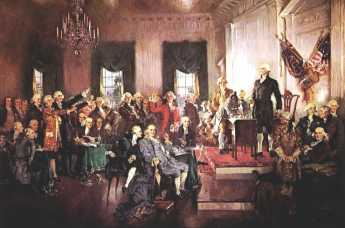 The primary purpose of any Constitution is of course survival. Usually, but not invariably, that means avoiding war with a neighbor which will surely beat you. Having stated what ought to be obvious, the framers of a Constitution need to be careful of the reasons which originally caused the new state to be formed, and also need to avoid provisions which would cause trouble by inciting some different type of governance. These features can be enumerated, but are easily forgotten.
The primary purpose of any Constitution is of course survival. Usually, but not invariably, that means avoiding war with a neighbor which will surely beat you. Having stated what ought to be obvious, the framers of a Constitution need to be careful of the reasons which originally caused the new state to be formed, and also need to avoid provisions which would cause trouble by inciting some different type of governance. These features can be enumerated, but are easily forgotten.
Advantages and Disadvantages of Being a Small Country
 Remaining a small country has many merits, but one big demerit. Your neighbors are tempted to swallow you up.
Remaining a small country has many merits, but one big demerit. Your neighbors are tempted to swallow you up.
Political Parties, Absent and Unmentionable
 Our Constitution is much praised for exquisitely balancing power between the three branches of government. It would even be an achievement to require two centuries to find a way to unbalance them.
Our Constitution is much praised for exquisitely balancing power between the three branches of government. It would even be an achievement to require two centuries to find a way to unbalance them.
Human Rights
 Human Rights is a popular term, but not a very clear one.
Human Rights is a popular term, but not a very clear one.
Obamacare's Constitutionality
 Obamacare's constitutionality was argued before the U.S. Supreme Court in late March, 2012.
Obamacare's constitutionality was argued before the U.S. Supreme Court in late March, 2012.
How Could We Improve State Legislatures?
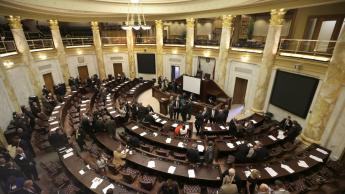 If state legislatures are as bad as their reputation, we ought to be asking questions. Like, how did they get that reputation, and what can improve it?
If state legislatures are as bad as their reputation, we ought to be asking questions. Like, how did they get that reputation, and what can improve it?
Sanctity of Contracts
 Article I of the Constitution, states in section10 that "No state shall......pass any law.....impairing the obligation of contracts, or grant any title of nobility." While the Constitution does not precisely say the Congress may not do so, or the President might not, it is definitely omitted from the list of limited federal powers. And it is the enduring expectation of the citizenry that the federal government is no more encouraged to impair the sanctity of contracts than to grant titles of nobility.
Article I of the Constitution, states in section10 that "No state shall......pass any law.....impairing the obligation of contracts, or grant any title of nobility." While the Constitution does not precisely say the Congress may not do so, or the President might not, it is definitely omitted from the list of limited federal powers. And it is the enduring expectation of the citizenry that the federal government is no more encouraged to impair the sanctity of contracts than to grant titles of nobility.
Beginning Social Security Benefits
 All your life you can look forward to the day Social Security starts paying you. But while some folks need to start benefits before age 65, others should delay it for ten years or more.
All your life you can look forward to the day Social Security starts paying you. But while some folks need to start benefits before age 65, others should delay it for ten years or more.
A Time to Read Books
 Retirement is a good time to read all those books you meant to read. But certain things stand in the way.
Retirement is a good time to read all those books you meant to read. But certain things stand in the way.
Void for Vagueness
 Ignorance of the law is no excuse, but what about a law that is deliberately vague?
Ignorance of the law is no excuse, but what about a law that is deliberately vague?
Roberts the Second
 Chief Justice John Roberts seems to be intent on radical changes to the Supreme Court, made in a conservative way.
Chief Justice John Roberts seems to be intent on radical changes to the Supreme Court, made in a conservative way.
Statement of Accounts, March 1785
 At the conclusion of Robert Morris' term of office as Financier, he did an unusual thing by submitting a complete accounting of his term. As things turned out, it was a good thing he did so.
At the conclusion of Robert Morris' term of office as Financier, he did an unusual thing by submitting a complete accounting of his term. As things turned out, it was a good thing he did so.
The Revolution is Over, Every Man for Himself
 Although his personal wealth in modern equivalents approached that of Bill Gates today, Robert Morris abruptly quit his business after a debate in the Legislature, just to show he had no personal bias. It ruined him, but John Hancock and George Washington did much the same thing. Ben Franklin agreed, but was shrewder about it.
Although his personal wealth in modern equivalents approached that of Bill Gates today, Robert Morris abruptly quit his business after a debate in the Legislature, just to show he had no personal bias. It ruined him, but John Hancock and George Washington did much the same thing. Ben Franklin agreed, but was shrewder about it.
Morris Upended by a Nobody
 Adjusting to winning the Revolutionary War was almost as painful as losing it would have been. Especially for Robert Morris.
Adjusting to winning the Revolutionary War was almost as painful as losing it would have been. Especially for Robert Morris.
Morris Defends Banks From the Bank-Haters
 To understand why lots of people today reflexly hate bankers, it's useful to review the courtroom defense of the man who invented America's first bank, facing ruin if he proved unconvincing.
To understand why lots of people today reflexly hate bankers, it's useful to review the courtroom defense of the man who invented America's first bank, facing ruin if he proved unconvincing.
Morris at the Constitutional Convention
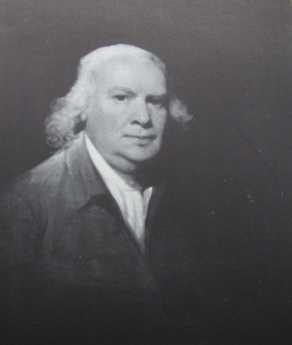 Robert Morris knew that credit is only extended to someone with a reputation for paying his bills.
Robert Morris knew that credit is only extended to someone with a reputation for paying his bills.
Fighting About Taxes So Soon?
 Americans don't like to pay taxes. Never have. Never will.
Americans don't like to pay taxes. Never have. Never will.
The Origin of States Rights, a Rumination
The clamor for States Rights probably began with Virginia's claims for western territories.
Robert Morris, Land Speculator
 Robert Morris devoted considerable thought to land speculation, long before he got involved in it.
Robert Morris devoted considerable thought to land speculation, long before he got involved in it.
Chief Justice John Marshall Enters (Kettledrums and Crashing Cymbals)
 John Marshall is known for some ground-breaking decisions, but many of his most influential pronouncements were just side comments with no force of precedent, obiter dicta , as they are called in legal circles. Marshall came to realize that if he told the legal profession what he firmly believed, no lawyer would think it was wise to conflict with the views held by the final level of appeal.
John Marshall is known for some ground-breaking decisions, but many of his most influential pronouncements were just side comments with no force of precedent, obiter dicta , as they are called in legal circles. Marshall came to realize that if he told the legal profession what he firmly believed, no lawyer would think it was wise to conflict with the views held by the final level of appeal.
Lazaretto
 The oldest quarantine station in the Western hemisphere is located next to the airport on Tinicum Island, quite easily visited by car. It dates from Philadelphia's famous Yellow Fever epidemics of 1793.
The oldest quarantine station in the Western hemisphere is located next to the airport on Tinicum Island, quite easily visited by car. It dates from Philadelphia's famous Yellow Fever epidemics of 1793.
Muddle: The War of 1812
 The War of 1812 was a muddle, made worse by biased historians like Henry Adams, and politics in upheaval. Howard Calloway may not have the story precisely right, but at least he has a plausible explanation for the episode.
The War of 1812 was a muddle, made worse by biased historians like Henry Adams, and politics in upheaval. Howard Calloway may not have the story precisely right, but at least he has a plausible explanation for the episode.
Evo-Devo
 The Franklin Institute has been making awards for scientific achievement for 188 years, long before the Nobel Prize was invented. The seats are all reserved before the meeting notices are even mailed.
The Franklin Institute has been making awards for scientific achievement for 188 years, long before the Nobel Prize was invented. The seats are all reserved before the meeting notices are even mailed.
Running the Opera
 It costs a million dollars to put on one opera in Philadelphia, and that's a bargain compared with other cities.
It costs a million dollars to put on one opera in Philadelphia, and that's a bargain compared with other cities.
Bones in Duffy's Cut
 They are digging up bones in Malvern, finding evidence of murder. Some people are uneasy about perpetuating ethnic strife.
They are digging up bones in Malvern, finding evidence of murder. Some people are uneasy about perpetuating ethnic strife.
Breaking the Buck
 Several years after the financial crash of 2008, the question is raised whether money-markets might have played an unsuspected role. If so, what should be done about it?
Several years after the financial crash of 2008, the question is raised whether money-markets might have played an unsuspected role. If so, what should be done about it?
Conowingo
 After ancient disputes between William Penn and Lord Baltimore, the mouth of the Susquehanna into the Chesapeake Bay is located in Maryland. However, the Philadelphia Electric Company got its power from the Conowingo Dam, and Philadelphia bird watchers by the hundreds go there to watch thousands of birds, attracted by millions of fish. But when the buzzers sound and the red lights flash, run for higher ground.
After ancient disputes between William Penn and Lord Baltimore, the mouth of the Susquehanna into the Chesapeake Bay is located in Maryland. However, the Philadelphia Electric Company got its power from the Conowingo Dam, and Philadelphia bird watchers by the hundreds go there to watch thousands of birds, attracted by millions of fish. But when the buzzers sound and the red lights flash, run for higher ground.
One Big Brewerytown
 It's hard to realize that Philadelphia was the center of beer production in America until fairly recently. It's been argued it is still the center of consumption.
It's hard to realize that Philadelphia was the center of beer production in America until fairly recently. It's been argued it is still the center of consumption.
American Chestnut Trees
 Scarcely a century ago, American Chestnut trees were a quarter of all trees in America. Now, they are almost all gone, but a thousand volunteers are trying to rescue them.
Scarcely a century ago, American Chestnut trees were a quarter of all trees in America. Now, they are almost all gone, but a thousand volunteers are trying to rescue them.